HealthCare
MIDDLE EAST & AFRICA

DR. KEN MUMA
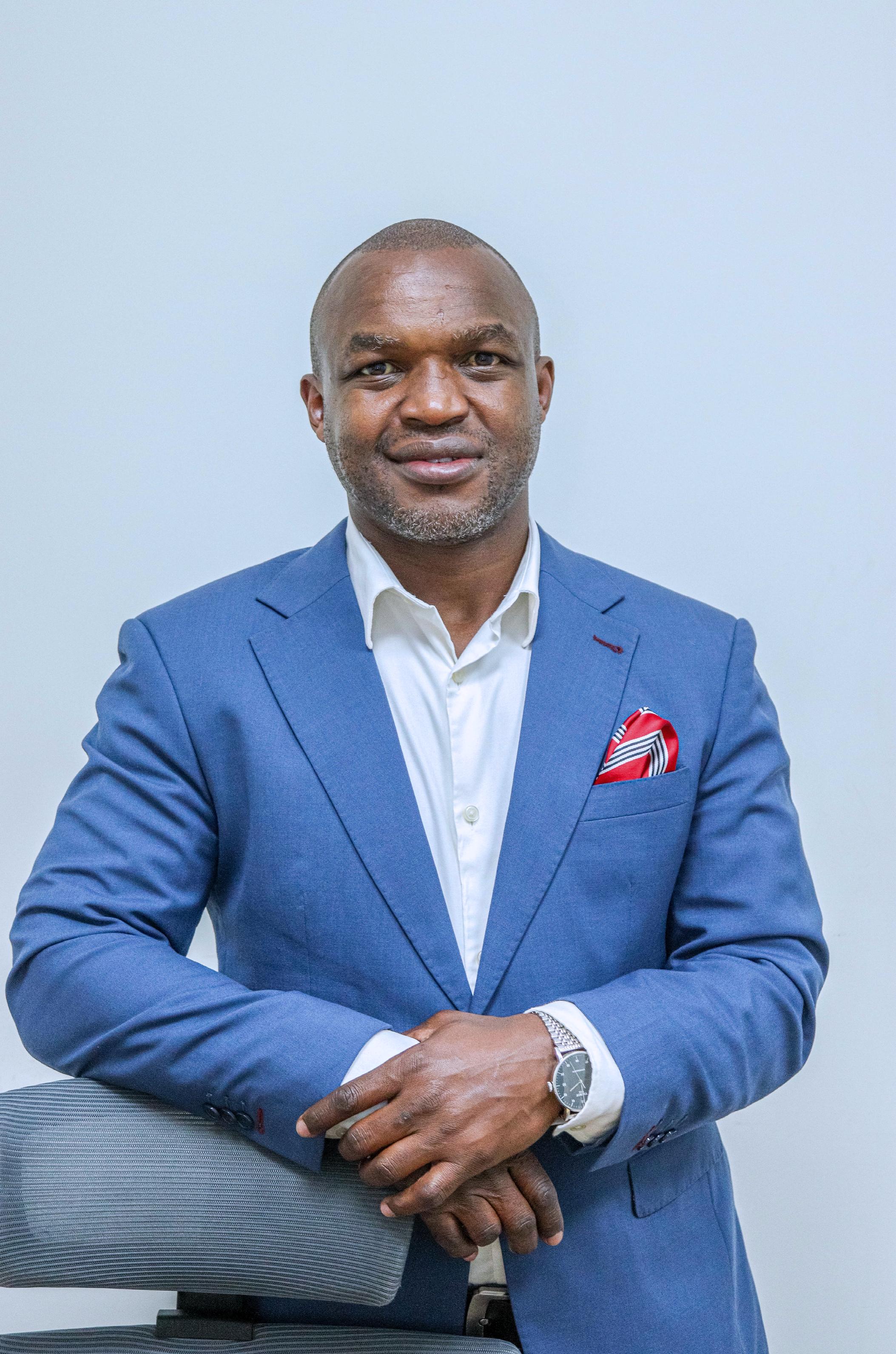



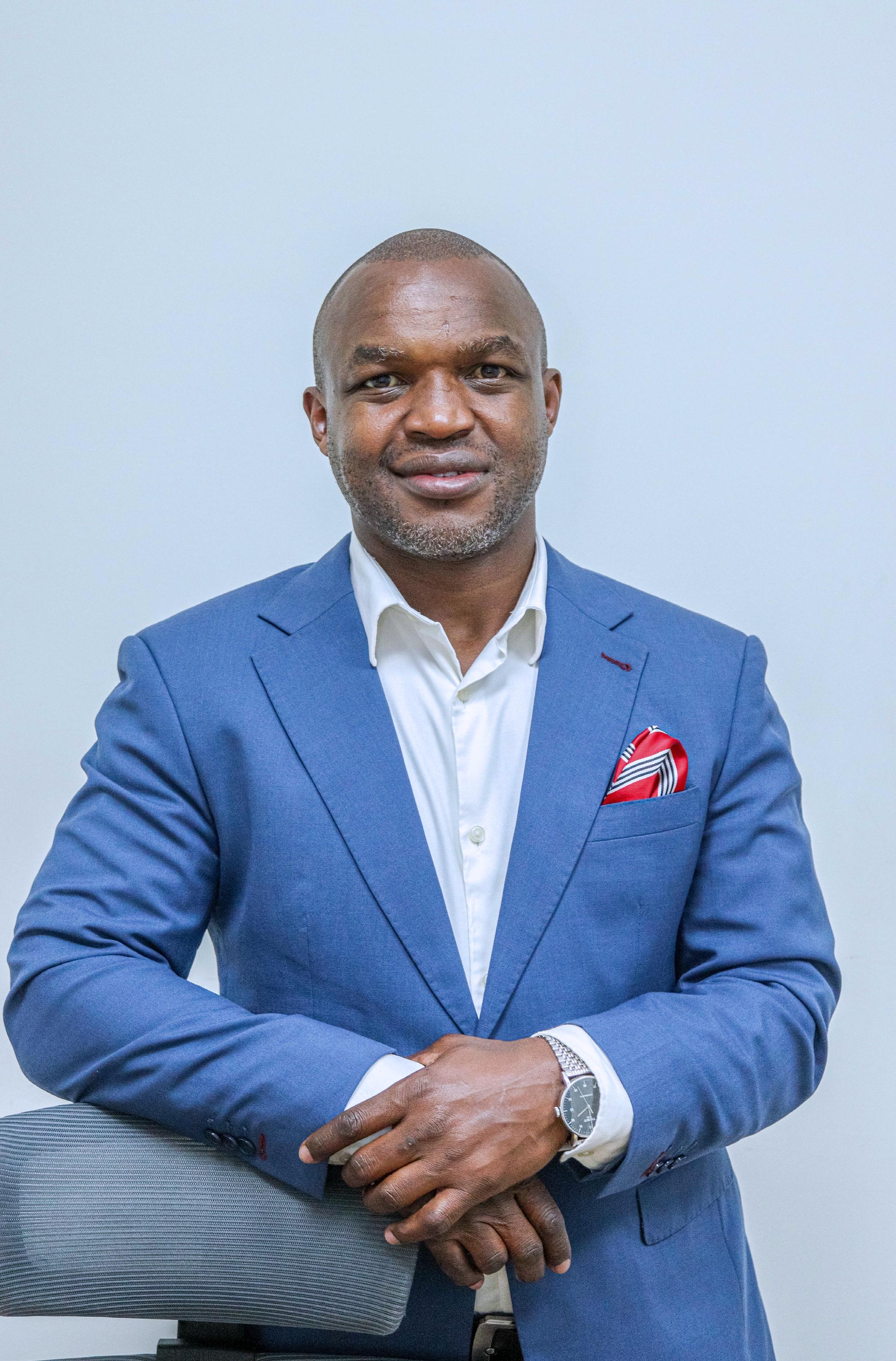
Chief Executive Officer of AAR Hospital speaks on revolutionizing patient care through a customer-centered approach that leverages innovation
FIND: Taking the fight against cervical cancer to its doorstep

REMEDIAL HEALTH: Digitizing pharmaceutical supply chains
DR. JOAN RUGURU
KIMANI: Medical Intern and winner of Top 35 Under 35 Youth of the Year Award in Health Services
COUNTRY FOCUS : United Arab Emirates
DISEASE FOCUS: Chronic Kidney Disease
NO.1 HEALTHCARE & PHARMA INDUSTRY
MAGAZINE
WWW.HEALTHCAREMEA.COM YEAR 2 | ISSUE NO. 6 MAY/JUN 2023
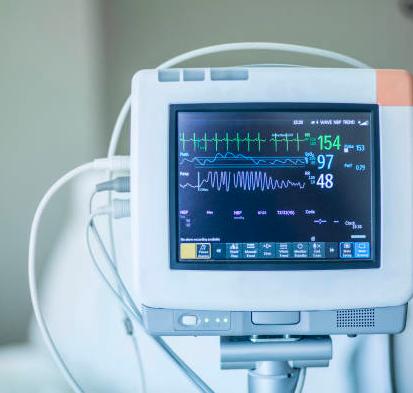


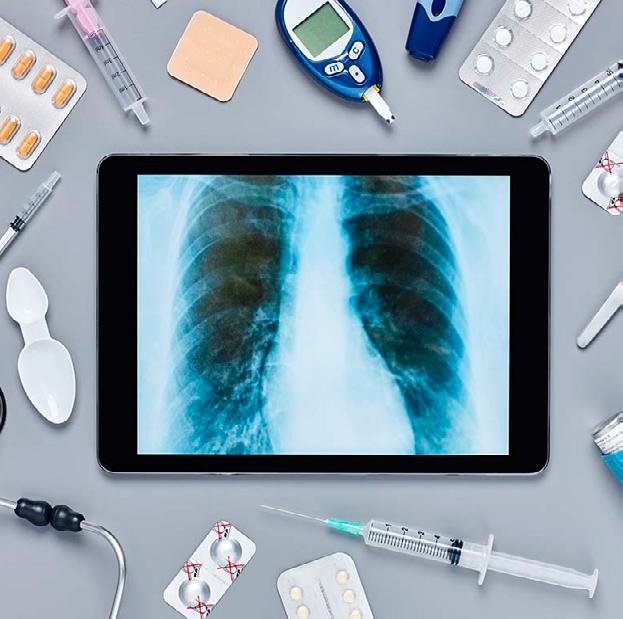


• Medical equipment, machines and monitors • Surgical and lab equipment • In-vitro diagnostics tools • Patient Monitoring, Mobility & Support solutions • Single use devices such as syringes, catheters • Implantable devices • Imaging devices such as ultrasound and scanners • Automation and software solutions • Personal protective equipment WHAT’S ON SHOW? www.africahealthexpo.com Expo Devices Medical Africa A SPECIAL PAVILION AT DISCOVER GLOBAL & REGIONAL SUPPLIERS & MANUFACTURERS OF MEDICAL DEVICES Visa Oshwal Centre, Nairobi, Kenya OCTOBER 5-7, 2023 +254 725 343932 info@fwafrica.net
AFRICA
BUSINESS SUMMIT
Co-located with:
The Africa Business Summit is the groundbreaking conference and exhibition that brings together the key decision makers to define the future of business innovation, strategic leadership and the transformation of Africa, as we approach 2030 and beyond.


The program at the 3-day Summit will comprise of high-level keynote speeches and panel discussions plus sponsored industry and country-focused sessions. It will also feature fireside chats with influential people and change makers who are making waves – and inspiring the next generation of leaders in Africa

www.africabusinesssummit.biz


12-14, 2024 | Nairobi, Kenya
KEY
Digitizing Africa Strategic Leadership in Africa Connecting & Trading In Africa Healthier Africa Industralising Africa Investing In Africa Sustainable Africa Powering Africa Feeding Africa
JUNE
INCORPORATING:
AGENDA
* *
SCAN ME
The Africa CEO & Leadership Forum

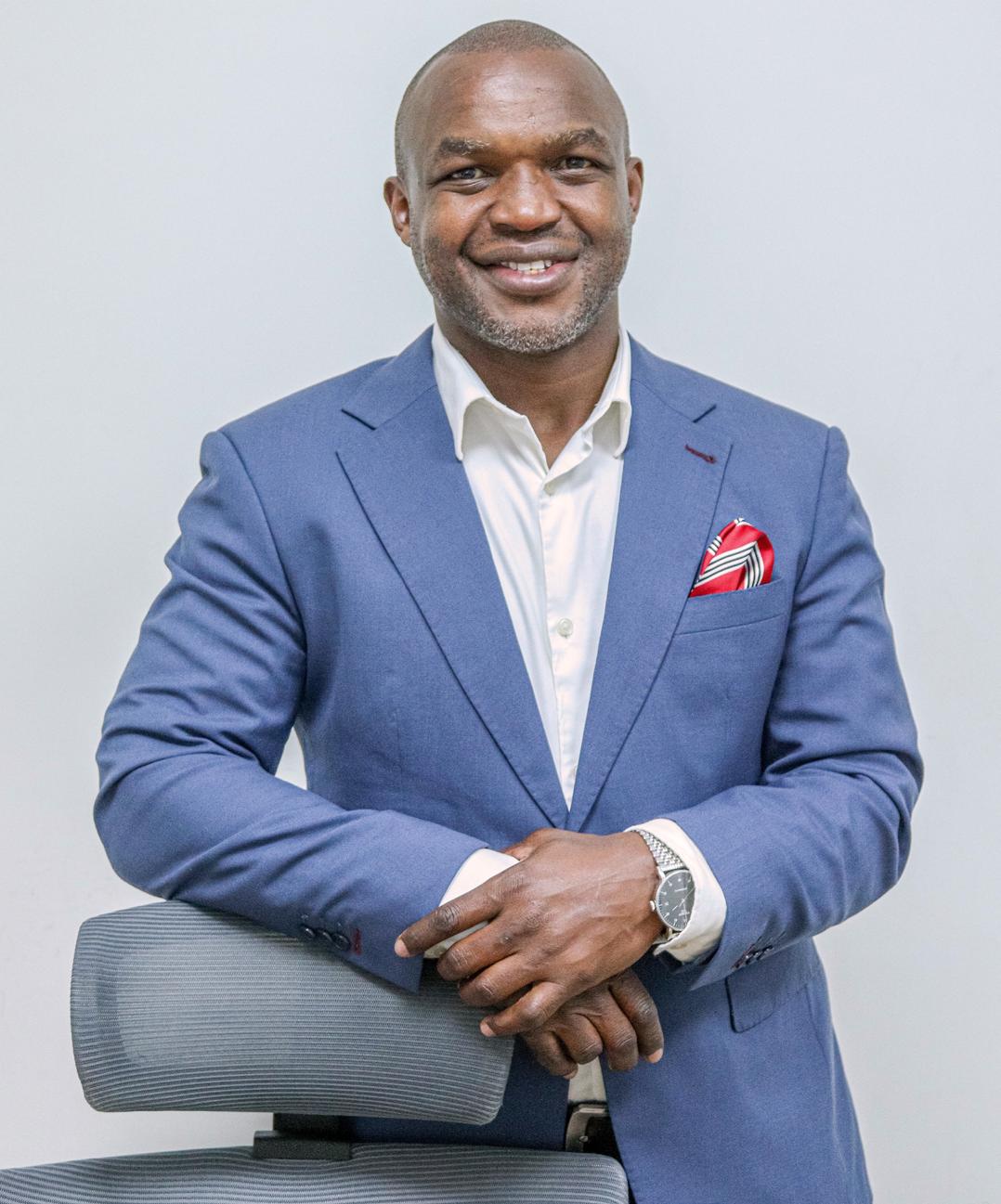

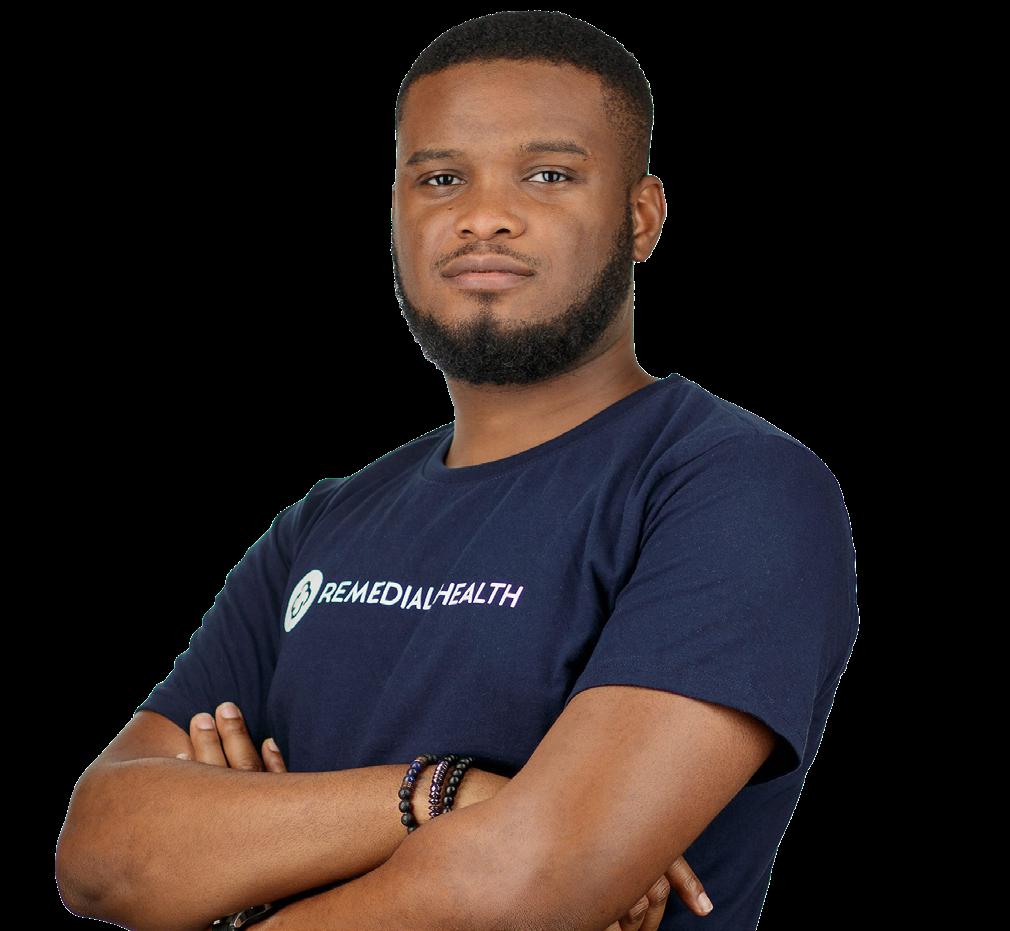
2 HEALTHCAREMEA.COM MAY/JUN 2023 | HEALTHCARE MIDDLE EAST & AFRICA Contents YEAR 2 | ISSUE NO. 6 MAY/JUN 2023 COMPANY FEATURE: AAR HOSPITAL 22 32 Revolutionizing patient care through a customer-centered approach that leverages innovation COMPANY FEATURE: REMEDIAL HEALTH 6 Editorial 8 News Updates 18 Appointments Updates 71 Medical Devices & Innovations IN EVERY ISSUE Digitizing the pharmaceutical supply chain
Hospital
DR. KEN MUMA - Chief Executive Officer, AAR
EXECUTIVE INTERVIEW: DR. JOAN RUGURU KIMANI

Medical Intern and winner of Top 35 Under 35 Youth of the Year Award in Health Services

COUNTRY FOCUS: UNITED ARAB EMIRATES
Middle Eastern country leverages a robust economy and reliable healthcare systems for a thriving medical tourism industry

NGO FOCUS : FIND 44
Taking the fight against cervical cancer to its doorstep
62 the rising burden of CKD in Africa
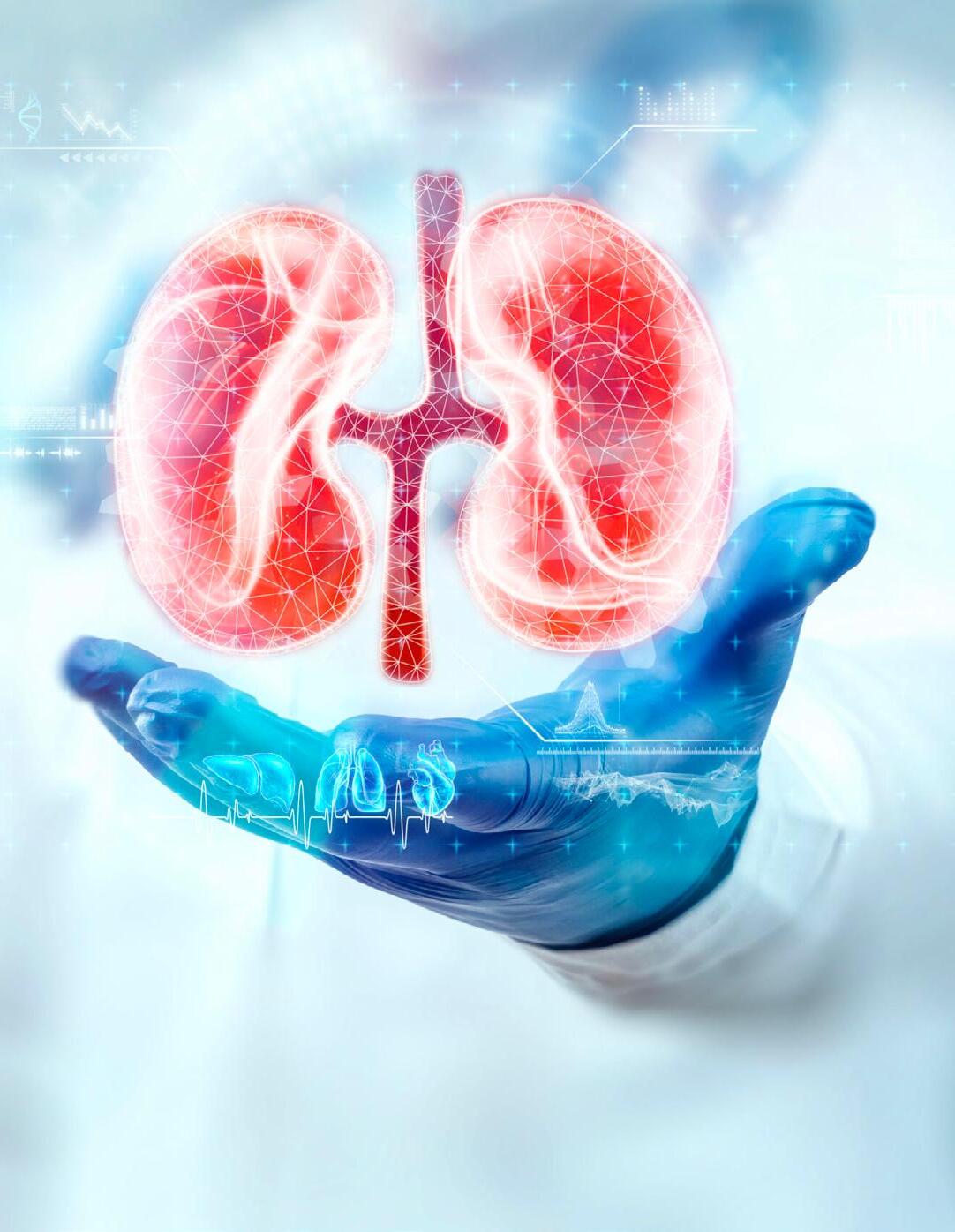
HEALTHCAREMEA.COM MAY/JUN 2023 | HEALTHCARE MIDDLE EAST & AFRICA 3
38
52
A HAPPY BREAK-UP!
3 dimensional dummy, 27-hour surgery, multidisciplinary medical team and an army of healthcare professionals!


Presenting from Cameroon when they were 9 months old, the conjoined twins, Elizabeth and Mary, were discharged after they got healthy again following 7-month treatment in Turkey!
Being born in July of last year in Cameroon, the Siamese twins Elizabeth and Mary were joined at the hip. They had shared numerous aspects of the body system along with physical body parts. Ranging from the spinal cord and a part of the spine to the urinary tract, digestive tract, urogenital systems and neurovascular structure… Following a tremendously comprehensive search, the conjoined twins were brought to Acıbadem Altunizade Hospital from Cameroon when they were 9 months old. Physicians of numerous departments, an army of healthcare professionals, and numerous diagnoses made in 7 months and finally the surgery and postoperative treatment; now, these cute twins are living as two physically independent babies. The separation surgery that lasted for 27 hours was successful. Now, they are 16 months old and they are happy to have their own bodies before they are discharged.
Caroline and Richard Akwe, a couple married for 3 years living in Cameroon, were unbelievably eager to hug their twins. Caroline Akwe, 26, had pregnancy supervision visits regularly and everything was seemingly alright. When the calendar hit July 6th, 2020, the twins were given birth with Caesarean section on term, but with a much unexpected surprise! Twins were joined at their hips... When
the mother completely recovered from anesthesia, nurses were not pretty willing to meet the twins with their mother. They were experiencing hard times to answer the mother’s questions where words fail, only their eyes could not be hiding how confused they were. Feeling grateful that their babies were alive, the young parents were still standing sturdy.
I HAD DIFFICULTY IN BREASTFEEDING AS THEY WERE CONJOINED
28 years old father Richard Akwe says “Believing that they were getting hurt, as they could not be moving comfortable, we were terribly upset. Besides, we were feeling very sorry for their cry while my wife was trying to nurse them one by one when they were hungry, but they were our gifts and we, therefore, devoted ourselves for their best care”, while the mom Caroline Akwe adds “I nursed my conjoined babies for one year despite all challenges. We had never given up our hope that they would be separated in a healthy manner. And our dream has come true through extraordinary efforts and success of Turkish doctors”.
MOBILIZATION WAS ORDERED!
Physicians of numerous departments, ranging from urology and intensive care unit to radiology, physical medicine and rehabilitation and cardiovascular surgery, and an army of healthcare professionals have campaigned under supervision of Professor of Pediatric Surgery Burak Tander, Professor of Pediatric Neurosurgery Memet Özek, Professor
of Aesthetic, Plastic and Reconstructive Surgery Hakan Ağır, Associate Professor of Anesthesiology Serpil Ustalar and Professor of Pediatric Intensive Care Agop Çıtak – all from Acıbadem Altunizade Hospital – to separate the conjoined twins. The multidisciplinary treatment has lasted for 7 months.
LEFT THE OPERATING THEATER WITH THEIR OWN BODIES FOLLOWING 27-HOUR SURGERY!
The twins had opened eyes to the morning of a very big and critical day, when the calendar hit August 12th, 2021. They were placed on the surgical table to separate their fused bodies. Starting at 08:00 a.m., the surgery has lasted for 27 hours. After such a critical surgery was successfully completed, Elizabeth and Mary were, for the first time in their life, lying on different beds at the intensive care unit on August 13th, 2021. They woke up into a totally new life! They had a conjoined 1st year birthday, but they were reborn when they were 13 months old! Since they were fused at their hips, they had never seen the face of each other. It was not a surprise to see them how confused with their separated bodies, but they gradually started enjoying the comfort of having an own body; their happiness was reflected by their shiny eyes and kittlish body language, as they need some time to express verbally what they actually feel.
THEY LOOKED FOR EACH OTHER AFTER BEING SEPARATED
Falling short of words to express the
4 HEALTHCAREMEA.COM MAY/JUN 2023 | HEALTHCARE MIDDLE EAST & AFRICA
happiness they felt when they say their babies separated following a long and critical surgery and stating that they felt like at home in Acıbadem Altunizade Hospital, where they found the remedy they were desperately seeking for, the Akwes say “Seeing them moving freely in their beds in their own rooms, we were sitting on the top of the world. Since Elizabeth and Mary had been conjoined for 13 months, they were constantly crying while looking for each other. Following their stay at the intensive care unit, Elizabeth has constantly kept her tiny hands on Mary till the morning of the evening that she has re-united Mary for the first time. We owe this unbelievable happiness to the confidence instilled by physicians, nurses, management and all other personnel, who were extremely proficient, and their warm behaviors that had also boosted our mood. Words actually fail to express our happiness. Many citizens are waiting impatiently to hear from and see us in our home country and it is exceptionally pleasing to fly back with a happy ending into a new and a healthy beginning.”
WHAT DID THEY DO? HOW DID THEY FEEL?
The road to this ‘most lovely separation’ was paved by rigorous and careful efforts of numerous physicians from many departments, ranging from pediatric neurosurgery to plastic surgery, pediatric surgery, radiology, urology, anesthesiology, cardiovascular surgery and intensive care team, and a gigantic army of healthcare professionals.
Professor of Pediatric Neurosurgery

Memet Özek says “We, the neurosurgery team, started the separation surgery. Since they shared the spinal cord, myelomeningocele, spinal membranes and sacrococcygeal bone, we separated such structures and thus, completed the surgical procedures that are related to our specialty. Even positioning the patient on the surgical table is a detail. Here, we have two fused children and the ideal position of one child is the one that complicates surgery of the other one very substantially! Due to the fusion, we had performed the surgery in a very extraordinary position, may be for the first time in our life, because you cannot position the conjoined twins on the surgical table as you wish and even this fact makes the surgery very distinctive and complex.
We are so happy to perform this surgery successfully. But it is also important not to ignore efforts of pediatric physiotherapy team. The team visited them three times a day and thus, these children are recovered regarding movement and gait”, while Professor of Pediatric Surgery Burak Tander adds: “The spinal cord, urinary tracts, rectum and some blood vessels were shared. The rectum was opening to a joint anus. The muscle complex that was regulating the defecation was also conjoined and it was one of the most significant challenges. Colostomy was performed to divide it into two parts. One of the twins did not have a vagina, while other’s vagina was also problematic. A pouch was created during the surgery to construct a vagina in the future. None of them had any uterus or it was extremely underdeveloped. Their digestive and urinary systems, genital system and neurovascular systems were joined. All members of the team reviewed the three-dimensional dummy, which was ordered to perform a flawless separation surgery. Mary was the first to leave the operating theater followed by Elizabeth. It was an incredibly emotional moment for the team, when they saw each other for the first time.”
Professor of Aesthetic, Plastic and Reconstructive Surgery Hakan Ağır
“We carried out procedures to liberate skin, subcutaneous tissues and muscles before the separation surgery of the conjoined twins. We placed tissue expanders in the first phase of the separation surgery at body parts, where the conjoined twins would be separated. It was a preparatory process and the first phase. In the second phase, we had undertaken the role of closing the areas operated on by pediatric surgery and pediatric neurosurgery teams. We also acted as a team to overcome postoperative wound healing problems with general intensive care and infectious diseases teams and with a maximized the
nursing care”.
Associate Professor of Anesthesiology Serpil Ustalar
Özgen adds: “Our role, as the anesthesiology team, was to have these babies sleep safely throughout the surgery to help our surgeons work comfortable and to recover them again safely. We prepared all equipment in two colors to avoid confusion between two babies before we started the surgery; the team was divided into the ‘Elizabeth team’ and the ‘Mary team’. In fact, 27 hours have elapsed somewhat within an hour for us, because everybody has used all technological means, proceeded very professionally and strongly focused on its role. The babies are, now, very well and they are growing very quickly. I am so happy to be a member of the team that has successfully separated them; it is worthless to see the babies so healthy in their own bodies and singing songs and dancing on their own way.”
Professor of Pediatric Intensive Care Agop Çıtak summarized the intensive care period as follows: “The surgical separation of the twins is a long, complicated and challenging work. This aspect of the surgery dictated adaptation of postoperative care, monitoring and treatment of the babies at the pediatric intensive care unit accordingly. Potential problems were predicted in advance and all preparations were based on such estimations, including rooms, beds, the nurses who would take care of them, medications, blood products and devices. When they were postoperatively admitted to the intensive care unit, all vital signs of twins were closely monitored. A long surgery may pose a risk of infection and we, therefore, focused our attention very strictly on infection. We had maintained proper communication with the surgical team. They were recovered from sedation and weaned from the respiratory device, as there was no problem in their vital signs. After the twins were monitored at pediatric intensive care unit for further couple of days, they were discharged to their room at the inpatient clinic”
For more Information contact us: apply@acibadem.com
HEALTHCAREMEA.COM MAY/JUN 2023 | HEALTHCARE MIDDLE EAST & AFRICA 5
+90 216 544 4664
HealthCare
MIDDLE EAST & AFRICA

Year 2 | Issue3 | No.6
FOUNDER & PUBLISHER
Francis Juma
SENIOR EDITOR
Benjamin Opuko
EDITORS
Lorraine A. Wangui | Jackie Mbithe |
Peter Ngige
BUSINESS DEVELOPMENT DIRECTOR
Virginia Nyoro
BUSINESS DEVELOPMENT ASSOCIATE
Elly Okutoyi
HEAD OF DESIGN
Clare Ngode
DESIGN
Yvonne Njambi
CINEMATOGRAPHER
Newton Lemein
ACCOUNTS
Jonah Sambai
PUBLISHED
BY:
FW Africa
P.O. Box 1874-00621, Nairobi Kenya
Tel: +254 20 8155022, +254725 343932
Email: info@fwafrica.net
Company Website: www.fwafrica.net


In the latest edition of Healthcare Middle East and Africa (HCMEA) magazine, we explore the remarkable advancements, challenges, and progress in the healthcare sector across Africa and the Middle East. From Kenya to the United Arab Emirates, from innovative hospitals to groundbreaking startups, this issue showcases the transformative power of a customer-centered approach, cuttingedge technologies, and collaborative efforts.
One of the highlights of this edition is AAR Hospital, which has revolutionized patient care in Kenya by prioritizing dignity, care, and holistic wellness. With a patient-centered philosophy and a commitment to innovation, AAR Hospital, under the leadership of CEO Dr. Ken Muma, has set new benchmarks for excellence in healthcare.
We also delve into the fight against cervical cancer with FIND, a global force dedicated to creating affordable and accessible diagnostic tools. Through collaborations and partnerships, FIND ensures the availability of diagnostic tests for poverty-related diseases, particularly focusing on high-performance HPV testing to combat cervical cancer.
In an exclusive interview, Samuel Okwuada, CEO of Remedial Health, shares his vision for digitizing the pharmaceutical supply chain in Africa. This YC-backed startup aims to bridge critical gaps in healthcare delivery using technology and evidence-based data, making a meaningful impact on communities.
Additionally, we focus on the United Arab Emirates, a country leveraging its robust GDP and thriving medical tourism to build reliable healthcare systems. The UAE has emerged as a dynamic federation, with a strong emphasis on collaboration among its seven emirates to create a prosperous nation.
Lastly, we shed light on the rising burden of Chronic Kidney Disease (CKD) in Africa, unmasking the silent pandemic. With a focus on prevention, improved kidney care, and policy recommendations, HCMEA highlights effective management strategies to alleviate the burden of this disease.
HealthCare Africa (ISSN 2307-3535) is published 6 times a year by FW Africa. Reproduction of the whole or any part of the contents without written permission from the editor is prohibited. All information is published in good faith. While care is taken to prevent inaccuracies, the publishers accept no liability for any errors or omissions or for the consequences of any action taken on the basis of information published.
The magazine features Dr. Joan Ruguru Kimani, a remarkable young medic intern at the Karen Hospital in Kenya, who has made headlines for her exceptional work in child health and parenting. Dr. Kimani's Exciting Parenting blog has had a significant impact on first-time parents, earning her recognition as one of Forbes Africa's top 30 under 30 individuals.
The HCMEA Issue 6 Magazine provides a comprehensive overview of the healthcare landscape in Africa and the Middle East, showcasing innovative approaches, challenges, and remarkable progress in the pursuit of better healthcare for all. Join us as we explore the inspiring stories, game-changing initiatives, and transformative visions that are shaping the future of healthcare in these regions.
Benjamin Opuko
Senior Editor - HCMEA, FW Africa
6 HEALTHCAREMEA.COM MAY/JUN 2023 | HEALTHCARE MIDDLE EAST & AFRICA
EDITORIAL WWW.FOODSAFETYAFRICA.NET CEO BUSINESS AFRICA WWW.HEALTHCAREMEA.COM WWW.SUSTAINABLEPACKAGINGAFRICA.COM WWW.CEOBUSINESSAFRICA.COM OUR PUBLICATIONS MILLING MIDDLE EAST & AFRICA AFRICA Packag ng SUSTAINABLE WWW.FOODBUSINESSAFRICA.COM WWW.MILLINGMEA.COM Food Africa Business HealthCare MIDDLE EAST & AFRICA
Visionary leaders, innovative institutions, and persistent challenges driving Africa's healthcare transformation


OCTOBER 5-7, 2023 | Visa Oshwal Centre, Nairobi, Kenya www.africahealthexpo.com THE BIGGEST HEALTHCARE & PHARMA EXPO IN EASTERN AFRICA Expo Devices Medical Africa & Expo Diagnostics Medilab Africa Expo Health & Care Animal Africa & Expo Logistics Supply Chain Africa Health Expo Africa & Health Nutrition Wellness Expo Pharma Africa Expo Africa Health Financing & Insurance Expo Africa HealthTech WHAT’S ON SHOW AT THE EVENT Co-located with: info@fwafrica.net +254 725 343 932 www.africahealthexpo.com Sign up to Sponsor, Attend & Speak SCAN ME EXPO AFRICA & WELLNESS HOSPITALS
FDA approves world’s first RSV vaccine, starting next blockbuster vaccine race
USA — GlaxoSmithKline (GSK) has received approval from the U.S. Food and Drug Administration (FDA) for its respiratory syncytial virus (RSV) vaccine for adults aged 60 and older.
GSK is the first company to gain regulatory approval globally for an RSV vaccine, putting them ahead of Pfizer and Moderna in the race to develop a vaccine for the virus. The approval is a significant milestone for GSK in its efforts to reduce the burden of RSV.

The company plans to ensure quick
access to the vaccine for eligible older adults in the U.S. and is working towards regulatory approval in other countries.
GSK's vaccine is also close to gaining approval in the European Union.
RSV can cause severe illness in older adults and young children, and GSK's vaccine has shown to be 94% effective in preventing severe disease in seniors. Other companies, including Pfizer, Moderna, and Bavarian Nordic, are also in the final stages of developing RSV vaccines for older adults. The approval of an RSV vaccine offers hope in the fight against the virus, which has had a significant impact on public health.
Oxford University researchers unveil revolutionary blood test with potential to detect over 50 types of cancer
UNITED KINGDOM — A groundbreaking study conducted by Oxford University researchers has unveiled the Galleri test, a promising blood test with the potential to detect over 50 types of cancer.
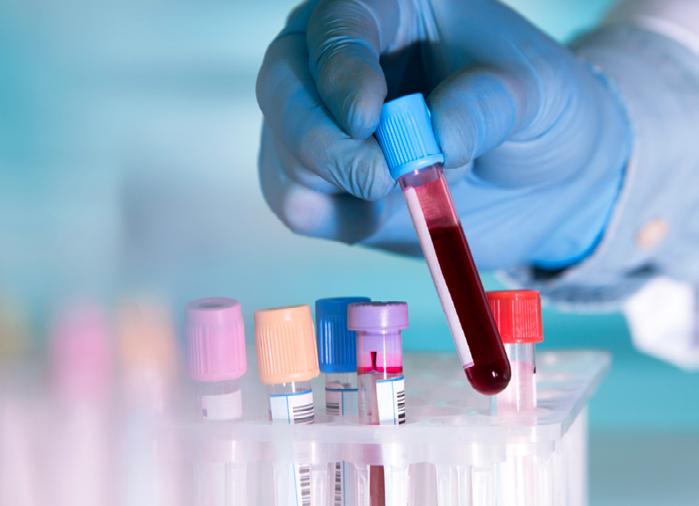
In a trial involving 5,000 individuals, the Galleri test demonstrated remarkable accuracy in identifying two-thirds of cancers and was able to pinpoint the location of origin in 85% of positive cases. This innovative diagnostic tool detects specific alterations in genetic material released by various types of cancer, offering the potential for early
detection of treatable forms of the disease. While further development is needed, the Galleri test could revolutionize early detection efforts and alleviate the burden on patients by providing timely information.
The NHS in England has already started using the test in thousands of asymptomatic individuals, and initial results are anticipated next year. If successful, the NHS plans to expand implementation to an additional one million people. The Galleri test has the potential to detect elusive cancers and
enable early intervention, ultimately saving lives and improving patient outcomes.
World Health Organization unveils global strategy on digital health to achieve ‘Triple Billion’ targets
SWITZERLAND — The World Health Organization (WHO) has presented its global strategy on digital health for the years 2020 to 2025, focusing on advancing universal health coverage, health emergency response, and healthier populations.
The strategy aims to accelerate the development and adoption of personcentric digital health solutions that are accessible, affordable, scalable, and sustainable. It emphasizes factors such
as accessibility, efficiency, affordability, patient privacy, and data security.
The strategy calls for investment in governance, workforce training, planning, and management to bring about improvements in health outcomes. While there have been criticisms regarding the rollout of the strategy, many member states have recognized the importance of digital health and increased their investments in this area.
The WHO is working to empower
member states with the necessary capacity, guidance, and tools for digital transformation. However, there is a collective call for stronger leadership, alignment of standards, and transparent reporting of progress to fully unlock the benefits of digital health. With concerted efforts and collaboration, digital health has the potential to transform healthcare delivery worldwide.
8 HEALTHCAREMEA.COM MAY/JUN 2023 | HEALTHCARE MIDDLE EAST & AFRICA NEWS UPDATES
PHARMACEUTICALS
SCIENCE & RESEARCH
Sun Pharma to acquire controlling stake in Taro, appoints new Directors
INDIA — Indian pharmaceutical company Sun Pharma has announced its plan to acquire a controlling stake in Taro Pharmaceutical Industries, an Israeli research-based pharmaceutical manufacturer, in a buyout deal worth US$300 million.
Sun Pharma already owns a 78.5% stake in Taro and plans to buy out the remaining shares, adding an additional 21.5% to its ownership. The transaction is valued at US$38 per ordinary share and will make Taro a wholly-owned subsidiary of Sun Pharma, leading to its delisting from the New York Stock Exchange.
The acquisition will allow Sun Pharma to benefit from Taro's expertise in dermatology, pediatrics, specialty
HOSPITALS
and generic pharmaceuticals, and overthe-counter products. Sun Pharma will establish a wholly-owned subsidiary or special-purpose entity for the merger agreement with Taro.
The deal comes after Sun Pharma reported a 29.6% increase in fourthquarter profit, driven by strong growth in its specialty portfolio. Additionally, Sun Pharma has entered into a licensing agreement with Philogen to commercialize Nidlegy, an anti-cancer biopharmaceutical, across Europe, Australia, and New Zealand. This partnership will further strengthen Sun Pharma's presence in the oncodermatology space and support its goal of providing solutions for a wide range of skin cancers.
President Buhari inaugurates US$45 million hospital to provide healthcare services for VIPs

NIGERIA — President Muhammadu Buhari has inaugurated the state-ofthe-art presidential wing of the State House Medical Center in Abuja, Nigeria. The US$45 million healthcare facility aims to reduce the need for state officials and VIPs to travel abroad for medical services. Located within the Presidential Villa in Abuja, the Presidential Wing will operate alongside the existing State House Medical Centre in Asokoro, providing accessible and well-equipped healthcare services.
The facility includes a specialized Intensive Care Centre, a Catheterization Laboratory (Cath lab), and two operating rooms for regular and special procedures. The project was completed on schedule and within budget. Other completed legacy projects at the State House include a Special Care Centre, a Biosafety Level 2 Molecular Laboratory, and a dental wing extension building.
Nigerians have traditionally spent
significant amounts on healthcare expenses abroad due to a lack of confidence in the quality of the healthcare system at home. The establishment of high-tech medical facilities like the Presidential Wing aims to address this issue and discourage Nigerian elites from seeking treatment abroad. Providing quality healthcare delivery and infrastructure in the country can restore citizens' confidence in the health sector and potentially attract highly skilled Nigerians living abroad to return home.
EGYPT —Egypt's largest chain of outpatient care, Dawi Clinics, has secured an investment of $8 million (250 Egyptian pounds) in a funding round led by Al Ahly Capital Holding (ACH).

The round also saw additional investments from the EgyptianAmerican Enterprise Fund (EAEF) and existing investors of Dawi. The funding will enable Dawi to accelerate the expansion of its chain of clinics in Egypt by opening 30 new branches. The company aims to improve healthcare in Egypt by providing coordinated family care services through highly-skilled doctors across multiple specialties. The investment comes as a testament to the value of the Egyptian market despite ongoing economic challenges. Dawi Clinics' unique operating model focuses on standardizing clinical guidelines and procedures, using computerized medical records, and employing full-time salaried doctors to ensure quality control. The company operates 20 branches across 10 governorates and served around 100,000 patients in 2022.
The funding will be used to further develop Dawi's medical technology platform, which includes a cloudbased electronic record system, remote communication with patients, loyalty programs, and integrated healthcare services. Al Ahly Capital Holding plans to enhance healthcare provision and standardize services across the country through its own healthcare platform.
HEALTHCAREMEA.COM MAY/JUN 2023 | HEALTHCARE MIDDLE EAST & AFRICA 9
Egypt’s Dawi Clinics snaps up US$8 million in an investment round to fuel its growth
MERGER & ACQUISITION
Everest Health Investments expands its reach in UAE’s primary health sector
through acquisition of two healthcare companies
affordability. Medicentres operates four premium primary care clinics in Dubai, providing a comprehensive range of services, including medical and dental consultations, pharmacy services, and diagnostic services. Novitas specializes in cost-effective virtual and home health services and manages on-site facilities across the UAE.
UAE —Everest Health Investments, a healthcare investor based in Dubai, has acquired Medicentres Polyclinics and Novitas Health, two prominent companies in the UAE's primary health sector.
The acquisition aligns with Everest Health's commitment to expanding its primary healthcare offerings, both online and offline, while prioritizing convenience, quality of care, and
The CEO of Everest Health, Mr. Kartik Thakrar, expressed enthusiasm about the acquisition, highlighting the strategic advantage of reaching affluent customer segments through Medicentres' high-end community clinics and Novitas' capability to offer smart and affordable home health and on-site services. With Medicentres Polyclinics and Novitas Health in its portfolio, Everest Health aims to enhance the accessibility and quality of primary healthcare services in the UAE.
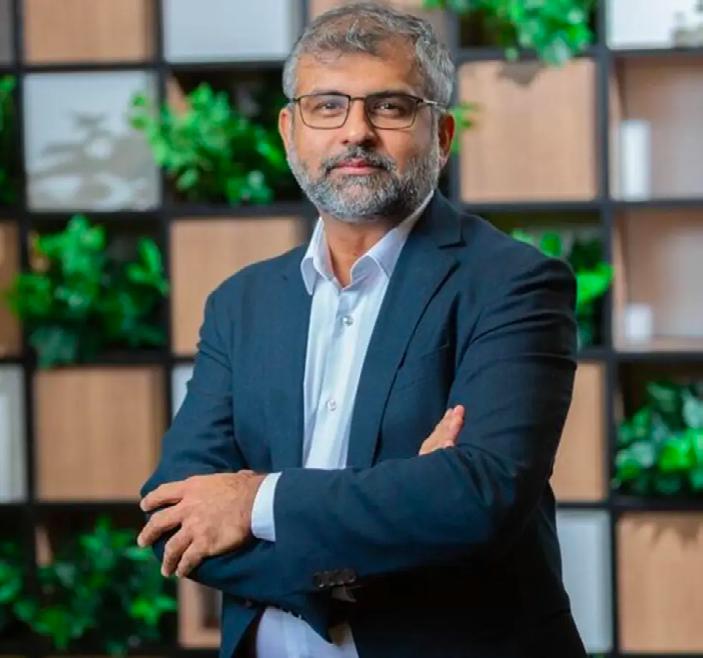
The company serves approximately 350,000 patients annually, addressing the challenge of escalating healthcare
costs by offering high-quality and highvalue healthcare services through inperson and virtual consultations. The healthcare sector in the GCC region is witnessing a trend of mergers and acquisitions. Amanat Holdings announced the creation of the largest pan-GCC post-acute care platform, while Abu Dhabi's International Holding Company acquired a stake in Burjeel Holdings to diversify its healthcare investments.
Mubadala and G42 merged their healthcare divisions to create an integrated, data-driven healthcare company in the UAE. Experts predict more mergers, acquisitions, and consolidations in the GCC healthcare market as it continues to mature. The region's healthcare spending is projected to reach US$135.5 billion by 2027, driven by factors such as the aging population, improving economic activity, focus on preventive care, and mandatory health insurance policies.
Rwanda’s novel approach to mental health challenges unveiled
RWANDA — A collective involving government agencies and nongovernmental organizations in Rwanda has teamed up to launch the Baho Neza – Mental Health Project.
The collective involves the Rwanda Biomedical Agency (RBC), a governmental agency that promotes high-quality, affordable, and sustainable healthcare services, the Imbuto Foundation, the Genocide Survivor’s Students Association (GAERG), and Baho Heza.
Initiated by First Lady Jeannette Kagame to raise awareness on family planning and early childhood development. It will tackle the mental health issues plaguing the Rwandan population through different forums and campaigns.
The project seeks to address the urgent problem of mental health in
Rwanda and is focusing on six districts: Nyamasheke, Nyaruguru, Nyagatare, Musanze, Bugesera and Gasabo.
It aims to raise awareness of mental health among families and foster better well-being in these communities and to provide special attention to vulnerable groups such as mothers and their children, adolescents, and young people, as well as Genocide survivors.
Ultimately, the Baho Heza mental health project goal is to connect the most vulnerable to the necessary mental health services available at their respective health centers.
Dr. Jean Damascène Iyamuremye, the Director of the Psychiatric Care Unit in the Mental Health Division told The New Times of Rwanda that the Ministry of Health intended to explore the mental status of the Rwandan population and the impact of COVID on mental health.
According to a study conducted by the MOH Rwanda on the status of mental health in the country in 2018, the prevalence of mental health disorders was estimated at 20.5 percent among Rwandans.
The Rwanda Mental Health Survey found that the most observed mental disorders in the general population were major depressive episodes, affecting 12 percent of respondents, followed by panic disorder at 8.1 percent and posttraumatic stress disorder (PTSD) at 3.6 percent.
These findings emphasize the urgent need for comprehensive mental health support and interventions in Rwanda to address the significant burden of mental disorders in both the general population and among Genocide survivors.
10 HEALTHCAREMEA.COM MAY/JUN 2023 | HEALTHCARE MIDDLE EAST & AFRICA
MERGERS AND ACQUISITIONS
NEWS UPDATES

www.africahealthexpo.com Co-located with: OCTOBER 5-7, 2023 | Visa Oshwal Centre, Nairobi, Kenya DISCOVER & ENGAGE WITH LOCAL, REGIONAL & GLOBAL HOSPITALS, CARE & WELLNESS CENTRES AN FW AFRICA EVENT Join more than 5,000 attendees from Eastern Africa and beyond, as they meet and engage with leading providers of personal health and wellness solutions at the Africa Hospitals & Wellness Expo. FREE ENTRY to all!!! info@fwafrica.net +254 725 343 932 www.africahealthexpo.com Sign up to Sponsor, Attend & Speak SCAN ME EXPO AFRICA & WELLNESS HOSPITALS
NEWS UPDATES
IFC approves US$12.7 million senior loan for Avenue Hospital’s expansion drive and facility enhancement
KENYA — The International Finance Corporation (IFC) has approved a senior loan of Sh1.7 billion (US$12.7 million) to Avenue Hospital in Kenya to finance its expansion and enhance its facilities.

The funds will be used to build a new wing at Avenue's Nairobi facility, establish a radiology department at its Kisumu hospital, install operating theatre equipment at its Kisumu and Thika branches, and establish five new clinics across the country. The IFC will also provide advisory services to improve resource efficiency at Avenue's facilities.
MANUFACTURING
South Africa to manufacture CAB-LA, an injectable HIV-prevention drug
The investment is part of the IFC's efforts to support the healthcare sector and leverage the private sector to meet the growing demand for quality healthcare in Kenya. Avenue Group is owned by US private equity fund Evercare Health Fund, which operates medical facilities in emerging markets across South Asia and Africa. Private equity funds have been investing in Kenya's healthcare sector due to its high growth potential and increasing demand from middle-income earners.
The IFC has been actively investing in healthcare facilities in Kenya and partnering with organizations to strengthen health systems in Africa. The IFC's investments and support aim to improve access to high-quality healthcare products and services and facilitate the growth of the private healthcare sector in Africa.
SOUTH AFRICA — Cipla, a global pharmaceutical company, has announced plans to manufacture an affordable version of cabotegravir (CAB-LA), a long-acting HIV prevention drug, in South Africa.
This development has the potential to provide access to the drug for millions of people in Africa. CAB-LA has been shown to significantly reduce the risk of contracting HIV and is more effective than daily oral PrEP pills because of its easier adherence and longer-lasting effects. Cipla will produce a generic version of CAB-LA at its manufacturing facilities in Benoni near Johannesburg.
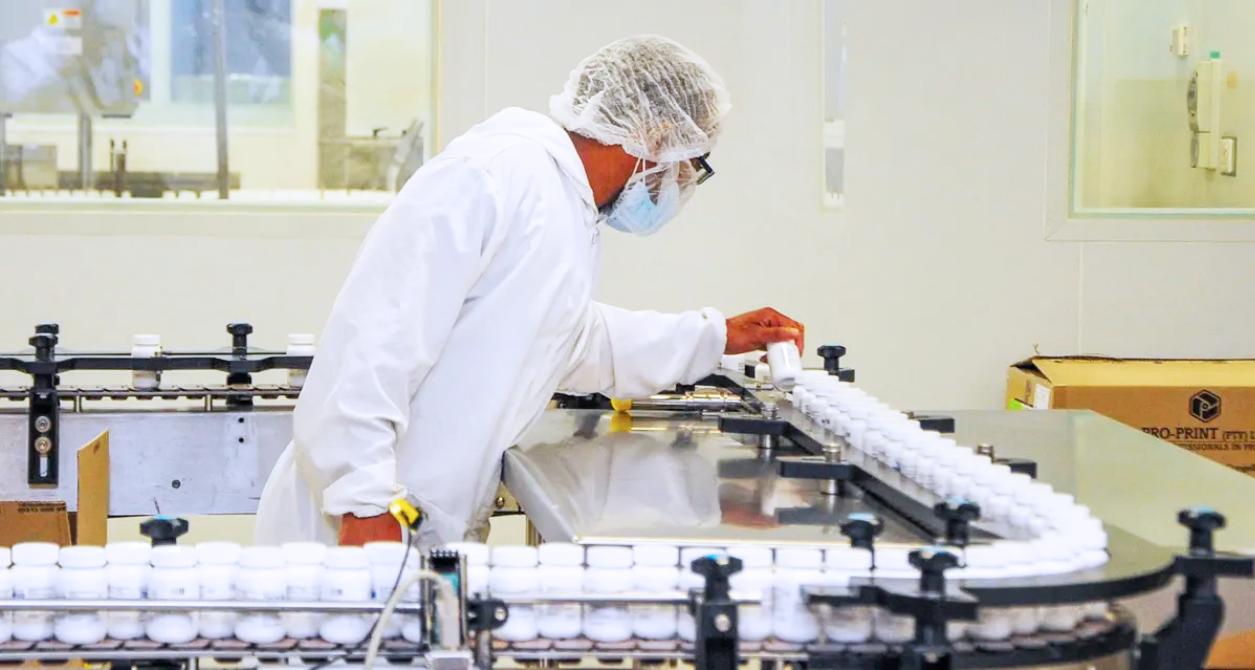
The confirmation follows the granting of licenses to three companies, including Cipla, by the developers of CAB-LA and the UN-backed Medicines Patent Pool. The branded version of CABLA is currently expensive, putting it out of reach for lower-income countries. By producing a generic version, Cipla aims to make the drug more affordable and accessible to those in need.
The production of a generic version of CAB-LA requires access to manufacturing technology, which can take several years. In South Africa, ViiV Healthcare currently holds the patent for CAB-LA until 2031. Lowering the price of the drug and increasing access
to affordable versions is crucial to combating HIV/AIDS globally.
The World Health Organization (WHO) has recommended the use of long-acting injectable CAB-LA as pre-exposure prophylaxis (PrEP) for HIV. The WHO encourages countries
THE WORLD HEALTH ORGANIZATION (WHO) HAS RECOMMENDED THE USE OF LONGACTING INJECTABLE CAB-LA AS PRE-
HIV
to consider this safe and effective prevention option for individuals at high risk of HIV infection. To achieve global progress in combating HIV, addressing research gaps related to CAB-LA, such as drug resistance, testing, service delivery, and safety during pregnancy and breastfeeding, is essential.
12 HEALTHCAREMEA.COM MAY/JUN 2023 | HEALTHCARE MIDDLE EAST & AFRICA
EXPOSURE PROPHYLAXIS (PREP) FOR
Sanofi invests US$150M to acquire oral Pompe disease drug candidate from Maze Therapeutics

million, including upfront cash and a future equity investment in Maze. Milestone payments of up to US$600 million could also be made based on the drug's progress under Sanofi.
levels. With the agreement, Maze can shift its focus to its next mostadvanced program for APOL1-mediated
FRANCE — Sanofi and Maze
Therapeutics have entered into an agreement for the exclusive worldwide license of Maze's glycogen synthase 1 (GYS1) program and oral substrate reduction therapy, MZE001, to treat Pompe disease.
MZE001, a small molecule formulated as a twice-daily pill, is designed to block the glycogen synthase enzyme and offers a more convenient alternative to infused enzyme replacement therapies. Sanofi will acquire the drug for US$150
Pompe disease is a genetic disorder causing muscle weakness and breathing difficulties due to mutations in the gene that codes for the acid alpha-glucosidase enzyme. Sanofi currently has two therapies for the disease, including enzyme replacement therapy (ERT) with Lumizyme (marketed as Myozyme in Europe).
However, Lumizyme has limitations, prompting the development of Nexviazyme, a second-generation ERT targeting a receptor for improved cell uptake. MZE001 offers advantages over both products as it can be taken orally, providing a more convenient treatment option.
MZE001 has shown promise in a Phase 1 trial, demonstrating good tolerability and reductions in glycogen
chronic kidney disease. The company also develops antibody drugs for eye diseases through Broadwing Bio, a joint venture with Alloy Therapeutics. Maze aims to concentrate on genetically linked disorders with a potentially larger impact on patients.
Africa CDC launches 5-year Reproductive Health Strategy Priorities program
and the Continental Policy Framework on Sexual and Reproductive Health and Rights, with the goal of accelerating their implementation and monitoring in AU member states.
ETHIOPIA — The Africa CDC has launched its 5-year Reproductive Health Strategies Priorities program for 20222026, aiming to improve maternal and reproductive health across the continent.
The program, endorsed by representatives from 51 African Union member states, provides strategic priorities for member states to enhance

their reproductive health systems and achieve better outcomes for mothers and newborns.
It emphasizes the importance of engaging with partners, implementing targeted interventions, and securing political support to overcome existing challenges in the field. The initiative aligns with the Maputo Plan of Action
However, Africa still faces significant challenges in reproductive health, including high maternal mortality rates and limited access to comprehensive services. The Africa CDC's Reproductive Health program is a crucial step towards addressing these gaps, with a focus on reducing maternal and newborn mortality rates. The adoption and implementation of the program mark an important milestone in improving reproductive health outcomes in Africa, and it is hoped that the comprehensive approach outlined in the strategy will bring about substantial progress in the region.
HEALTHCAREMEA.COM MAY/JUN 2023 | HEALTHCARE MIDDLE EAST & AFRICA 13 PHARMACEUTICALS
SANOFI CURRENTLY HAS TWO THERAPIES FOR THE DISEASE, INCLUDING ENZYME REPLACEMENT THERAPY (ERT) WITH LUMIZYME
Shortage of cancer treatments causes delays and medication switches, alarming U.S. cancer centers
USA — Prominent U.S. cancer centers are grappling with a growing shortage of common cancer treatments, which has led doctors to resort to medication switches and delays in care, the Associated Press reports.
According to a survey conducted by the National Comprehensive Cancer Network, nearly all the centers surveyed in late May reported shortages of carboplatin and cisplatin, two drugs widely used in the treatment of various cancers. Some centers have been unable to administer carboplatin to patients at the prescribed dosage and schedule.
Dr. Kari Wisinski, a breast cancer specialist at the UW Health Carbone Cancer Center expressed the challenges faced by physicians when discussing the unavailability of prescribed medications with patients and their families, adding they had resorted to alternative treatments and rearranging drug combinations, hopeful that a better supply of carboplatin would be available within three months.
Mike Ganio, a researcher specializing in drug shortages at the American Society of Health-System Pharmacists, noted the rapid escalation of the problem, transitioning from a shortage to a severe shortage within a short period.
The factory in India responsible for manufacturing both carboplatin and cisplatin temporarily ceased production earlier this year following quality concerns raised during an inspection.
The shortage of prescription drugs in the United States is attributed to manufacturing issues, unexpected surges in demand, and limited supplies of ingredients. To mitigate the chemotherapy shortage, the U.S. Food and Drug Administration (FDA) has allowed the temporary importation of foreign-approved versions of cisplatin from FDA-registered factories.
Egypt’s Magdi Yacoub Heart Foundation to open a new state-of-the-art heart center in Giza
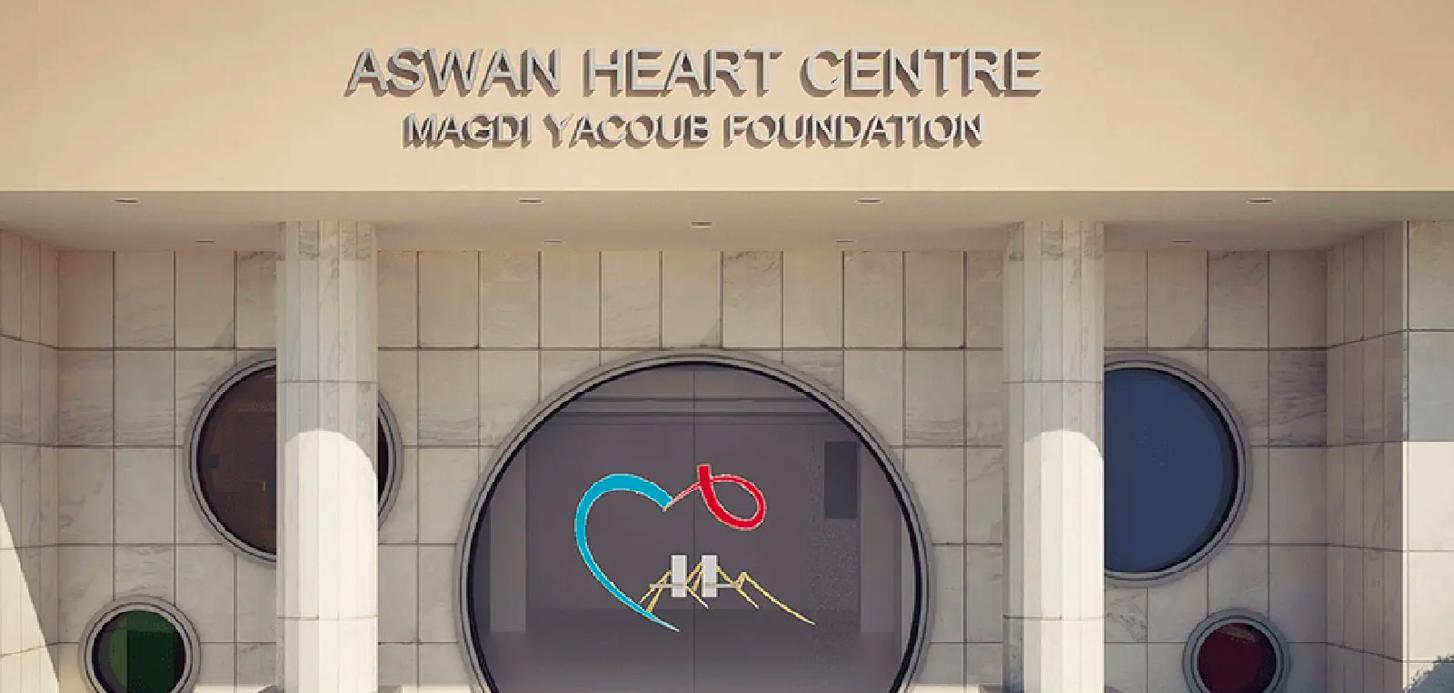
EGYPT — The Magdi Yacoub Heart Foundation (MYF) has partnered with Mercedes-Benz Egypt to establish the Magdi Yacoub Global Heart Centre in Egypt's 6th of October City.
The center, expected to be operational by early 2024, will provide free value-based care to patients with heart disease, including children. It aims to serve over 120,000 patients, conducting 12,000 surgical operations, with 60% of them focused on children.
healthcare services to thousands of Egyptians suffering from heart and cardiovascular diseases through the Aswan Heart Centre.
Mercedes-Benz Egypt's alliance with MYF supports its commitment to making a positive impact in the communities where it operates. The company will contribute to the construction progress of the heart center, leveraging its partnership to enhance patient access to essential healthcare services. During a visit to the Aswan Heart Centre, Mercedes-Benz Egypt gained insight into the center's medical research and met with Dr. Magdi Yacoub, a renowned figure in improving healthcare services in Egypt.
The collaboration between MYF and Mercedes-Benz Egypt aims to deliver innovative treatments to Egyptians, improve the healthcare system, and positively impact future generations. It highlights the significance of publicprivate partnerships in supporting charitable causes and amplifying their impact.
The facility will reduce waiting times, improve outpatient satisfaction, and offer medical training to cardiologists and surgeons. MYF, a charitable organization, already provides free
The establishment of the Magdi Yacoub Global Heart Centre aligns with MYF's mission to provide cardiovascular care to a larger number of patients and establish a medical center of excellence dedicated to cardiac surgery, treatment, and research.
14 HEALTHCAREMEA.COM MAY/JUN 2023 | HEALTHCARE MIDDLE EAST & AFRICA NEWS UPDATES
PARTNERSHIP
THE FACILITY WILL REDUCE WAITING TIMES, IMPROVE OUTPATIENT SATISFACTION, AND OFFER MEDICAL TRAINING TO CARDIOLOGISTS AND SURGEONS.
• Reach the healthcare, pharmaceutical and biotech industry in Africa & Middle East using one publication and website




• The first magazine of its kind in the region that is also available in a digital format, providing our advertisers with a regional and worldwide audience
• The magazine and website are read by key decision makers with direct responsibilities for purchase of new technologies, products and services across Africa, Middle East and globally.




• HealthCareMEA.com is the best read and visited healthcare, pharmaceuticals and biotech news website in Africa and the Middle East.



ADVERTISE IN AFRICA & MIDDLE EAST’S NO.1 HEALTH & PHARMA INDUSTRY MAGAZINE & WEBSITE ADVERTISE WITH US TO GROW YOUR BUSINESS . . . YEAR 2 ISSUE NO. MAR/APR 2023 MP Shah CEO on how the hospital alleviates human suffering through compassionate care INDUSTRIES Elevating Healthcare ethics innovation in Kenya’s pharma industry Leading the way in specialized healthcare in Western Kenya Tanzania Healthcare System DISEASE FOCUS TOSEEF DIN NO.1 HEALTHCARE & PHARMA INDUSTRY MAGAZINE HealthCare MIDDLE EAST & AFRICA BRIGHT MEDICALS: Leveraging Artificial Intelligence to help doctors with precision diagnosis
ADVERTISE IN HEALTHCARE AFRICA MAGAZINE & WEBSITE?
WHY
info@fwafrica.net +254 725 343 932 www.healthcareMEA.com FOR MORE INFORMATION CONTACT:
Bahrain’s Dividend Gate Capital and partners inject US$150 million in healthcare financing in Arab states
Khaled Al-Hammadi, the Founder and CEO of Dividend Gate Capital, emphasized that investing in the healthcare industry is crucial for governments to achieve exceptional healthcare standards for their populations. He highlighted the importance of enhancing accessibility and quality of services by involving the private sector in this vital sector.
BAHRAIN — Dividend Gate Capital (DGC) and its partners have invested US$150 million in the health systems of Bahrain, Saudi Arabia, and the United Arab Emirates.
This funding aims to strengthen DGC's investments in the healthcare sectors of the Arab states and expand its presence in the region. The funds will be used to identify diverse investment opportunities and achieve desired returns through a mixed portfolio of income-generating investments and growth opportunities.
DGC and its partners are focusing on promising investment opportunities in the healthcare industry within the Gulf Cooperation Council countries. They have already built a diverse investment portfolio, including healthcare facilities such as AlHokama Eye Specialist Centre, Ajman Medical Center, Gulf Oasis Rehabilitation Center, and Link International Medical Center. The plan is to further strengthen their healthcare portfolio through acquisitions and partnerships with developing healthcare institutions.
Al-Hammadi also acknowledged the investor-friendly regulations and favorable geographic location of the Gulf Cooperation Council, which provide a unique opportunity for investors to contribute to the region's healthcare transformation journey.
With this investment, Dividend Gate Capital and its partners aim to create an exciting and desirable business environment that fosters a talented team, promotes knowledge exchange, and builds a vibrant community of businesses and stakeholders.

Patient groups rank Roche, ViiV, and Horizon as the most reputable pharmaceutical companies worldwide
USA — According to the PatientView report, which assesses the reputation of pharmaceutical companies based on feedback from patient groups, Roche, ViiV Healthcare, and Horizon Therapeutics emerged as the top three most reputable pharmaceutical companies in 2022.

This ranking is divided into two sections: one based on responses from patient groups familiar with the companies but not directly involved with them, and the other based on responses from patient groups that work directly with the ranked companies. In the first section, Roche claimed the first position, followed by ViiV Healthcare and Horizon Therapeutics. In the second section, ViiV Healthcare secured the top spot,
followed by Horizon Therapeutics and Roche. Notably, Pfizer, which previously held a top-ranking position, fell out of the top three.
The report also highlighted the reputation advancements of Vertex, Servier, and Merck, with these companies experiencing significant improvements in their rankings compared to the previous year. However, despite the positive recognition garnered by the pharmaceutical industry during the COVID-19 pandemic, the report suggests that the industry's reputation may be waning. Access to medicines was a concerning aspect, with only 32% of patient groups regarding pharma as "excellent" or "good" in terms of improving access, particularly in terms
of affordability and distribution in underprivileged countries. More than half of the respondents rated pharma as "fair" or "poor" in this regard, with the sentiment being most prevalent in African countries.
16 HEALTHCAREMEA.COM MAY/JUN 2023 | HEALTHCARE MIDDLE EAST & AFRICA NEWS UPDATES
INVESTMENTS
INVESTMENTS
Oman’s Ministry of Health to open 11 new hospitals countrywide
Fortis Healthcare’s diagnostics arm SRL rebrands as Agilus
INDIA —SRL Diagnostics, a subsidiary of Fortis Healthcare, has rebranded as Agilus Diagnostics, signaling a new phase of growth for the company.

The rebranding comes after the acquisition of Lifeline Laboratory and reflects Agilus' focus on becoming India's leading network of diagnostic centers. The company aims to adapt to evolving customer needs by implementing new technology and incorporating digital pathology consultations through a partnership with PathPresenter.
Agilus Diagnostics plans to expand its capabilities in genomics and nextgeneration diagnostics, enhance client
OMAN — The Ministry of Health in the Sultanate of Oman is set to establish eleven new medical centers across the country, aiming to enhance the nation's health infrastructure and improve access to healthcare services.
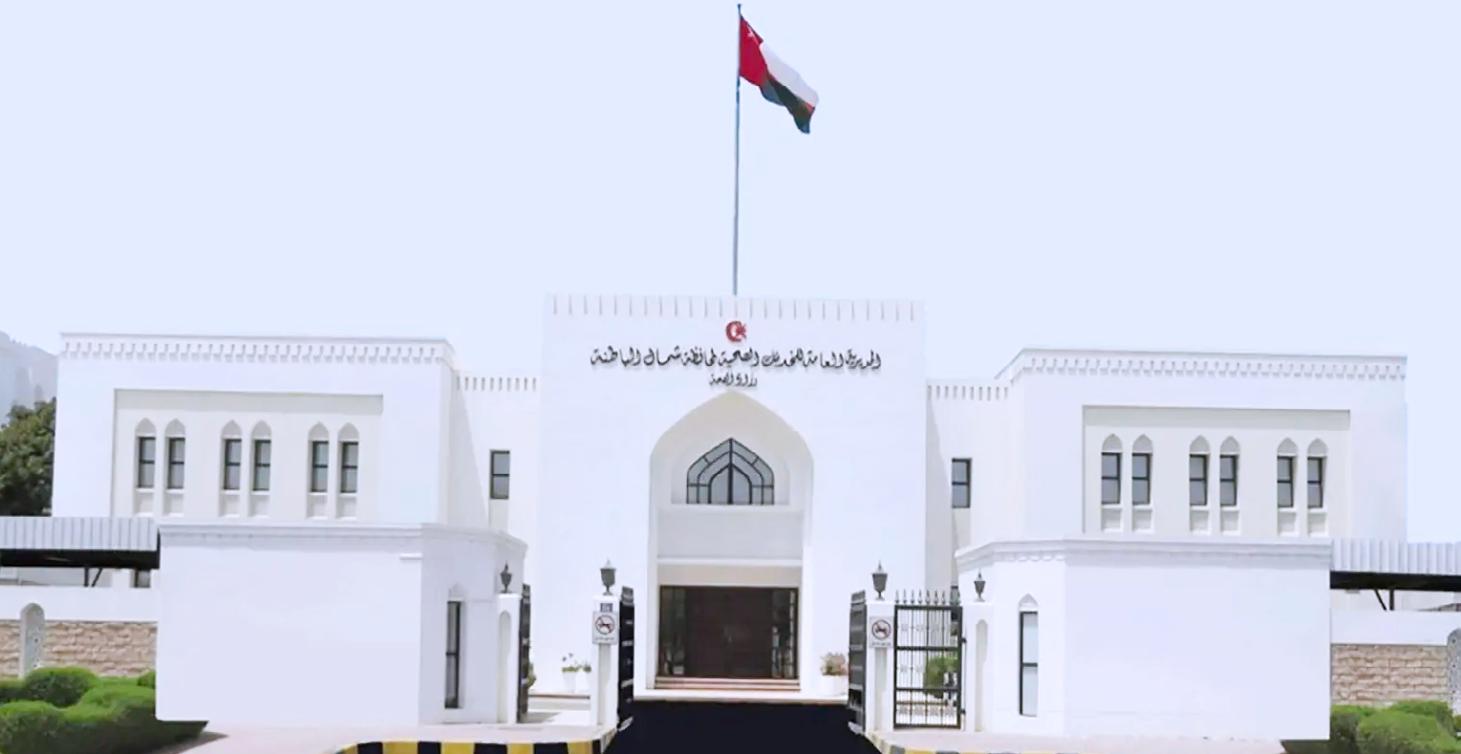
These healthcare facilities will be strategically located in various governorates throughout Oman.Among the upcoming projects is the Sultan Qaboos Hospital in Dhofar Governorate, scheduled to open in 2025. Additionally, construction of the 164-bed Khasab Hospital in the mountainous Musandam Governorate is well underway and expected to be fully operational by the end of 2024.
The Al Suwaiq Hospital in Al Batinah North Governorate, with a capacity of 307 beds, is also under construction and anticipated to open in 2024. Furthermore, the Ministry of Health plans to build the Mahout Hospital in Al Wusta Governorate by the end of 2025.
Efforts to enhance healthcare accessibility also include the upgrade of the Mad'ha Health Centre in Musandam Governorate to a full-fledged hospital, expected to be operational by the end of 2023. The Thamrait Health Centre, situated between Muscat and Salalah, will be refurbished into a hospital this year.
In addition to these projects, the
Ministry of Health is in the final stages of designing and preparing three new hospitals: Al Falah Hospital in Ash Sharqiyah South Governorate, Samayil Hospital in Al Dakhiliyah Governorate, and Al Nama Hospital in Ash Sharqiyah North Governorate.
In a separate development, Dr. Sulaiman Al-Habib Medical Group (HMG) has invested over SAR 6.5 billion (US$1.73 billion) to construct six hospitals in Saudi Arabia. This initiative aligns with the group's objective of developing advanced medical facilities and providing innovative healthcare services to benefit the population.
experiences, and provide digitally enabled services. The rebranding is expected to create renewed value for stakeholders and channel partners while emphasizing Agilus' commitment to better health outcomes for patients. The company also aims to champion good health, well-being, and sustainability by reducing its carbon footprint.
Backed by Malaysian IHH Healthcare and private equity investors, Agilus Diagnostics is working closely with partners to complete the brand transition. The CEO of Agilus Diagnostics, Mr. Anand. K, highlighted that the new identity reflects the company's commitment to collaboration, diversity, and inclusion. With a presence in over 1,000 cities and 34 states and union territories, Agilus Diagnostics has established a strong legacy of expertise and trust in delivering highquality diagnostic care over the last two decades.
HEALTHCAREMEA.COM MAY/JUN 2023 | HEALTHCARE MIDDLE EAST & AFRICA 17
CONSTRUCTION OF THE 164-BED KHASAB HOSPITAL IN THE MOUNTAINOUS MUSANDAM GOVERNORATE IS WELL UNDERWAY AND EXPECTED TO BE FULLY OPERATIONAL BY THE END OF 2024.
APPOINTMENTS UPDATE


Dr. Jairam selected as the new Chairman of India’s Medica Group of Hospitals

INDIA — Dr. Nandakumar Jairam has been appointed as the new Chairman of Medica Group of Hospitals, taking over from Founder and Former Chairman Dr. Alok Roy.
Bhavana Agrawal to takeover CFO role at AstraZeneca India on October 1
INDIA — AstraZeneca India has appointed Bhavana Agrawal as its new Chief Finance Officer (CFO) following the departure of Rajesh Marwaha.

Agrawal's appointment comes as the company prepares to establish new Centers of Excellence for asthma care in India. AstraZeneca has also introduced its rare disease drug Selumetinib in India after receiving regulatory approval, marking its entry into rare disease therapy in the country.
Agrawal will oversee the financial strategy and operations, planning and analysis, and investor relations in the Indian subcontinent. She brings extensive experience in finance functions in the healthcare and pharmaceutical industry, particularly in maximizing revenue, margin, and cash.
Agrawal will take over the CFO role from Marwaha, who played a significant role in building strategic frameworks for the company in India and improving access to healthcare. Marwaha plans to retire at the end of September 2023. AstraZeneca India expressed confidence in Agrawal's ability to accelerate growth and deliver life-changing medicines to patients through innovative science.
Medica Group of Hospitals is a major healthcare chain in Eastern India and has built and managed multiple multispecialty and super specialty healthcare facilities in the region. Dr. Jairam, with over 35 years of experience in the healthcare industry, will lead the strategic growth strategies of the group. He is an alumnus of Bangalore Medical College and has held various positions at Columbia Asia Hospitals in India, including Chairman and CEO.
Ken Washington takes the helm as Medtronic’s Chief Technology and Innovation Officer

IRELAND — Medtronic, a global leader in medical technology, has appointed Ken Washington as its Chief Technology and Innovation Officer.
Dr. Washington will be responsible for expanding the use of technology platforms across Medtronic's portfolio, focusing on areas such as robotics, sensors, implantables, and AI. With his background in technology leadership roles at Amazon and Ford Motor Company, Dr. Washington brings expertise to drive Medtronic's technological advancements and enhance its competitive advantage.
Dr. Jairam has been associated with organizations such as the NABH, FICCI, NATHEALTH, and GAPIO, and has been actively involved in setting quality benchmarks and promoting healthcare services. The leadership change was welcomed by Mr. R Udayan Lahiry, Co-founder & Director of Medica Synergie Private Limited, who expressed confidence in Dr. Jairam's ability to add value to the organization and continue its growth trajectory.
Under Dr. Jairam's leadership, Medica Group of Hospitals aims to expand its medical capabilities in Kolkata and other major cities in Bengal.
Dr. Washington's previous achievements include leading technology strategies at Ford Motor Company and holding advanced degrees in nuclear engineering. His appointment signifies Medtronic's dedication to advancing healthcare technology and driving growth through innovation.
This announcement follows Medtronic’s recent acquisition of South Korean wearable insulin patch maker, EOFlow, for a total consideration of KRW 971 billion (US$739 million). Furthermore, the company reported fourth-quarter sales of US$8.5 billion, reflecting a 5.6% increase compared to the same period last year.


18 HEALTHCAREMEA.COM MAY/JUN 2023 | HEALTHCARE MIDDLE EAST & AFRICA
DP World’s Aviv Clinics Dubai hires Craig Cook as its new CEO
UAE — Craig Cook, former Executive Director for International Operations at Cleveland Clinic, has been appointed as the new Chief Executive Officer (CEO) of Aviv Clinics Dubai.

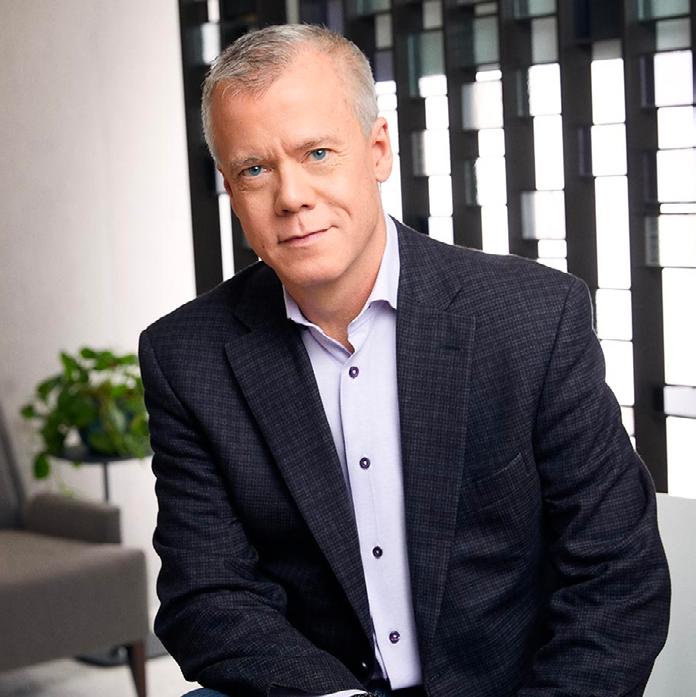
The executive appointment comes as Aviv Clinics Dubai enters its third year in the United Arab Emirates (UAE), marking an exciting new chapter for the clinic.
Aviv Clinics Dubai, a subsidiary of DP World, offers cutting-edge assessments, treatments, and performance improvements for cognitive and physical health. It combines proprietary Hyperbaric Oxygen Therapy (HBOT), a patented cognitive and physical training

Chris Boerner appointed as CEO of Bristol Myers Squibb, succeeding Giovanni Caforio
USA — Bristol Myers Squibb (BMS) has announced that CEO Giovanni Caforio will step down in November, with Christopher Boerner, the company's Chief Commercialization Officer, taking over as CEO.
Boerner has been with BMS since 2015 and has held leadership positions in companies like Seattle Genetics and Roche's Genentech. Under Caforio's leadership, BMS experienced significant growth, tripling its revenue primarily through the acquisition of Celgene and launching 12 new medicines. However, BMS now faces challenges as the patents for its blockbuster drugs Eliquis and Opdivo are set to expire, and Revlimid is already facing generic competition.
Rui Morais to take over CEO role at Dis-Chem
SOUTH AFRICA — Effective from July 1, 2023, Rui Morais, the current Chief Financial Officer (CFO) of DisChem, will assume the role of Chief Executive Officer (CEO), following Ivan Saltzman's decision to step down after his remarkable 45-year tenure as cofounder and CEO of the company.
Morais, who has been with DisChem since 2010 and has played a pivotal role as CFO and a member of the executive leadership team, will now lead the company into its next phase of growth and development. His extensive experience and deep involvement in shaping the group's strategy over the past 11 years position him well for this new leadership role.
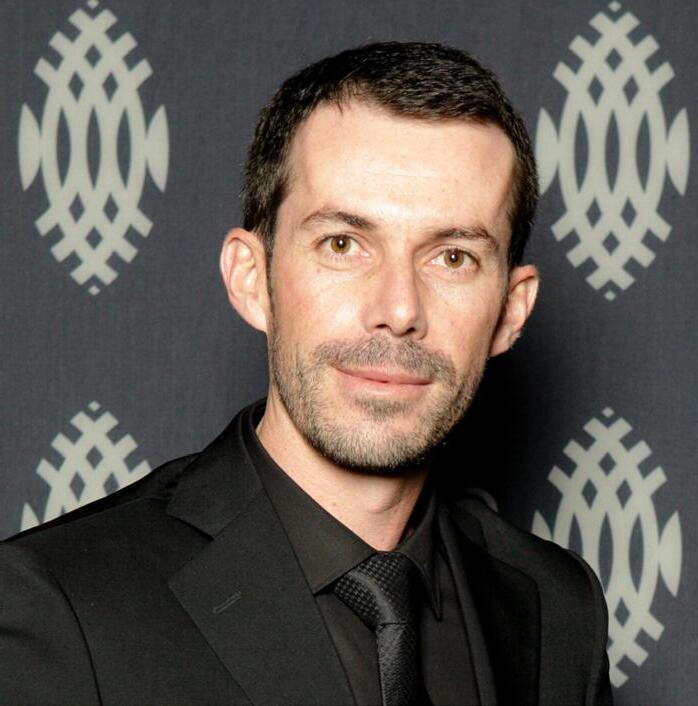
program, and personalized nutritional coaching optimized using advanced data analytics tools.
In his role as CEO, Craig Cook will be responsible for steering the growth and business development of Aviv Clinics. With over 30 years of international leadership experience in healthcare and hospitality, Cook brings a wealth of expertise to the position. He has previously held executive positions in healthcare and hospitality organizations across the Middle East, Asia Pacific, the Caribbean, and the United States.
These drugs accounted for a significant portion of BMS' sales. Nevertheless, BMS has a robust drug pipeline, including Sotyktu and Camzyos, which are expected to generate substantial revenue by 2030.
Adam Lenkowsky will assume Boerner's previous role as Chief Commercial Officer. Caforio became CEO in 2015 and oversaw the development of blockbuster drugs like Eliquis and Opdivo, as well as significant acquisitions.
BMS joins other large biopharmaceutical companies, such as Roche, Bayer, Biogen, Seagen, Astellas, Teva, and Viatris, in recent CEO changes.
As the incoming CEO, Morais will focus on steering the company's strategic objectives and ensuring its continued success. His appointment is part of a carefully planned leadership succession, reflecting the company's commitment to maintaining strong leadership and driving its strategic ambitions forward.
Ivan Saltzman, co-founder and outgoing CEO, will remain actively involved in the company as an executive director on the board. The leadership transition has been met with confidence by Larry Nestadt, Dis-Chem's chairman, who commended Saltzman's transformative leadership and expressed assurance in the carefully selected successor.
HEALTHCAREMEA.COM MAY/JUN 2023 | HEALTHCARE MIDDLE EAST & AFRICA 19
National Cancer Summit
The Kenya Medical Association (KMA) and the East African Medical Journal (EAMJ) successfully hosted the 50 th KMA Annual Scientific Conference at Pride Inn Paradise Resort, Mombasa, on the 10 th – 13 th of May 2023. The theme of the conference was “Planetary Health: Impact of Climate Change on Health and Health Systems,” with a presentation from the Ministry of Environment, Forestry and Climate Change that affirmed the importance of multidisciplinary consideration of the effects of climate change, where they reiterated their commitment to curbingclimate change and its effects in Kenya. The governor of Mombasa County was also in attendance, and he proudly highlighted the milestones that the county has undertaken with respect to healthcare provision and their plans for the future of healthcare in Mombasa. Thematic presentations were made in the areas of climate change and food security, climate change and its effects on the population, antimicrobial consumption and resistance, carbon footprints and going green in healthcare, climate change incorporation into the medical curriculum,



20 HEALTHCAREMEA.COM MAY/JUN 2023 | HEALTHCARE MIDDLE EAST & AFRICA EVENT
REVIEW
50th KMA Annual Scientific Conference
10-13 May, 2023 – Mombasa, Kenya

2-4 February, 2023 – Nairobi, Kenya

THEME

PLANETARY HEALTH: IMPACT OF CLIMATE CHANGE ON HEALTH AND HEALTH SYSTEMS
one health approach, and emerging healthcare technology among many other topics. The event culminated in the Diamond (100-year) anniversary of the EAMJ, which is among the continent’s top-most medical journals. There was also a one-day workshop training in advocacy and research organized by the Young Doctors Network of KMA as a pre-conference offering, facilitated by KEPRECON (Kenya Pediatric Research Consortium) and EAMJ, respectively.

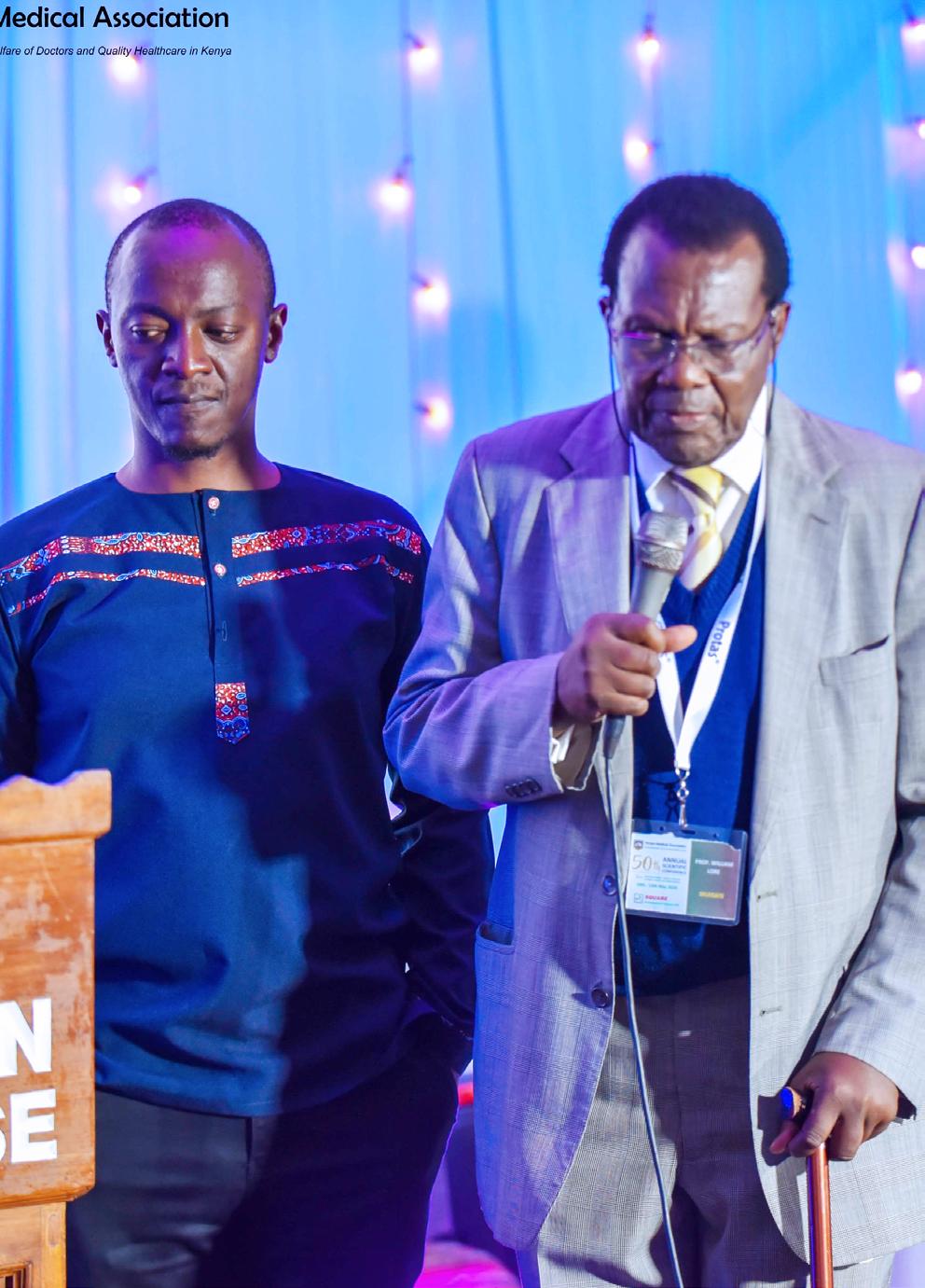
HEALTHCAREMEA.COM MAY/JUN 2023 | HEALTHCARE MIDDLE EAST & AFRICA 21
AAR HOSPITAL
Revolutionizing patient care through a customer-centered approach that leverages innovation
 By BENJAMIN OPUKO
By BENJAMIN OPUKO
In almost two years, AAR Hospital has made a remarkable impact on the healthcare landscape in Kenya, setting new benchmarks for excellence. Guided by a patient-centered philosophy, this innovative institution is transforming the healthcare experience by prioritizing the dignity, care, and holistic wellness of its patients. At the helm of this transformation is Dr. Ken Muma, the CEO, leading the way with a customer-centered approach and a commitment to innovation.
Dr. Muma explains, “AAR Hospital is part of Hospital Holdings Investment (HHI), a group that also owns AAR Healthcare clinics across Kenya. These clinics are strategically located throughout the country, including in Kisumu, Eldoret, Nakuru, Mombasa, and various suburbs of Nairobi.
“Our unique approach was to establish the clinics first, providing primary and secondary care services, and then complementing them with a hospital to complete the care journey for our patients.”
This innovative strategy sets AAR Hospital apart from traditional healthcare institutions. By having a network of clinics, the organization ensures that patients have access to comprehensive care throughout their healthcare journey. This integrated approach not only improves convenience for patients but also enables seamless continuity of care from the clinics to the hospital.
SPECIALIST CLINICS FOR COMPREHENSIVE CARE
Specialist clinics play a pivotal role in AAR Hospital's commitment to comprehensive and specialized care. These clinics go beyond traditional services, offering patients

22 MAY/JUN 2023 | HEALTHCARE MIDDLE EAST & AFRICA
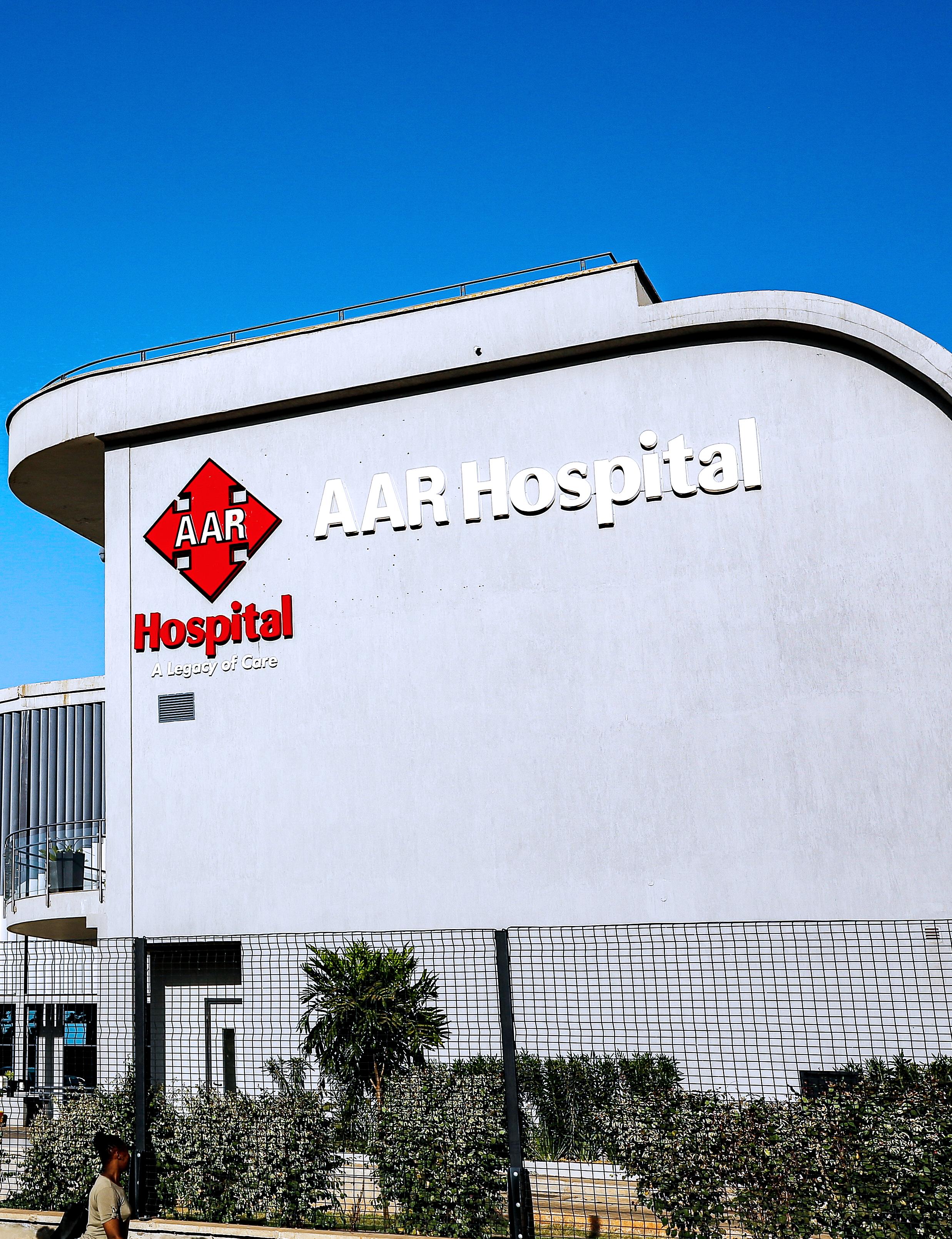
convenient appointment-based access to a wide range of medical expertise. By embracing a multidisciplinary approach, AAR Hospital ensures that patients receive comprehensive care tailored to their specific needs.
From the ongoing management of chronic and complex conditions to obstetrics and gynecology care, AAR Hospital's specialist clinics offer a diverse spectrum of medical services. The hospital's dedication to providing high-quality care is further complemented by its state-of-theart diagnostic facilities, including laboratory and imaging services. This comprehensive approach
guarantees accurate diagnosis and effective treatment for patients.
AAR Hospital's unwavering commitment to specialized care is exemplified by its neonatal intensive care unit (NICU) staffed by a team of dedicated neonatologists, offering round-theclock coverage for newborns requiring special attention and treatment. This specialized unit ensures that infants in critical conditions receive the utmost care and support.
The imaging department at AAR Hospital boasts advanced technology and services that enable accurate and precise diagnostic procedures. From digital MRI and CT scans to X-ray services, mammography, and interventional radiology procedures, the hospital's imaging department is equipped to meet a diverse range of diagnostic needs. This commitment to cutting-edge technology ensures that patients receive the most effective and efficient treatment options available.
AAR Hospital is committed to providing exceptional care across all areas, including its critical care units. The ICU is meticulously designed to cater to the complex medical needs of critically ill patients, offering round-theclock medical and nursing care. With 12 beds dedicated to intensive care, the hospital ensures that patients in critical conditions receive the specialized attention they require. The adjacent High Dependency Unit (HDU) complements the ICU by providing a step-down environment for patients as they progress toward stability.
Dr. Muma emphasizes the advanced features of the hospital's ICU and theater space, specifically tailored to address the challenges posed by the COVID-19 pandemic. He states, “The construction of our ICU was completed just in time, allowing us to effectively manage COVID patients without the need for major changes in patient flow.”
“The rooms in the ICU are equipped with negative pressure systems, which continuously draw out air from the room once a COVID patient is inside and the doors are locked. This minimizes the risk of cross-contamination and ensures a safer environment for both patients and healthcare workers,” he explains.
In addition to the advanced ventilation systems, the ICU is equipped with state-of-theart equipment designed for non-touch operation. Dr. Muma highlights the use of glass materials in the hospital, stating, "We have made extensive use of glass materials, which may seem basic but represent cutting-edge innovation in medical technology."

24 HEALTHCAREMEA.COM MAY/JUN 2023 | HEALTHCARE MIDDLE EAST & AFRICA
COMPANY FEATURE:
DR KEN MUMA- CEO OF AAR HOSPITAL
AAR Hospital
“These features not only contribute to a more efficient and hygienic environment but also demonstrate the hospital's commitment to incorporating the latest advancements in medical technology.”
Dr. Muma emphasizes that the implementation of these advanced features sets AAR Hospital apart from many other healthcare facilities in Kenya. He states, “It's important to note that only a limited number of hospitals in Kenya have implemented these advanced features.” This highlights the hospital's dedication to delivering exceptional care and its commitment to staying at the forefront of medical innovation.
SEAMLESS INTEGRATION FOR ENHANCED CONVENIENCE
Seamless integration of clinic and hospital systems lies at the heart of patient-centered care, according to Dr. Muma. Recognizing the importance of convenience for patients, AAR Hospital has prioritized the integration of its clinic and hospital systems.
“One aspect of patient-centered care is creating convenience for the patient by integrating clinic systems with hospital systems,” Dr. Muma states. This integration allows for a direct admission process from the clinic to the ward, with patient

data readily accessible. The benefits of this seamless integration are significant.
“By integrating these systems, AAR Hospital creates convenience for patients and enhances their overall experience,” Dr. Muma notes. Doctors in the ward can instantly access patient information without the need for referrals, ensuring efficient and continuous care.
“This eliminates the need to refer back to the clinic and streamlines the process, reducing administrative burdens.”
The primary goal of this integration is to solve logistical challenges for patients. “By seamlessly admitting patients from the clinic to the ward, AAR Hospital allows patients to focus on rest and recovery, free from administrative worries,” Dr. Muma emphasizes.
“Moreover, this smooth admission process ensures continuity of care among the healthcare community, enabling collaboration and effective treatment.”
In today's rapidly evolving healthcare landscape, thriving as a hospital health system poses significant challenges. However, AAR Hospital has adopted a visionary approach that extends beyond being just a hospital.
Dr. Muma explains, “Our focus is on providing a complete healthcare solution for the
HEALTHCAREMEA.COM MAY/JUN 2023 | HEALTHCARE MIDDLE EAST & AFRICA 25
OF ICU BEDS AT AAR HOSPITAL IN
12 INSIDE VIEW OF AAR HOSPITAL'S EQUIPPED HIGH DEPENDENCY UNIT
NUMBER
NUMBERS
strive to integrate the hospital seamlessly into this comprehensive vision.”
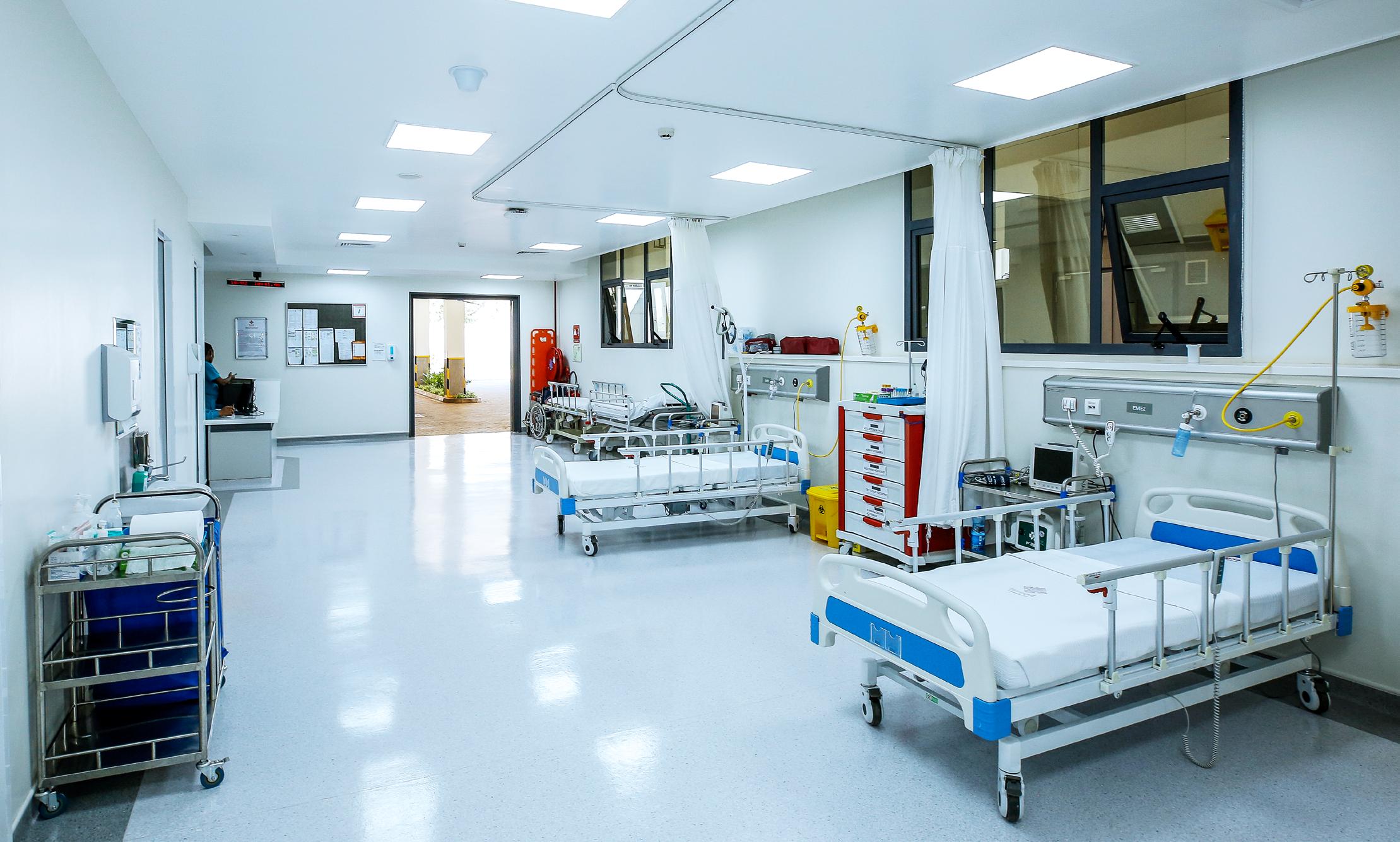
Recognizing the pivotal role of technology, AAR Hospital leverages it to forge closer connections with the community. Dr. Muma highlights, “Through technology, we can engage with patients even before their visit, from booking appointments to following up on their meal plans and preventive healthcare strategies.” This proactive engagement empowers patients and enhances their overall experience.
The integration of information into the

health system is paramount, with information technology and data playing crucial roles. Dr. Muma emphasizes, “Investing in technology is a significant undertaking, and practicality and usability for both patients and staff are vital considerations. Monitoring tools are essential for measuring the return on investment for these facilities.”
To remain at the forefront of innovation, collaboration becomes key. AAR Hospital actively seeks partnerships with like-minded individuals and institutions. Dr. Muma cites their current partnership with M-Tiba, stating, “By partnering with organizations such as M-Tiba, we can complete the cycle of care by bringing together insurance providers, payers, and healthcare providers on a single platform.” This collaboration fosters effective communication, builds trust, and enables the accomplishment of various initiatives to enhance the patient experience.
PROMOTING WELLNESS AND DIGNITY
AAR Hospital goes above and beyond in its efforts to promote the wellness and dignity of its patients. One notable aspect of this commitment is reflected in the thoughtful naming of its wards in Swahili. According to Dr. Muma, this decision serves a dual purpose that is both symbolic and
26 HEALTHCAREMEA.COM MAY/JUN 2023 | HEALTHCARE MIDDLE EAST & AFRICA
OUR FOCUS IS ON PROVIDING A COMPLETE HEALTHCARE SOLUTION FOR THE COMMUNITY, WHICH INCLUDES HOSPITAL CLINICS.
A SPECTACULAR VIEW OF AAR
EMERGENCY UNIT COMPANY FEATURE: AAR Hospital
WE STRIVE TO INTEGRATE THE HOSPITAL SEAMLESSLY INTO THIS COMPREHENSIVE VISION.
HOSPITAL'S
practical.
“First, it reinforces the hospital's African identity, making a powerful statement to competitors and investors,” Dr. Muma notes. By incorporating Swahili names, AAR Hospital embraces its cultural roots and proudly showcases its African heritage. This not only sets the institution apart but also sends a message of authenticity and connection to the local community.
“Secondly, the ward names are carefully chosen to promote wellness, happiness, and dignity, moving away from traditional associations with sickness,” Dr. Muma explains. Instead of relying on clinical terms or generic labels, AAR Hospital intentionally selects names that evoke positive emotions and convey a sense of dignity.
“These names create an environment that fosters a healing atmosphere and emphasizes the overall well-being of patients.”
The thoughtful naming of wards in Swahili at AAR Hospital reflects a unique approach to patient care. By embracing its African identity and choosing names that promote wellness and dignity, the hospital demonstrates its commitment to providing a holistic healing experience.
Dr. Muma emphasizes the hospital's patientcentered philosophy, stating, “Our hospital stands out because it was built with a patient-centered philosophy in mind. Unlike many other facilities that prioritize the convenience of care providers, our hospital was designed from the perspective of the patient.”
Dr. Muma further explains, “From the moment a patient walks in, we want them to feel dignified and cared for, even in their sickness. We have created a spacious and well-lit environment with soothing background music to promote a sense of wellness and comfort.”
The hospital's approach extends beyond treating sickness to focusing on nurturing the patients’ overall well-being. Dr. Muma highlights their belief in "compassionomics," which involves understanding the patient's experience and providing compassionate and holistic care.
Operational aspects also play a vital role in patient-centered care at AAR Hospital. Dr. Muma states, “One aspect is creating a welcoming and comfortable environment, free from the typical smells and clutter associated with hospitals. Our wards are designed to accommodate patients' relatives, allowing them to stay with the patient throughout their stay.”
Recognizing the value of communal
involvement, the hospital actively engages patients' relatives and guardians in the decisionmaking process.
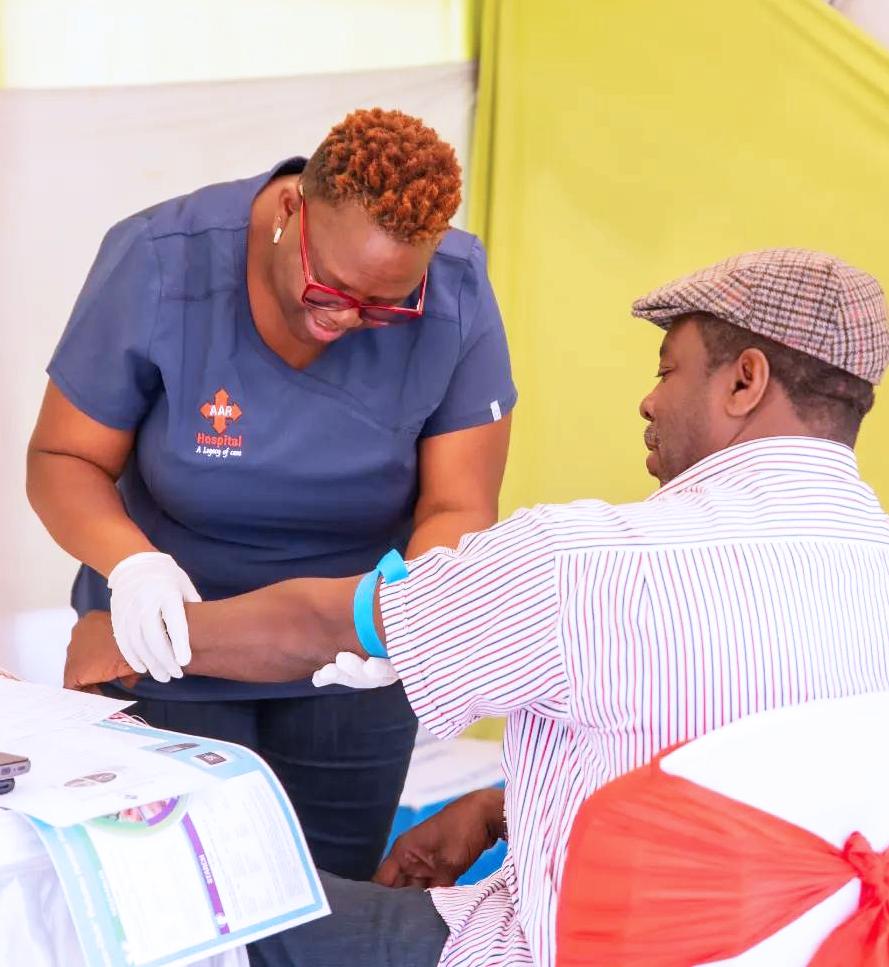
Dr. Muma emphasizes the importance of shared decision-making, stating, “We believe that involving relatives and guardians in decisionmaking leads to better outcomes and reduces potential litigation. Whether it's discussing a meal plan or making complex medical decisions, we strive to include patients, their relatives, and guardians in the decision-making process for their care.”
AAR Hospital's commitment to promoting patients' wellness and dignity encompasses both the physical design of the facility and the operational aspects of care delivery. By prioritizing the patient's experience and involving their loved ones in decision-making, the hospital fosters a compassionate and inclusive environment that goes beyond treating sickness to nurturing overall well-being.
EPITOMIZING THE POWER OF VALUES IN HEALTHCARE DELIVERY
At AAR Hospital, patient care is guided by a strong set of values that permeate every
HEALTHCAREMEA.COM MAY/JUN 2023 | HEALTHCARE MIDDLE EAST & AFRICA 27
AAR HOSPITAL'S NURSE TRIAGING A PATIENT FOR BLOOD PRESSUSRE VITALS DURING A PAST MEDICAL CAMP
aspect of the institution. The core principles of Compassion, Accountability, Professionalism, Integrity, Teamwork, Agility, and Efficiency form the foundation of the hospital's vision. According to Dr. Muma, these values extend beyond specific roles within the healthcare system.

Dr. Muma emphasizes, “We all have a significant responsibility towards patients, regardless of our roles within the healthcare system. Whether it's doctors, nurses, finance personnel, or even the cleaners, everyone contributes to the ultimate goal of achieving positive patient outcomes.” This inclusive approach highlights the collective commitment of every individual to delivering exceptional care.
Continuous learning and staying updated with the latest advancements and best practices are crucial for AAR Hospital. Dr. Muma states, “Therefore, it is essential to continuously seek knowledge and stay updated with the latest advancements and best practices. This ensures that we are delivering care in the most effective, efficient, and cost-effective manner possible.” By prioritizing ongoing education and embracing innovations, the hospital strives to provide the highest quality of care to its patients.
Ensuring transparency in hiring practices is another priority for AAR Hospital. Dr. Muma
emphasizes, “We focus on competence and ideas rather than external factors when selecting candidates. Thorough background checks are conducted to verify the integrity of potential hires.” By prioritizing merit and integrity, the hospital aims to build a trustworthy and capable workforce.
Investing in people is a fundamental aspect of AAR Hospital's approach. Dr. Muma explains, “We provide training to ensure they understand expectations and ethical guidelines. We have clear policies and reporting systems in place to address any ethical concerns or instances of fraud.” By empowering employees with the necessary knowledge and resources, the hospital fosters a culture of professionalism and ethical conduct.
Accountability is a vital component of AAR Hospital's governance structure. Dr. Muma describes the measures in place, stating, “Accountability is maintained through a governance structure, including board members and shareholders, as well as an independent audit committee. Internal audits are conducted to monitor and maintain controls.” These mechanisms ensure transparency and integrity in the hospital's operations.
The adoption of a paperless and cashless
28 HEALTHCAREMEA.COM MAY/JUN 2023 | HEALTHCARE MIDDLE EAST & AFRICA
COMPANY FEATURE: AAR Hospital
KENYA'S PRESIDENT RUTO VISITS ONE OF AAR HOSPITAL'S MATERNITY WARD DURING THE HOSPITAL'S OFFICIAL LAUNCH CEREMONY
system further enhances accountability and minimizes corruption risks. Dr. Muma highlights, “Adopting a paperless and cashless system helps minimize corruption by reducing the reliance on physical cash transactions. Reporting standards are upheld, and mechanisms are implemented to address and prevent repeat incidents of fraud, should they occur.” By leveraging technology and implementing robust controls, AAR Hospital upholds its commitment to ethical practices and financial integrity.
Through its values-driven approach, continuous learning, transparent hiring practices, investments in people, and strong accountability measures, AAR Hospital demonstrates its dedication to providing exceptional care while maintaining the highest standards of professionalism and ethical conduct.
TRIUMPHING OVER CHALLENGES AND SEIZING OPPORTUNITIES IN THE JOURNEY OF SUCCESS
In its nascent stages, AAR Hospital has encountered various challenges, including a tough business environment and economic constraints. Dr. Muma acknowledges the difficulties faced over the past two years, emphasizing the need to overcome these obstacles. He states, "We have focused on getting things started and overcoming initial hurdles."
One major challenge for the hospital is the implementation of sustainable practices. Dr. Muma highlights the financial investment required, stating, “Installing solar panels and establishing a water recycling plant involves significant financial investment.” Despite the financial challenges, AAR Hospital recognizes the importance of these investments for long-term environmental sustainability. Dr. Muma emphasizes the need to address resistance to change and encourage staff and individuals to actively participate in conservation efforts.
To facilitate sustainable practices, AAR Hospital has employed technological solutions. Dr. Muma suggests the use of automated lights that don't rely on manual switching as a way to substitute human behavior.
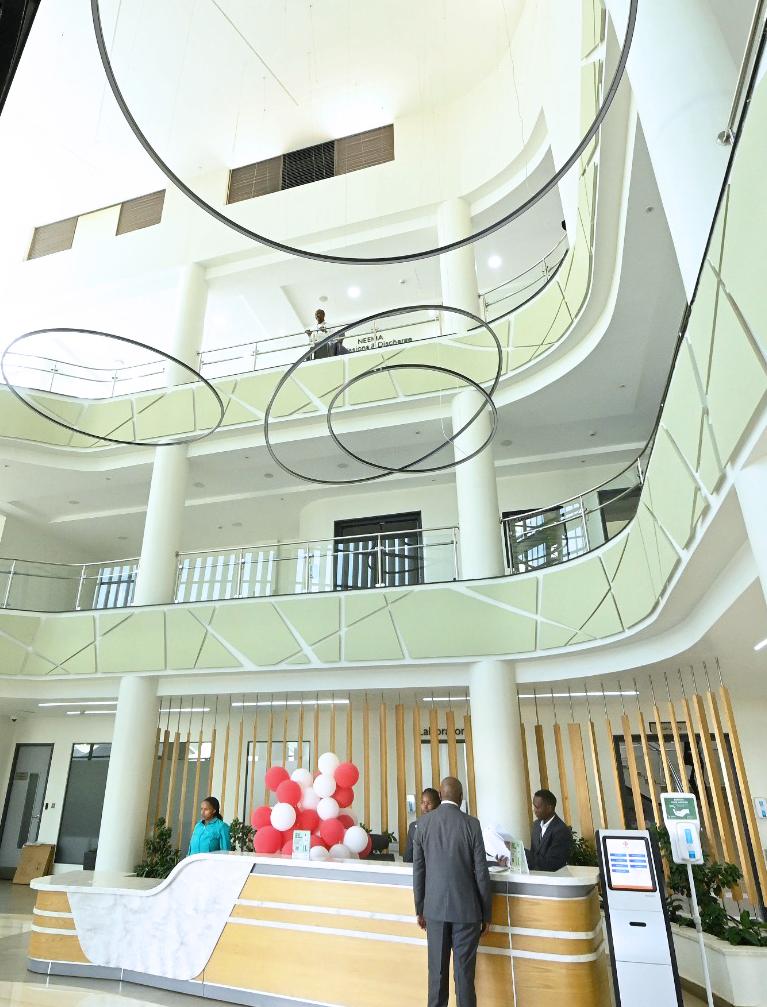
However, he admits that “it's important to consider that technological alternatives also come with their own costs and considerations. Balancing financial investment, human behavior, and technological solutions is necessary to achieve sustainable outcomes.”

AAR Hospital is committed to its growth and development despite the challenges it faces. The hospital is working towards obtaining AFC accreditation, a significant milestone that signifies approval from international bodies. Dr. Muma highlights the importance of this accreditation, stating, "This accreditation is crucial for us to establish a seal of approval for our services."
To achieve AFC accreditation, AAR Hospital recognizes the need to streamline processes and leverage technology. Dr. Muma emphasizes this point, saying, "We believe that streamlining processes and leveraging technology can help us achieve this goal." By optimizing operations and embracing digital advancements, the hospital aims to enhance its overall efficiency and effectiveness, aligning with its vision of providing exceptional healthcare services that meet global standards.
In addition to pursuing accreditation, AAR Hospital is exploring potential partnerships with SafeCare initiatives. Dr. Muma explains, “We are exploring the possibility of partnering with SafeCare initiatives to introduce safe care services by the end of this year.” This initiative demonstrates the hospital's commitment to expanding its services and meeting the
HEALTHCAREMEA.COM MAY/JUN 2023 | HEALTHCARE MIDDLE EAST & AFRICA 29
ACCOUNTABILITY IS MAINTAINED THROUGH A GOVERNANCE STRUCTURE, INCLUDING BOARD MEMBERS AND SHAREHOLDERS, AS WELL AS AN INDEPENDENT AUDIT COMMITTEE.
IN NUMBERS
evolving needs of its patients.
The hospital acknowledges the significance of global standards and accreditations. Dr. Muma highlights that these certifications establish trust and credibility, enabling meaningful engagements with various stakeholders.
He states, “Being accredited by these global standards allows us to establish relationships with other institutions and bodies, some of which require specific certifications to engage in business or collaborate with us.”
AAR Hospital's dedication to quality and excellence is evident through the certifications received by several clinics within the organization.
Dr. Muma proudly mentions, “Several clinics within our organization have already received certifications, totaling around four or five clinics.” These certifications not only instill quality processes but also enhance the hospital's reputation as they are recognized and approved by external bodies.
As AAR Hospital strives for growth and development, its pursuit of AFC accreditation, partnerships with SafeCare initiatives, and adherence to global standards reflect its commitment to providing exceptional healthcare and establishing itself as a trusted institution in the industry.
SUSTAINABLE SOLUTIONS: AAR HOSPITAL'S INITIATIVES FOR A GREENER AND HEALTHIER FUTURE

As a member of the Muthaiga North Residents' Association, AAR Hospital is deeply committed to environmental sustainability and community engagement. Driven by their vision of creating a greener future, they have implemented various initiatives that promote good environmental practices.
Dr. Muma highlights one of their key accomplishments, stating, “We have implemented solar energy generation, which covers about 20 to 30% of our energy needs. This helps reduce our reliance on non-renewable energy sources.” By harnessing the power of solar energy, AAR Hospital takes an important step toward minimizing its environmental footprint.
In addition to its solar energy project, AAR Hospital has also prioritized water conservation through its innovative water recycling plant.
Dr. Muma explains, “We have a water recycling plant that treats greywater, enabling us to reuse it for gardening purposes. This practice allows us to conserve water resources.” By responsibly managing water usage, AAR Hospital actively
contributes to sustainable water management. Taking its commitment further, AAR Hospital has implemented a facilities checklist to train their staff on responsible practices within their spaces. Dr. Muma notes, “Last year, we introduced a facilities checklist to train our staff on responsible practices such as shutting down laptops, switching off lights, and promptly reporting any leaks or malfunctioning equipment.” By fostering a culture of responsibility, AAR Hospital ensures that everyone plays a part in their sustainability efforts.
Beyond its premises, AAR Hospital actively collaborates with the local community and engages its staff to extend their positive impact. Dr. Muma emphasizes, “We aim to honor Wangari Maathai's legacy by actively participating in initiatives related to conservation, such as preserving the nearby Karura Forest. As we continue to grow, we aspire to make a meaningful difference in our neighborhood and beyond.”
Through community engagement, AAR Hospital strives to create lasting environmental change and contribute to a healthier ecosystem.
AAR HOSPITAL'S UNWAVERING OPTIMISM IN KENYA'S HEALTHCARE INDUSTRY
Despite the challenges inherent in the healthcare industry, AAR Hospital's CEO, Dr. Muma, remains optimistic about the future prospects for healthcare in Kenya. Recognizing the potential for
30 HEALTHCAREMEA.COM MAY/JUN 2023 | HEALTHCARE MIDDLE EAST & AFRICA
COMPANY FEATURE: AAR Hospital
OF
BEDS
HOSPITAL
NUMBER
ICU
AT AAR
12 A VIEW OF AAR HOSPITAL'S
DIALYSIS UNIT
KIDNEY
growth and innovation, he envisions a promising path ahead for the organization.
Dr. Muma acknowledges the evolving landscape, stating, “In the past, our focus was on improving access to care, followed by a shift towards quality. However, the challenge arose when quality was pursued without considering the associated costs, which does not define
value.” He emphasizes the importance of finding a balance between providing quality care and being mindful of costs to ensure sustainable funding without burdening patients financially.
Technology emerges as a key enabler in achieving this balance, as Dr. Muma explains, “Technology can play a crucial role in achieving this balance by leveraging the knowledge we have gained over the past few decades.” By leveraging technological advancements, AAR Hospital aims to deliver cost-conscious healthcare without compromising on the defined parameters of quality.
Dr. Muma's optimism extends beyond technological advancements. He observes a growing interest and investment in the healthcare space in Kenya, which further reinforces the potential for improvement. He states, “I am optimistic about the future and the progress we can make in delivering cost-conscious healthcare within defined parameters of quality.”
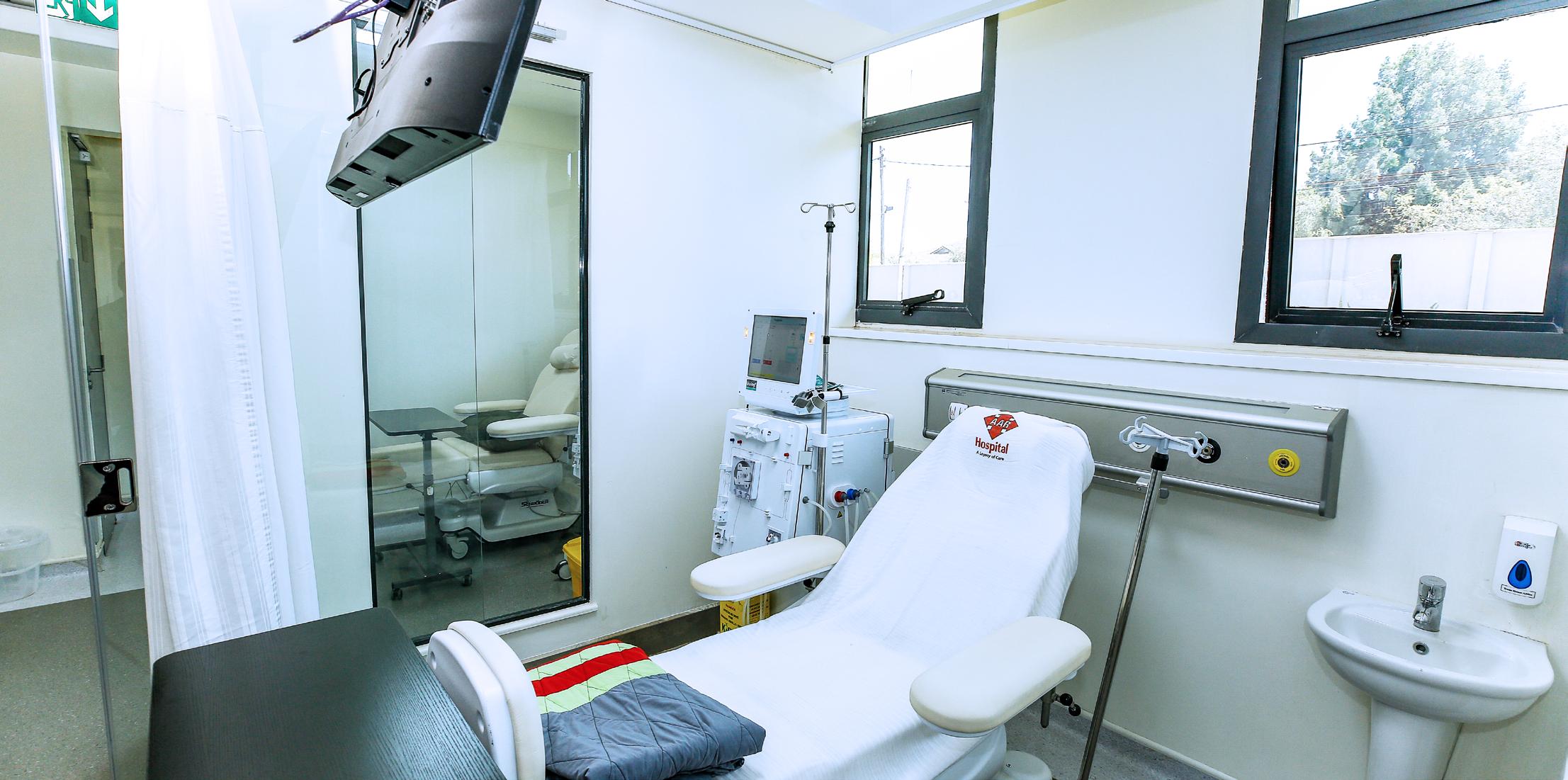
Looking ahead, AAR Hospital has ambitious plans to expand its reach and services. Dr. Muma shares, “Our future plans involve doubling the number of clinics and potentially expanding with additional hospitals. The goal is to create a comprehensive network where patients can access a wide range of healthcare services under one roof, fostering a sense of community and convenience.”
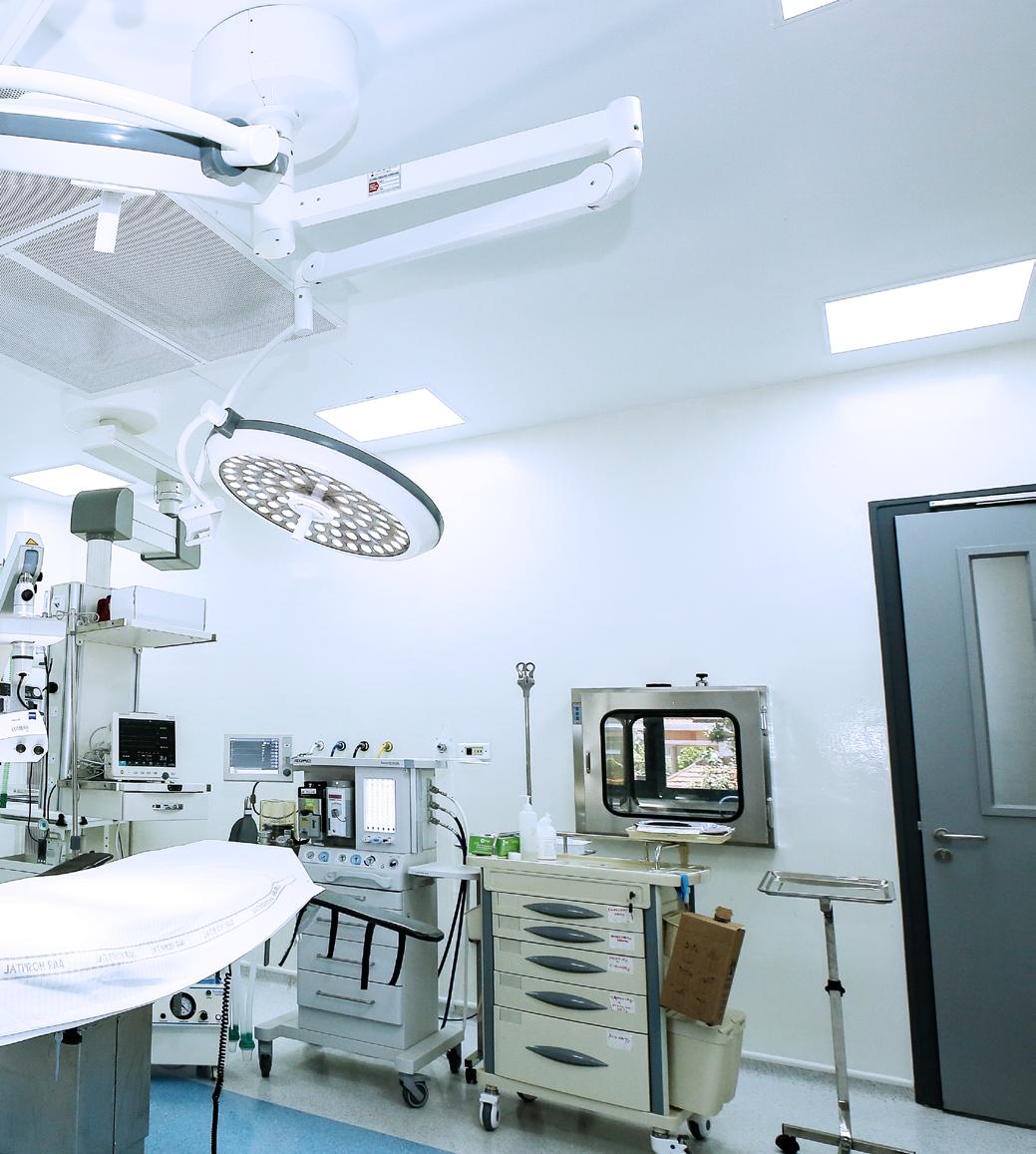
HEALTHCAREMEA.COM MAY/JUN 2023 | HEALTHCARE MIDDLE EAST & AFRICA 31
INSIDE VIEW OF AAR HOSPITAL'S ULTRA MODERN OPERATION THEATER
REMEDIAL HEALTH
Digitizing the pharmaceutical supply chain
By LORRAINE ABWAO
In an exclusive interview with Healthcare
Middle East and Africa Magazine, Samuel Okwuada, the CEO of Remedial Health, provides a captivating glimpse into the potential of his YC-backed startup to revolutionize healthcare delivery in Africa. Combining his expertise as a pharmacist with his self-taught software engineering skills, Okwuada sheds light on how Remedial Health aims to bridge critical gaps in the healthcare sector using technology and evidence-based data. With a strong focus on Nigeria and beyond, this young and dynamic startup is determined to make a meaningful impact on communities through its innovative approach.
EMPOWERING PHARMACIES AND HOSPITALS WITH INNOVATIVE SOLUTIONS
In the fast-paced world of healthcare, Remedial Health has emerged as a game-changer, providing pharmacies and hospitals with cuttingedge technology solutions to streamline their operations. Samuel Okwuada, the visionary behind Remedial Health, sheds light on their key service offerings and how they are revolutionizing the way medical businesses function.
At the core of the Remedial Health platform lies a powerful software solution, aptly named
the remedial platform. Okwuada explains, "The remedial platform is software that can be installed on the computer in your pharmacy, offering comprehensive features such as inventory management, business analytics, and auto-replenishment." This sophisticated software acts as a point-of-sale (POS) system, enabling seamless processing of payments for products and services.
Recognizing the diverse needs of the healthcare industry, Remedial Health also offers a convenient mobile app. Okwuada elaborates, "The Remedial mobile app serves as an alternative for pharmacies that do not have a desktop computer on their premises." This mobile app provides easy access to the same powerful software features, empowering pharmacies to manage inventory, place orders, and cater to the needs of their patients efficiently.
With Remedial Health, pharmacies and hospitals gain access to a vast range of pharmaceutical products. Okwuada emphasizes, "You can use the Remedial mobile app to place orders for various medical supplies, including antimalarials, pain relief medication, surgical products, and more." Their swift delivery system ensures that wholesale goods are promptly replenished, allowing healthcare providers to
32 HEALTHCAREMEA.COM MAY/JUN 2023 | HEALTHCARE MIDDLE EAST & AFRICA

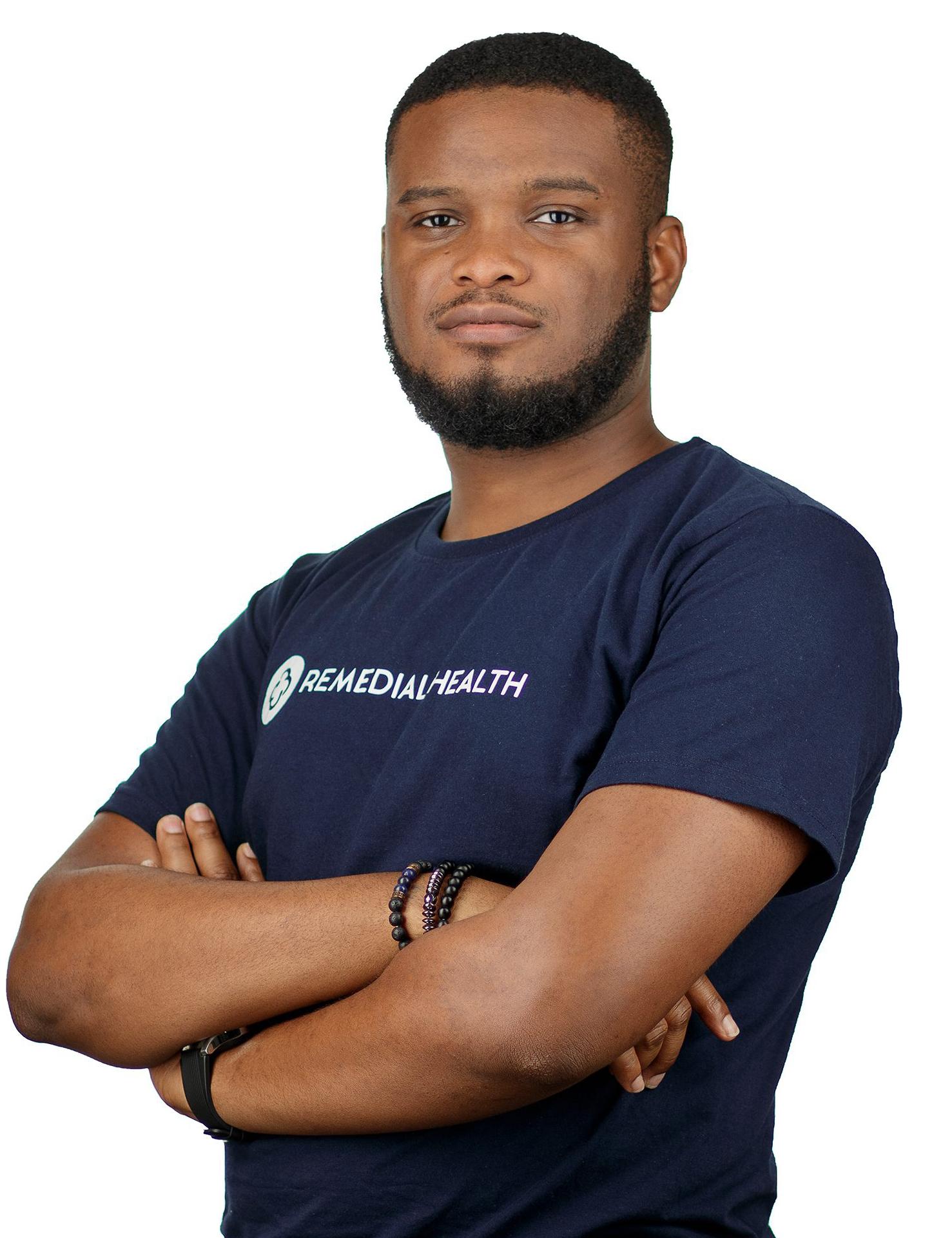 SAMUEL OKWUADA CEO, Remedial Health
SAMUEL OKWUADA CEO, Remedial Health
serve their patients without disruptions.
Furthermore, Remedial Health goes beyond inventory management by offering inventory financing. Okwuada explains, "Pharmacies can purchase pharmaceutical products they need via the mobile app and sell them to patients before paying back for the services." This innovative approach not only supports business growth but also fosters financial stability for healthcare providers.


In addition to its comprehensive software solutions, Remedial Health plays a pivotal role in facilitating market access for foreign companies aiming to enter the Nigerian market. Okwuada emphasizes, "We assist foreign companies with market access and provide valuable data to pharmaceutical manufacturers, enabling them to make informed decisions." This collaborative approach fosters a vibrant ecosystem where stakeholders can thrive and contribute to the advancement of healthcare in Nigeria.
To learn more about Remedial Health and the full range of services they provide, visit their official website at remedial. health or remedial.com.




ON A MISSION TO AVAIL GENUINE MEDICINES AT FAIR PRICES
At the heart of Remedial Health's mission lies the recognition of a significant gap in the health sector in Africa. Okwuada emphasizes, "One of the crucial components of healthcare is medicine. So, the question arises: How do you get medicines from manufacturers down to patients in supply chains?" This simple yet profound inquiry sets the stage for Remedial Health's transformative solutions.
The drug supply chain in Africa grapples with a multitude of obstacles that hinder effective healthcare delivery. Okwuada identifies traceability issues, the prevalence of counterfeit products, and the exorbitant pricing of medicines as the primary challenges impeding progress. These critical issues necessitate innovative interventions to ensure the availability of genuine pharmaceutical products and fair pricing for patients.
Remedial Health rises to the occasion by leveraging technology to establish a traceable supply chain in Africa. Okwuada explains, "We are making sure that there is a traceable supply chain in Africa by leveraging technology to deliver quality, genuine pharmaceutical products." Through their pioneering efforts, Remedial Health seeks to eliminate the scourge of counterfeit medicines that infiltrate the supply chain, protecting patients from potential harm.
To ensure the utmost integrity and adherence to regulatory standards, Remedial Health has obtained regulatory approvals from esteemed bodies in the country. Okwuada proudly declares, "We have received regulatory approvals from various esteemed organizations, including the National Agency for Food and Drug Administration and Control (NAFDAC), the Pharmacists Council of Nigeria (PCN), the Pharmaceutical Society of Nigeria (PSN), the Association of Community Pharmacists of Nigeria (ACPN), as well as the Federal Ministry
34 HEALTHCAREMEA.COM MAY/JUN 2023 | HEALTHCARE MIDDLE EAST & AFRICA
USER INTERFACE OF REMEDIAL HEALTH DIGITAL APP
COMPANY FEATURE: Remedial Health
LEFT: VICTOR BENJAMIN, COO, REMEDIAL HEALTH RIGHT: SAMUEL OKWUADA, CEO, REMEDIAL HEALTH
of Health."



The impact of Remedial Health's efforts is already evident. Okwuada reveals, "In 2022, we sold over 100 million individual packs of medicines across Nigeria." This remarkable achievement is a testament to the dedication and effectiveness of Remedial Health in ensuring that only genuine and quality medicines enter the supply chain and consumer market.
As Samuel Okwuada looks to the future, his vision extends beyond Nigeria. He aims to combat the circulation of counterfeit medicines not only within Nigeria but also across Africa. By doing so, Remedial Health seeks to elevate healthcare standards and improve access to safe and affordable medicines throughout the continent.
REVOLUTIONIZING HEALTHCARE THROUGH TECHNOLOGY AND COLLABORATION
In the ever-evolving landscape of healthcare, Remedial Health stands at the forefront, driven by a passion to transform the medicine supply chain in Africa. With a deep understanding of the healthcare market, Okwuada acknowledges,
"Despite the competitive nature of this digital space, the healthcare market is massive, and there are still huge opportunities to tap into." He
emphasizes that Remedial Health possesses one of the best approaches for distributing medicines in Africa, evident from its rapid growth since its launch. This success story validates their technology-based approach, which sets them apart from competitors.
While Remedial Health operates in the healthcare industry, Okwuada highlights, "We don't think of ourselves as a health business. We think of ourselves as a technology business first." This unique perspective underlies their core identity as innovators, leveraging technology to address supply chain challenges in the pharmaceutical industry across Africa. Their relentless pursuit of technological solutions enables them to outpace competitors, propelling their growth and impact.
Reflecting on their distinctiveness, Okwuada shares, "Our technology massively differentiates us from other digital pharmacy companies in the region. Remedial Health's approach to sourcing and distributing medicines is completely different from the competition." By harnessing technology and optimizing its processes, Remedial Health ensures efficiency and effectiveness in its operations, enhancing its ability to serve a larger customer base.
Collaboration lies at the heart of Remedial Health's success. Okwuada explains, "We are a B2B platform, selling medicine wholesale to other businesses in Nigeria." Currently, they have established partnerships with six B2B pharmacies, which rely on Remedial Health for sourcing medicines and procuring cutting-
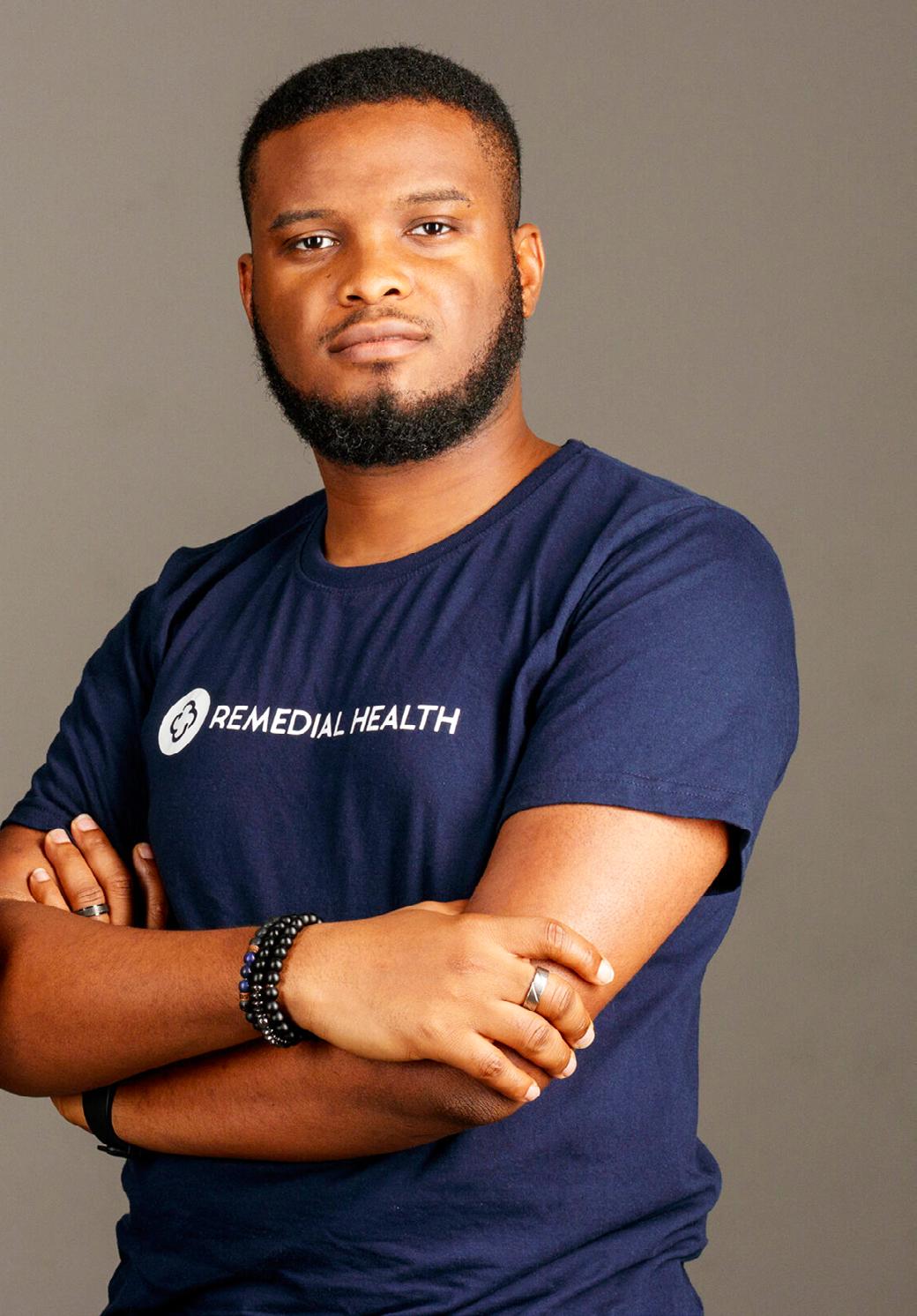
HEALTHCAREMEA.COM MAY/JUN 2023 | HEALTHCARE MIDDLE EAST & AFRICA 35
DESPITE THE COMPETITIVE NATURE OF THIS DIGITAL SPACE, THE HEALTHCARE MARKET IS MASSIVE, AND THERE ARE STILL HUGE OPPORTUNITIES TO TAP INTO.
Samuel Okwuada - CEO, Remedial Health
edge technology. Furthermore, a collaboration with Stallion Advisory, a healthcare consulting company backed by the Bill & Melinda Gates Foundation, exemplifies their commitment to impactful partnerships.



Looking ahead, Okwuada expresses their eagerness to explore opportunities for collaboration with entrepreneurs in healthrelated startups within their target markets. By forging strategic partnerships, Remedial Health seeks to synergize efforts, drive innovation, and amplify its impact in the healthcare industry.
The implementation of the African Continental Free Trade Area agreement holds great promise for Remedial Health's expansion plans. Okwuada states, "We are closely watching the implementation of the agreement, as it is expected to ease the movement of pharmaceutical goods between African countries and reduce the prices of medicines across the continent." This development aligns perfectly with Remedial Health's mission, enabling them to scale its operations and launch into multiple countries, making a greater impact on healthcare access.
Proudly highlighting a significant milestone, Okwuada shares, "In 2022, Remedial Health was selected to join the prestigious Y Combinator accelerator, known as the Harvard of technology startups." This achievement not only validates their innovative approach but also provides invaluable mentorship from accomplished
technology entrepreneurs. “Acceptance into Y Combinator serves as a stamp of approval, reinforcing their commitment to tackling a vital problem in the healthcare industry,” he explains.
REIMAGINING THE PHARMACEUTICAL SUPPLY CHAIN AND STAMPING OUT COUNTERFEITS IN AFRICA
Talking about the inspiration behind establishing Remedial Health, Samuel Okwuada, the driven CEO, shares his personal journey. He recounts, "I grew up in Nigeria and moved to the United Kingdom for higher studies. After completing an international Master's degree in Pharmacy, I made the decision to set up a pharmaceutical import business."
Reflecting on the challenges faced, he adds, "We would source medical products from India and sell them in Nigeria's highly disorganized pharmaceutical market, dominated by numerous middlemen and improper storage of medicines."
The turning point came during the first wave of the global COVID-19 pandemic when hospitals sought direct assistance due to the closure of pharmaceutical markets under lockdown measures. Okwuada reveals, "Hospitals started reaching out to us for sourcing medicines, given the constraints imposed by the containment measures." This critical situation became the catalyst for Okwuada and his team to take action and address the access-to-medicine challenges faced during Nigeria's lockdowns.
Driven by a desire to transform the pharmaceutical supply chain, Okwuada explains, "We took the opportunity to sanitize the supply chain by establishing direct connections with manufacturers and selling products directly to pharmacies and hospitals." In Okwuada's own words, "We are not only reimagining the pharmaceutical supply chain but also helping to get rid of counterfeits in Africa."
The magnitude of the counterfeit medicine problem is alarming. Okwuada cites the World Health Organization's estimate that approximately 30 percent of all medicines sold on the continent are counterfeit. In light of this sobering statistic, Remedial Health has taken up the mantle to tackle this issue head-on.
"At Remedial Health, we are digitizing the pharmaceutical supply chain in Africa," Okwuada proudly declares. Their efforts go beyond simply providing software solutions for pharmacies and hospitals. They are actively working to strengthen the medical supply chain and enhance inventory financing, ensuring a streamlined and efficient

36 HEALTHCAREMEA.COM MAY/JUN 2023 | HEALTHCARE MIDDLE EAST & AFRICA
COMPANY FEATURE: Remedial Health
process.
A BEACON OF THE TRANSFORMATIVE POWER OF VALUES-DRIVEN ENTREPRENEURSHIP

In the heart of Remedial Health's operations lie a set of core values that guide their every endeavor. Samuel Okwuada, the visionary CEO, opens up about these guiding principles and their significance within the organization.

With unwavering conviction, Okwuada asserts, "The core values of our organization are integrity, innovation, and entrepreneurship. Above all else, we place integrity at the forefront of all our operations at Remedial Health." This steadfast commitment to integrity forms the bedrock of their approach to business and shapes their interactions with stakeholders at every level.
As the company continues to grow rapidly, with a workforce of over 130 employees, Okwuada shares a valuable piece of advice. He encourages individuals to embrace a business mindset, urging them to think critically about their actions and decisions. He explains, "We believe that the more straightforward and transparent we are, the better it is for everyone involved. I often remind people to ask themselves, 'What would you do differently if it was your business and you needed it to succeed?'"
In their relentless pursuit of excellence, Remedial Health draws inspiration from global pioneers in various fields. Okwuada cites luminaries such as Bill Gates for philanthropy, Mark Zuckerberg for innovation, and Aliko Dangote for business acumen. Such inspiration fuels Remedial Health's drive to redefine healthcare delivery through the seamless fusion of technology and compassion. These role models serve as beacons of inspiration, guiding Okwuada in his pursuit of excellence and success.
TRANSFORMING HEALTHCARE DELIVERY AND EXPANDING HORIZONS

Looking ahead, Remedial Health envisions broader horizons, extending its impact beyond Nigeria. Okwuada shares, "We are exploring opportunities to open a new hub in another African country as part of our expansion plans." By tapping into the vast potential of African markets, Remedial Health aims to catalyze positive change and establish a pan-African network of healthcare innovation.
With a diverse portfolio, Remedial Health operates through two subsidiaries in Nigeria. Okwuada explains, "We have Remedial
Health Solutions Limited, which specializes in offering software and supply chain solutions, and Kessington Global Synergy, dedicated to providing private label medicines." This comprehensive approach allows Remedial Health to cater to various aspects of healthcare delivery, from innovative technology solutions to quality pharmaceutical products.
While Remedial Health's operations span 26 states in Nigeria, its main hub is strategically located in Lagos State, the commercial capital of the country. However, the company is not content with resting on its laurels. Recently, Remedial Health established two additional hubs—one in Northern Nigeria and another in the Federal Capital Territory. Okwuada states, "These hubs are instrumental in expanding our pharmaceutical business into new states across the country, ensuring wider access to our products and services."
The company is actively considering Senegal, Ivory Coast, Cameroon, Kenya, Egypt, and other African nations as potential target markets. Leveraging the knowledge and expertise of global investors who have already invested in these markets, Remedial Health seeks to make informed decisions and forge successful partnerships
HEALTHCAREMEA.COM MAY/JUN 2023 | HEALTHCARE MIDDLE EAST & AFRICA 37
REMEDIAL HEALTH AGENT DELIVERING A CONSIGNMENT TO A CLIENT
DR. JOAN RUGURU KIMANI: Medical Intern and WINNER OF TOP 35 UNDER 35 Youth of the Year Award in Health Services Category
By JACKIE MBITHE
HCMEA: Give us a brief profile about you and a summary of some things that you'd like people to know about you.
DR RUGURU: I am currently practicing as a medical intern at the Karen Hospital. I also run a blog, called Exciting Parenting where I mostly write about child health and parenting. I've been writing for the last six years. I have grown up in a big family, I am the firstborn of six children. I consider myself half human, half amazing.
HCMEA: About your blog Exciting Parenting, when did it start and what gaps were you trying to fill in the industry?
DR RUGURU: I began the Exciting Parenting blog in 2016 to give new parents information about parenting and child health. Some of the things you see with children at home unless you are having a place where you're getting information, especially for first-time parents, it's very easy to make mistakes.
The beginning of the blog was through mentorship by one of my friends who is called Kimani Patrick. He is the CEO of Carlstic where he helps businesses to connect & engage with their stakeholders. I also get a lot of support from my mum and my family at large, who have helped me a lot with my blog content since I am not a parent yet.
My lecturers at Jomo Kenyatta University of Agriculture and Technology (JKUAT), Dr Patrick Mburugu, who is also a consultant Paediatrician at Thika Level V Hospital, and Dr Justus Simba, who also acts as a consultant Paediatrician/ Respiratory Specialist, have also been very influential.
HCMEA: Are you able to tell the impact or quantify the impact it has had from 2016 to date?
DR RUGURU: It started as a free blog, ideally it was a WordPress site. With time we were able to move it to a self-hosted site, which is a bit more efficient. That was a milestone and had a big impact on me because most people end up sticking around with the free websites that are not as accessible and as versatile as the selfhosted ones.
I have also received a lot of feedback, so this comes as messages to my dm or people that, you know, look for me and reach out and give me feedback regarding the kind of change they've been able to achieve regarding their parenting and their child health.
Also, my numbers keep rising. People are reading and sending the link and articles to other people. Them coming back also shows that people are following up on your work and that they are enjoying and learning from it.
I measure, my impact not in terms of monetary gain because my blog is a pro bono project, I don't charge people to read my content, but seeing how much I have been able to impact people directly is what moves me.
HCMEA: Is running the blog a one-woman show or do you have a team that you work with?
DR RUGURU: I have a team. I'm the chief executive officer. I have two website managers who manage it constantly and make sure it is up and running. I have an editor who helps build up the content that I come up with. I also work with a tailor because sometimes we come up
38 HEALTHCAREMEA.COM MAY/JUN 2023 | HEALTHCARE MIDDLE EAST & AFRICA

with merchandise for when we need companybranded clothes.
HCMEA: Are there any challenges that you have encountered while running the blog?
DR RUGURU: The first main challenge I experienced was convincing people and getting confidence from people that they knew what I was doing. People are very concerned about me not being a parent and being young. It was difficult to try and get people to respect me. That was a pretty big thing that people felt I was probably not experienced enough to give out such information.
But I feel like what I experience is not necessarily what you will also experience. What stood out for me is that I was having a lot of research, gathering a lot of information from different kind of people, and condensing it all together into one platform. I tried to create an SI unit of what I believe is the right way of doing things.
The other problem is having time to create content when I was a student since all the content that is on the blog, I write it myself. I had to ensure that I make time, make enough content, standardize my content, and ensure that people who come to read my work because of how I write keeps coming back. For me, time management and having that constant imposter syndrome of me not being sure about my content was a major problem.
HCMEA: And how did you work around it?
DR RUGURU: I worked around it by being very confident because I knew I was churning out quality content. Being consistent and feeding off my readers’ feedback helped me out.
HCMEA: You seem confident in what you're doing, like the speech you delivered on your graduation day in front of the PhD graduates. What are some of the insights you can share on the importance of being confident?
DR RUGURU: I feel like confidence is most times inherent where people are just naturally confident. But for most people, it comes from repeated self-affirmation, and repeated support from parents and teachers.
I was very lucky to come from a home where I was constantly affirmed and supported regarding what I was doing. For example, when I started my blog, I started it with KSh3000 (US$23.11) which I got from my parents. If I didn't have that KSh3000 (US$23.11) at that point, I wouldn't be having a blog six years later.

It reached a point where as an adult you also have to feed yourself with good energy like surrounding yourself with good friends who constantly help you pick yourself, and mostly also trusting in God. Because I believe some of these things you need, like you, need extra power, and am a firm believer in God, so you need extra power to help you stand in front of people, to help you read out your speeches in front of very many people on the television or like in my case, in front of Ph.D. graduates.
I believe as parents are bringing up the
40 HEALTHCAREMEA.COM MAY/JUN 2023 | HEALTHCARE MIDDLE EAST & AFRICA
DR. RUGURU KIMANI DISPLAYING HER AWARDS DURING THE TOP 35 UNDER 35 EVENT.
EXECUTIVE INTERVIEW: Dr. Joan Ruguru Kimani
children. They need to support their children, they also need to give them social support, and take them to good schools. Also, research for content that helps you to become confident. Even if it takes you to consult a self-image expert, do it. Confidence is the key to many opportunities.
HCMEA: What can you say is digital space’s potential for the business?
DR RUGURU: We are getting to a point where things regarding child health and parenting were initially on autopilot mode. Nobody cared whether they need to seek professional help or seek professional advice or even lead and invest in parenting.
We're going with the trend where people want to do things right and seek help. People want to see therapists and doctors more concerning child health. People go to check-ups all the time. I think we will get to a point where the online space and regard to childhood parenting are going to grow very big. I'm very optimistic about the blog and how it's going to go and about us being successful when it comes to transitioning slowly into working with people in personal care.
HCMEA: In regards to digital space and digital health, is there a way that exciting parenting is helping parents to help children maintain a balance of how they use digital tools and also to maintain good health?
DR RUGURU: I'm a big supporter of children becoming exposed to digital content because we are getting to a point where a lot of learning is
taking place through the online space. If it's a drawing children are drawing through online templates, if it is writing compositions they can learn a lot from the internet.
I feel like we're at a point where we can’t completely write off the digital platforms for children because we are seeing a lot of creativity in the online space. Their talents are being nurtured in the online space and they are doing their assignments online.
All we have to do is ensure that the children are well-monitored when accessing the Internet. That means even the timelines, and how long they are playing games. Games are good, but for how long are they playing that game? what game is it? If they are watching movies, for how long and what kind of movies are they? They need exposure to the online space, but we need to monitor what they're doing with the online spaces and for how long the activities are taking place.
HCMEA: Tell us about being listed on Forbes Africa’s 30 Under 30 DR RUGURU: The Forbes Africa 30 Under 30 came as a surprise to me. It is one of the things that you only see people get into, those goals that you always wish to reach when you get to such a point in life. Till now, it's still very surreal. Especially when I wake up in the middle of the night and remember that I made it to Forbes under 30.
It's good to see that my work which is full of consistency and impact was recognized in the international sphere, giving me more motivation,

HEALTHCAREMEA.COM MAY/JUN 2023 | HEALTHCARE MIDDLE EAST & AFRICA 41
THE STARTUP COST OF DR. RUGURU'S BLOG IN NUMBERS US$ 23
I FEEL LIKE WE'RE AT A POINT WHERE WE CAN’T COMPLETELY WRITE OFF THE DIGITAL PLATFORMS FOR CHILDREN BECAUSE WE ARE SEEING A LOT OF CREATIVITY IN THE ONLINE SPACE. THEIR TALENTS ARE BEING NURTURED IN THE ONLINE SPACE AND THEY ARE DOING THEIR ASSIGNMENTS ONLINE.
more encouragement to keep going on, and to keep helping people by educating them when it comes to child health. It was a dream come true.
I felt a shake and a break in the current market where it gives me a bit more recognition and I've been headhunted for a couple of opportunities in the country and globally. But according to how the medical profession works, you need to, first of all, finish your internship to be able to do things the right way. I'm glad that it's exposed me to greater opportunities and I can see the future will be very bright.
HCMEA: Are there any projects that you've embarked on since that moment?
DR RUGURU: I am actively working on taking my work down to the ground because I've been having my work online for the last couple of years. Am trying to convert my projects to have a direct impact and physical connection with my readers because not everybody has access to using the internet.
If I could be able to reach those in mashinani (rural areas) who are not able to have internet, it
going to be good because some of these things, despite only talking about them, online you also want to show people and teach them practically. I am currently seeking funding opportunities to be able to expand my online venture into a physical and on-the-ground venture.
HCMEA: When are you planning to move to mashinani?
DR RUGURU: Hopefully, by the end of the year, I will be having a solid plan and a solid structure around my work with people down the villages, with other professionals who are ready to offer their services to teach them and engage them.
If things and the stars align properly regarding the funding opportunities that I'm looking out for, I think I could be able to do it.
HCMEA: Are there any other expansion plans you have as a business? Are you exploring any massive collaborative collaborations? And have you identified any partners that you want me to partner with to ensure that your goal going forward?
DR RUGURU: We haven’t closed any partnership opportunity completely yet So there are no names that I can give at this point. But if the partnerships and funding opportunities come into play, we are going to do a very good job in Kenya and Africa.
The partnership or collaboration will entail funding to be able to expand and involve healthcare professionals in that exact space. Because we need counsellors, physiotherapists, other doctors, nutritionists, sleep trainers, and people who are going to help women in breastfeeding.
We need a lot of people on board to be able to guide parents on how to wholesomely bring up a child right. It's a structured program that would need a lot of planning and a couple of people on board.
HCMEA: Any other service that you offer except being a medic and a blogger?
DR RUGURU: I do mentorship because I know once a youth has a torch burning, you want to help others light their ways. I've been able to be involved in a couple of mentorship opportunities, be it the youth in high schools, in universities, or those who work. I also want to strengthen that aspect since that what I have achieved so far has helped other young people work on their projects, become confident and achieve good things

42 HEALTHCAREMEA.COM MAY/JUN 2023 | HEALTHCARE MIDDLE EAST & AFRICA
EXECUTIVE INTERVIEW: Dr. Joan Ruguru Kimani
DR. RUGURU KIMANI PERFORMING A SURGICAL PROCEDURE ALONGSIDE DR. LANCE MAYABI AT THE KAREN HOSPITAL






• Pharma manufacturing equipment and solutions • Pharma packaging solutions • Pharmacy chains and chemists • Human pharmaceutical drugs and related products • Construction, plant and infrastructure installations • Utilities and support services and equipment • Refrigeration, HVAC systems • Renewable Energy & Sustainability solutions • And many more new technologies and solutions WHAT’S ON SHOW? www.africahealthexpo.com +254 725 343932 info@fwafrica.net A SPECIAL PAVILION AT Expo Pharma Africa Visa Oshwal Centre, Nairobi, Kenya THE BIGGEST PHARMA SUPPLIES & NEW TECHNOLOGIES EXPO IN EASTERN AFRICA OCTOBER 5-7, 2023
 DR. ANGELA MURIUKI Director, Women's Health - FIND
DR. ANGELA MURIUKI Director, Women's Health - FIND
FIND

Taking the fight against cervical cancer to its doorstep

 By PETER NGIGE
By PETER NGIGE
In the ongoing battle against cervical cancer, FIND emerges as a global force dedicated to creating a new alliance for affordable and accessible diagnostic tools. Headquartered in Geneva, Switzerland with a presence in many lowand middle-income countries, FIND is a non-profit global health organization that operates as a product development partnership, collaborating with over 150 partners to facilitate the development, evaluation, and implementation of diagnostic tests for poverty-related diseases.
Through its relentless collaborations and efforts, FIND ensures the availability of diagnostic tools for tropical and neglected diseases. Their newest program, launched in 2021 and led by Dr. Angela Muriuki, is on Women’s Health, which currently focuses on high-performance HPV testing. This crucial program aims to confluence efforts to combat cervical cancer by 2030.
Dr. Muriuki's work at FIND revolves around partnering with the right individuals and organizations to improve access to diagnostic technologies that significantly impact women's and girls' health. She elaborates, "For women's health, our approach is to improve the availability of new technologies that target conditions disproportionately affecting or uniquely impacting women. We also prioritize building coalitions and partnerships with those most affected by the disease, those who bear the greatest burden."
Dr. Muriuki explains the key strategies employed by FIND to enhance access to diagnostics in women's health: "Firstly, we focus on researching and implementing new technologies that address specific needs and challenges faced by women, targeting conditions that have a significant impact on women's health." By involving affected individuals and communities in the development of their approaches, FIND ensures that their solutions are relevant and effective.
The importance of collaboration with governments is paramount in FIND's work. Dr. Muriuki emphasizes, "We work closely with government agencies to inform and contribute to screening targets, identify gaps in healthcare provision, and prioritize areas for improvement." This collaborative effort allows FIND to develop costed strategies that enhance access and availability of diagnostics at all levels of care, including
self-testing.
Self-testing plays a vital role in FIND's mission, not only for HPV, but also other diseases such as diabetes. Dr. Muriuki highlights its significance, stating, "Self-testing allows individuals to collect samples at home and send them to the healthcare system for analysis, providing results quickly and conveniently." An example of this is the availability of pregnancy tests that provide immediate results, empowering women with timely information.
Ultimately, FIND's goal is to ensure everyone who needs a test can get one. In the Women’s Health program, the focus is on improving access to diagnostics for women, ensuring they receive necessary care and interventions as early as possible, even at the community level. Dr. Muriuki concludes, "Our aim is to prevent and manage diseases effectively by empowering women and enabling them to access the necessary care and interventions."
HEALTHCAREMEA.COM MAY/JUN 2023 | HEALTHCARE MIDDLE EAST & AFRICA 45
DIAGNOSTICS APPROACHES THE FIND WAY: ADVANCING ACCESSIBLE AND EFFICIENT TESTING
The standard practice for diagnosing cervical cancer involves the visualization of the cervix by a medical professional, which many find intrusive and uncomfortable. Dr. Angela Muriuki, an advocate for improved diagnostics, recognizes the need for a more accessible and less invasive approach. She acknowledges that cultural barriers and the shortage of female healthcare professionals contribute to the reluctance of women to prioritize cervical screening and HPV vaccination.
FIND is at the forefront of promoting selfcollection of samples as a solution. Dr. Muriuki explains, "Samples are collected by individuals themselves and sent to laboratories for highperformance DNA testing to determine HPV positivity or negativity." This approach empowers women by offering a more comfortable and convenient alternative.
Dr. Muriuki highlights the potential of this approach, stating, "It has been scientifically

proven that the virus can survive in dry media, making self-collection a viable option for many countries striving to achieve the World Health Organization 90-70-90 targets." By embracing innovative testing methods and technologies, FIND and partners aim to revolutionize the field of diagnostics.
The role of digital advancements in diagnostics is significant. Dr. Muriuki notes, "Digital technology enables us to decentralize testing availability, conducting diagnostic tests in primary healthcare facilities, clinics, or even remote areas." This approach allows for data generation and diagnosis closer to individuals' communities, improving accessibility.
In terms of result delivery, digital platforms play a crucial role. Dr. Muriuki explains, "A seamless process is essential. Digital technology ensures individuals receive their test results in a timely manner." Similar to the experience with COVID-19 testing, where results were sent directly to individuals, the use of digital platforms streamlines the result return pathway.
The integration of digital technology offers
46 HEALTHCAREMEA.COM MAY/JUN 2023 | HEALTHCARE MIDDLE EAST & AFRICA
NGO FOCUS: FIND
DR. ANGELA MURIUKI ALONGSIDE COUNTERPARTS DURING AN OUTREACH CAMPAIGN
additional benefits. Dr. Muriuki elaborates, "Digital platforms can track samples, ensuring correct linkage between multiple samples and respective individuals' results, minimizing errors during laboratory processing." By combining testing technology and digital solutions, diagnostics become more
accurate, efficient, and convenient.
Closing the loop in the result return pathway is paramount. Dr. Muriuki emphasizes, "Digital technology aids in managing the flow of information and delivering results to individuals conveniently." The comprehensive approach ensures that individuals can access their results without the need for unnecessary visits to healthcare facilities.
PAVING THE WAY TO ELIMINATE CERVICAL CANCER BY 2030

"How do we get on track to meet the 2030 target and why we want to meet the 2030 target is because it then means we could be the generation that sees the elimination of cervical cancer in our lifetime," Dr. Angela assured, emphasizing the urgency of addressing this global health issue.
Cervical cancer, a unique form of cancer, holds the potential for prevention, treatment, and even elimination. Dr. Muriuki sheds light on the significance of setting targets and goals in the fight against this disease. She explains, "Setting targets for 2030 provides countries with a roadmap to assess their progress towards eliminating cervical cancer."
Unlike many other cancers, cervical cancer is preventable, treatable, and ultimately, eliminate-able. Dr. Muriuki emphasizes the importance of recognizing these qualities unique to cervical cancer. She adds, "Because cervical cancer is one of those cancers where we use words you don't hear with

other cancers, preventable, treatable, and eliminate-able. By establishing specific goals, nations can work towards controlling the disease to the point where it is no longer a significant public health concern.
One of the key targets set for 2030 is to ensure that 90% of girls receive full vaccination against the human papillomavirus (HPV). Dr. Muriuki underscores the importance of HPV vaccination as a crucial preventive measure, stating, "By achieving high vaccination coverage among girls, the risk of HPV infection and subsequent development of cervical cancer can be significantly reduced."
However, HPV vaccination is not the sole focus. Dr. Muriuki highlights the multifaceted approach, saying, "Other targets, which may vary depending on the country, include increasing access to cervical cancer screening and ensuring timely treatment for those diagnosed with the disease." These targets collectively aim to improve prevention, early detection, and treatment outcomes, ultimately leading to the elimination of cervical cancer as a public health problem.
"To achieve the targets set for cervical cancer elimination by 2030, several key actions need to be taken," Dr. Muriuki emphasizes. The urgency to address this global health challenge is paramount, and she outlines the essential steps required to make significant progress.
"These actions include vaccinating 90% of girls against HPV, screening 70% of women using high-performance
HEALTHCAREMEA.COM MAY/JUN 2023 | HEALTHCARE MIDDLE EAST & AFRICA 47
BY ADDRESSING THE CHALLENGES AND BARRIERS RELATED TO HPV VACCINATION AND SCREENING, COUNTRIES CAN MAKE SIGNIFICANT PROGRESS IN REDUCING CERVICAL CANCER RATES
HPV tests, and ensuring that 90% of women who test positive for HPV are linked to appropriate treatment," Dr. Muriuki explains. These ambitious targets are an integral part of the World Health Organization's '90-70-90 strategy,' a comprehensive approach designed to tackle cervical cancer from multiple angles.
Vaccination against the human papillomavirus (HPV) is a critical measure in preventing cervical cancer. Dr. Muriuki highlights the importance of achieving high vaccination coverage among girls, stating, "By vaccinating 90% of girls against HPV, we significantly reduce the risk of HPV infection, which is the primary cause of cervical cancer."


Screening plays a vital role in early detection and intervention. Dr. Muriuki stresses the need to implement high-performance HPV tests, stating, "Screening 70% of women using these advanced diagnostic tests allows for more accurate detection of HPV infection and early identification of precancerous lesions, enabling timely intervention and treatment."
However, screening alone is not sufficient. Dr. Muriuki emphasizes the importance of ensuring that women who test positive for HPV are promptly linked to appropriate treatment. "It is crucial to establish a seamless pathway that guarantees timely access to treatment for those diagnosed with cervical cancer or precancerous lesions," she states. This comprehensive
approach aims to improve treatment outcomes and ultimately reduce the burden of the disease.
The '90-70-90 strategy' developed by the World Health Organization provides a roadmap for countries to assess their progress towards eliminating cervical cancer. Dr. Muriuki explains, "These targets are part of a comprehensive approach that addresses prevention, early detection, and treatment. By focusing on these key areas, we can work towards eliminating cervical cancer as a public health concern."
Dr. Muriuki highlights the challenges faced by many countries, particularly developing nations, in implementing these targets. "Seven years out and most countries, especially developing nations, have yet to establish even vaccination programs for HPV or introduce high-performance testing as a standard of care." This highlights the urgent need for increased efforts and resources to
48 HEALTHCAREMEA.COM MAY/JUN 2023 | HEALTHCARE MIDDLE EAST & AFRICA
NGO FOCUS: FIND
KENYA'S IMMEDIATE FORMER PRESIDENT UHURU KENYATTA LOOKS ON AS HPV VACCINE IS ADMINISTERED TO A YOUNG GIRL DURING THE LAUNCH OF THE HPV VACCINE IN MOMBASA COUNTY.
bridge these gaps and accelerate progress.
AN UNLIKELY FRONTRUNNER IN THE RACE TO END CERVICAL CANCER
The case of Rwanda stands as a shining example of effective cervical cancer prevention, with the country achieving remarkable success in HPV vaccination, screening, and treatment. Dr. Angela Muriuki, an expert at FIND, commends Rwanda's efforts and emphasizes the importance of comprehensive and widespread interventions.
"This vaccination should be done comprehensively and at scale, without picking and choosing specific groups," Dr. Muriuki asserts. She highlights Rwanda's achievements in introducing and expanding HPV vaccination, emphasizing its role in reducing the risk of cervical cancer development among girls as they reach adulthood.
In 2008, Rwanda faced significant challenges, with 34.5 cases of cervical cancer and 25.4 deaths per 100,000 inhabitants. However, by 2020, the rate had reduced to 28.2 cases per 100,000, a significant decline attributed to the government's commitment to eliminate the disease by 2030. Rwanda implemented a nationwide HPV vaccination program for girls, with nearly 1.2 million women receiving two doses by 2022.
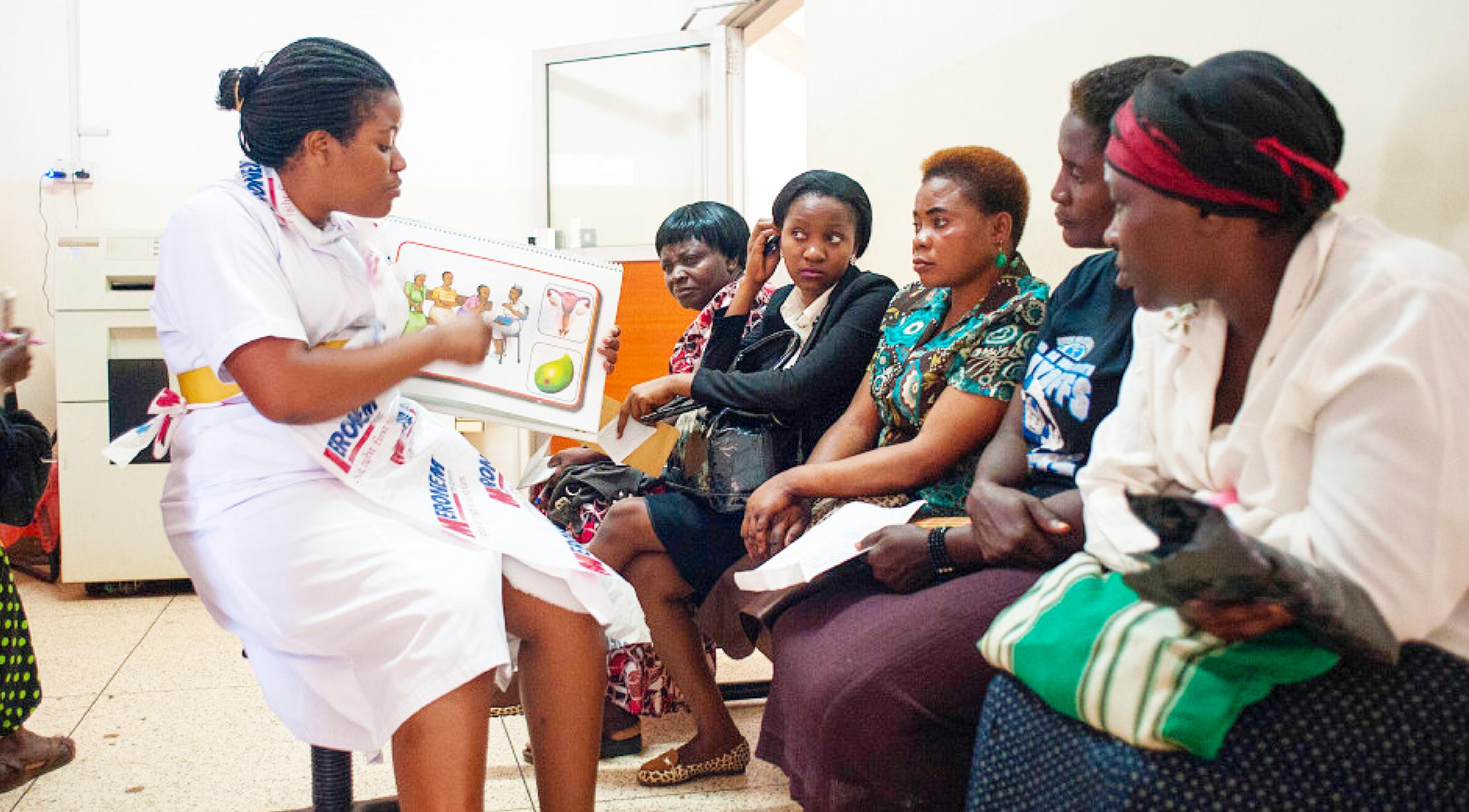
Nevertheless, many low- and middle-income
countries, particularly in Africa and Asia, struggle to reach these targets. Dr. Muriuki emphasizes the importance of collaboration with governments to bridge the gaps and improve access to HPV-related services.
"Collaboration with governments involves assessing the availability and accessibility of HPV vaccination and testing. It is crucial to ensure that HPV vaccines are accessible to all girls and that the vaccines are effectively utilized," Dr. Muriuki explains.
“Similarly, HPV testing should be available and affordable to women from all backgrounds, including those in rural areas or with lower socioeconomic status. Ideally, testing should be free or affordable,” she adds.
After receiving positive HPV test results, a clear protocol for further evaluation and treatment is necessary. Dr. Muriuki emphasizes the significance of confirming the presence of precancerous lesions and providing appropriate treatment. Early detection plays a pivotal role in the effective treatment or cure of cervical cancer.
Efforts should be made to make the screening process timely, affordable, and womencentric. Dr. Muriuki suggests the use of highperformance testing methods preferred by women. “Self-collection is one such approach, allowing women to collect their own samples for HPV testing at home or in healthcare facilities.
HEALTHCAREMEA.COM MAY/JUN 2023 | HEALTHCARE MIDDLE EAST & AFRICA 49
A HEALTH WORKER EDUCATING WOMEN ABOUT CERVICAL CANCER IN A HEALTH CLINIC
IN NUMBERS
1.2M NUMBER OF RWANDESE WOMEN VACCINATED AGAINST HPV BY 2022
This approach eliminates the need for a pelvic examination by a doctor, enhancing comfort and convenience.”
By addressing these challenges and promoting women-centric testing approaches, more women can access HPV testing, leading to early detection and improved outcomes in cervical cancer prevention and treatment.

Investing in high-performance testing methods and ensuring their accessibility to all women, regardless of socioeconomic status, is crucial to improving screening rates. Addressing healthcare infrastructure gaps and establishing screening programs in remote areas are essential steps. Training healthcare workers and facilitating the timely delivery of results to women are key factors in enhancing screening services.
"By addressing the challenges and barriers related to HPV vaccination and screening, countries can make significant progress in reducing cervical cancer rates," Dr. Muriuki affirms. Achieving these goals requires public awareness, political commitment, healthcare system strengthening, and equitable access to services.
THE WINKERS IN THE DARK
In the realm of cervical cancer prevention, small organizations often feel like they're "winking in the dark," as eloquently described by Dr. Angela Muriuki. She shares the sentiment expressed by
Benda Kithaka, the executive director of Kilele Health, stating, "When you're a small organization somewhere, it feels like you're winking in the dark. You're winking and no one can see you. But once you become a big coalition, suddenly the lights come on. And so, she says, they've been winking in the dark. But this power of partnership and bringing together little winkers in the dark, the light comes on and suddenly everyone can see you."
The transformative partnership between FIND and Kilele Health has enabled Kilele Health to effectively connect with and support community networks in the fight against cervical cancer. The role of the convening organization rotates among coalition members to ensure shared leadership and governance, as explained by Dr. Muriuki. Together, they raise their voices to challenge governments, advocating for support and assistance. Dr. Muriuki emphasizes, "We have brought those voices together to challenge, to speak to governments and tell them, this is how you would have helped me. It's too late for me, but now help somebody else."
This partnership provides the necessary resources and shared vision to advance the goal of eliminating cervical cancer in Africa. By listening to the experts—the women at risk and those affected by the disease—FIND and Kilele Health can work together to implement the necessary actions. The engagement and interest across the 16 countries involved in the coalition
50 HEALTHCAREMEA.COM MAY/JUN 2023 | HEALTHCARE MIDDLE EAST & AFRICA
A HEALTH WORKER EDUCATING WOMEN ABOUT CERVICAL CANCER IN A HEALTH CLINIC
NGO FOCUS: FIND
are significant. Kilele Health actively identifies and onboards partners on the ground, recognizing the power that comes from uniting smaller voices into a larger collective.
Dr. Muriuki outlines the shared vision of the coalition, stating, "The shared vision is to eliminate cervical cancer through prevention, treatment, and cure. The goal is to create a global movement where all stakeholders, including funders, manufacturers, governments, and coalitions like the Kilele-led coalition, work together towards this common objective."
FIND's specific contribution focuses on the diagnostics space, particularly ensuring access to high-performance screening technologies like HPV-DNA testing. The ambition is to make these technologies affordable, accessible, and efficient, with timely return of results and clear pathways to treatment for those who test positive. Currently, FIND's dedicated resources are aimed at bridging the gap in availability and accessibility of these screening technologies.
BUILDING MOMENTUM TOWARDS 90-70-90
Cervical cancer screening plays a pivotal role in early detection, even in the absence of high-performance testing options, as emphasized by Dr. Angela Muriuki. She highlights the significance of screening, stating, "To summarize, it is important to emphasize the significance of screening for cervical cancer even without high-performance testing options." Despite any discomfort or invasiveness experienced, early detection through available screening methods remains crucial in the fight against cervical cancer.
Nevertheless, the ultimate objective is to make highperformance HPV testing widely accessible and affordable, inspired by countries like Australia, which aims to eliminate cervical cancer by 2035. Organizations such as FIND are actively working towards achieving this goal by collaborating with manufacturers on pricing and exploring options for local manufacturing.
Moreover, FIND is dedicated to optimizing the testing process by identifying components that can be omitted without compromising accuracy. These efforts aim to make HPV testing more accessible and cost-effective, particularly in low-income countries. Dr. Muriuki points out the potential of using a dry swab as an alternative method for sample collection, emphasizing how it can significantly reduce costs and transform the dynamics of sample collection. Women would be able to collect the swab at home and drop it off at a collection center, revolutionizing accessibility.
Dr. Muriuki confirms the ongoing efforts to make HPV testing more accessible and convenient. She states, "Efforts are underway to make HPV testing more accessible and convenient." The goal is to ensure that self-collected samples yield results of similar quality as those collected by healthcare workers, thus increasing accessibility to vital screening services.
To achieve this, extensive research and clinical trials are being conducted to validate the effectiveness of self-collection. By empowering women to take charge of their own testing,
FIND aims to break down barriers and expand access to cervical cancer screening.
Dr. Muriuki emphasizes the significance of this advancement, stating, "Extensive research and clinical trials are being conducted to validate the effectiveness of self collection, empowering more women to take charge of their own testing."
This shift towards self-collection represents a significant step forward in cervical cancer prevention, allowing women to play an active role in their own healthcare journey.
Dr. Angela Muriuki, a leading voice in cervical cancer prevention, highlights the power of individual actions in contributing to cervical cancer prevention and awareness. She emphasizes, "As an individual, you can take several actions to contribute to cervical cancer prevention and awareness. Educate yourself about the disease and understand the importance of HPV vaccination."
Education is the foundation of prevention. By arming ourselves with knowledge about cervical cancer, its risk factors, and prevention methods, we become empowered advocates in the fight against this devastating disease. Understanding the importance of HPV vaccination is a key aspect of our education. Dr. Muriuki urges, "Encouraging girls aged 10 to 12 years to get vaccinated, available in public health facilities, is vital."
But prevention doesn't stop with vaccination alone. Dr. Muriuki advises, "Women above 25 years should seek cervical cancer screening at the nearest facility, even if HPV DNA testing is not widely available."
“By taking advantage of the screening options currently offered and staying updated on advancements in screening technologies, we can be champions for cervical cancer prevention,” she says.
Dr. Muriuki concludes with a strong call to action, urging, "Catch it early, don't wait for symptoms. Go for screening.”
HEALTHCAREMEA.COM MAY/JUN 2023 | HEALTHCARE MIDDLE EAST & AFRICA 51
THE ULTIMATE OBJECTIVE IS TO MAKE HIGHPERFORMANCE HPV TESTING WIDELY ACCESSIBLE AND AFFORDABLE, INSPIRED BY COUNTRIES LIKE AUSTRALIA, WHICH AIMS TO ELIMINATE CERVICAL CANCER BY 2035.
Country Focus:
UNITED ARAB EMIRATES

leverages a robust economy and reliable healthcare systems for a thriving medical tourism industry
By ELLY OKUTOYI
The United Arab Emirates (UAE), a monarchy federation located in the western part of Asia, is a dynamic country consisting of seven states. Established in December 1971, the UAE has emerged as the largest and wealthiest federation in the region. With Abu Dhabi as its capital city, the UAE comprises the emirates of Dubai, Sharjah, Ajman, Umm Al-Quwain, Fujairah, Abu Dhabi, and Ras Al Khaimah. While each emirate maintains a large degree of independence, they work together to create a prosperous nation.

Furthermore, the UAE encompasses a population of approximately 9.3 million people and covers a surface area of 83,600 square kilometers. This relatively small country boasts a strong gross domestic product of US$415 billion, making it a significant player in the global economy (World Bank, 2021). Its strategic location in the Middle East, bordered by Qatar to the northwest, Saudi Arabia to the south, and Iran and Oman, further enhances its prominence.
Moreover, the United Arab Emirates has made remarkable progress in healthcare innovation, as evidenced by its improved ranking in the World Index of Healthcare Innovation. In 2022, the UAE climbed to the 19th position from its previous rankings of 20th in 2021 and 22nd in 2020. This notable ascent can be attributed to various factors, including the country's strong focus on Fiscal Sustainability. With a low debt-to-GDP ratio of 19.7 percent and restrained public spending growth, the UAE has effectively managed its fiscal responsibilities. This achievement is a result of the collaborative efforts between the private and public sectors in the UAE, demonstrating the effectiveness of their partnership.
Against this backdrop, this article aims to delve into the UAE's impressive healthcare sector, which has expanded to meet the evolving needs of its population and establish itself as a regional and international medical tourism hub. By capitalizing on its strong economic position,
strategic location, and commitment to healthcare innovation, the UAE has emerged as a prominent player in the global healthcare landscape.
REGULATORY AUTHORITIES DRIVING EFFECTIVE PUBLIC HEALTHCARE DELIVERY IN THE UAE
The UAE has established various regulatory authorities to ensure the effective delivery of public healthcare services. These bodies, including the Ministry of Health and Prevention and the Health Authority-Abu Dhabi (HAAD), play critical roles in maintaining the quality and accessibility of healthcare across the country.
At the federal level, the Ministry of Health and Prevention serves as the central health authority. It is responsible for providing comprehensive healthcare services to both citizens and residents of the UAE. The ministry focuses on a wide range of areas, including preventive and curative health services, preparedness for pandemics and health risks, and initiatives to promote community health and raise awareness.
Additionally, the UAE has established the Emirates Health Services (EHS) to enhance the efficiency of the federal health sector. Working closely with the Ministry of Health and Prevention, EHS implements strategic health policies, standards, and preventive care measures. The organization plays a pivotal role in providing healthcare services, combating epidemics and diseases, and ensuring the overall well-being of the population.
Apart from the w other entities also contribute significantly to the healthcare landscape of the UAE. The Dubai Health Authority (DHA) is a prominent regulatory body responsible for healthcare regulation and delivery in Dubai. With a focus on accessibility, efficiency, and highquality healthcare services, the DHA ensures that residents of Dubai have access to comprehensive medical care.
Another key player in the UAE's healthcare sector is Mubadala Health, an investment

HEALTHCARE MIDDLE EAST & AFRICA 53
company established by the Abu Dhabi Government. Mubadala Health plays a crucial role in financing healthcare by providing affordable health insurance coverage to citizens. Moreover, the company supports the development of advanced medical
facilities and recruits highly experienced medical professionals, contributing to the overall growth and advancement of the healthcare sector in the UAE.
Through the collaborative efforts of these regulatory authorities and organizations, the UAE has built a robust healthcare system that emphasizes quality, accessibility, and continuous improvement. The commitment to providing comprehensive healthcare services to its residents and citizens remains a top priority, positioning the UAE as a leader in healthcare within the region.
ADEQUATE FINANCING AND INVESTMENTS REVOLUTIONIZING UAE HEALTHCARE LANDSCAPE
The healthcare financing landscape in the UAE has undergone a significant transformation, driven by both public and private investments. The government's commitment to advancing healthcare services is evident in the substantial healthcare expenditure, which reached US$19.7 billion in 2020. This investment places the UAE at the forefront of healthcare financing within the Gulf Cooperation Council (GCC) countries. The country's projected Compound Annual Growth Rate (CAGR) of 7.4 percent indicates its determination to further enhance healthcare services, with expenditures expected to reach US$30.7 billion by 2027.
The Ministry of Health and Prevention (MOHAP) plays a pivotal role in regulating and managing public healthcare services in the UAE. With oversight of numerous hospitals and clinics, MOHAP has been actively expanding healthcare facilities to meet the growing demand. For instance, Fujairah Hospital has undergone significant development, and specialized clinics and health centers have been constructed. Moreover, MOHAP implemented a progressive policy shift in 2016, ensuring healthcare services are available to all UAE residents, regardless of their nationality.
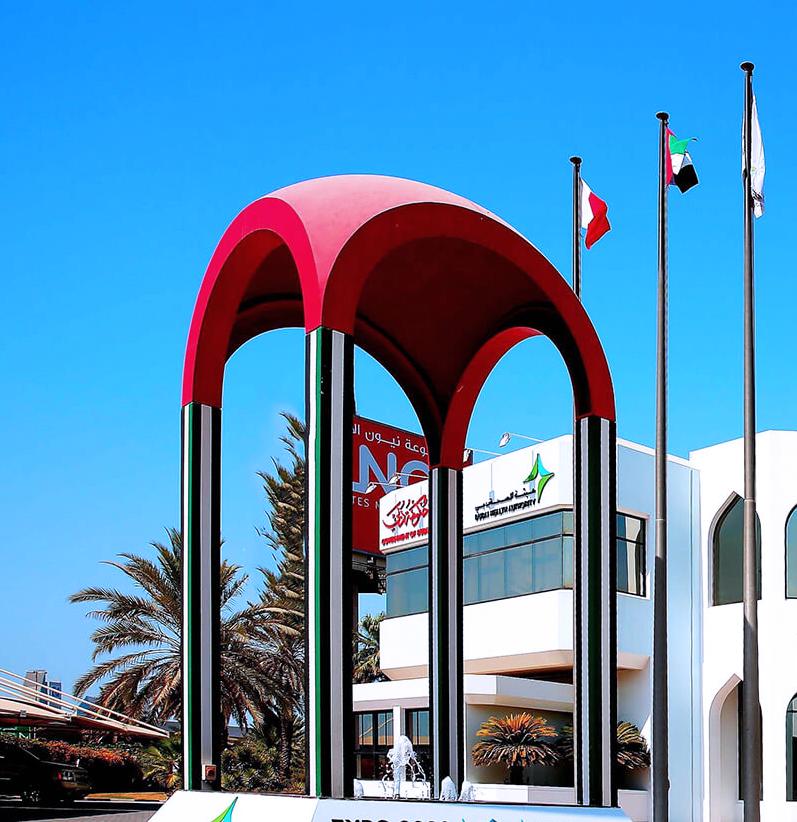
In Abu Dhabi, a pioneering emirate, mandatory health
insurance has been successfully implemented for both citizens and residents. Through Law No. 23 in 2005, all employers are required to provide health insurance coverage for their employees and dependents. Furthermore, Resolution 83 established the "Thiqa" program, which offers comprehensive health coverage at no cost to all UAE nationals residing in Abu Dhabi. These initiatives have significantly improved healthcare accessibility and affordability for the population.
The private sector has also played a crucial role in the UAE's healthcare landscape, actively participating in service provision and expansion. Prominent companies such as NMC Healthcare, Mediclinic Middle East, and VPS Healthcare have undertaken ambitious expansion plans, contributing to the growth of the sector. The number of private hospitals in the UAE has increased, with 104 hospitals offering a total of 18,005 beds in 2020. The government sector accounts for 9,649 beds, while the private sector provides 8,356 beds. Additionally, the number of public hospitals has reached 53, showcasing the overall expansion and development of healthcare facilities in the country.
The UAE's focus on healthcare financing and investments is revolutionizing the healthcare sector, with significant contributions from both the public and private sectors. This commitment is driving improvements in healthcare infrastructure, enhancing accessibility, and elevating the standard of medical services provided. Through strategic financing and investments, the UAE is well-positioned to continue advancing its healthcare system, ultimately benefiting
54 HEALTHCAREMEA.COM MAY/JUN 2023 | HEALTHCARE MIDDLE EAST & AFRICA
THE UAE'S FOCUS ON HEALTHCARE FINANCING AND INVESTMENTS IS REVOLUTIONIZING THE HEALTHCARE SECTOR, WITH SIGNIFICANT CONTRIBUTIONS FROM BOTH THE PUBLIC AND PRIVATE SECTORS.
COUNTRY FOCUS: Egypt COUNTRY FOCUS: United Arab Emirates
its residents and ensuring a high level of healthcare delivery.
SETTING THE STANDARD FOR HEALTHCARE EXCELLENCE
The UAE's dedication to revolutionizing its healthcare infrastructure is evident in the establishment of world-class hospitals that exemplify excellence in medical services. The prestigious Sheikh Khalifa Hospital stands as a shining
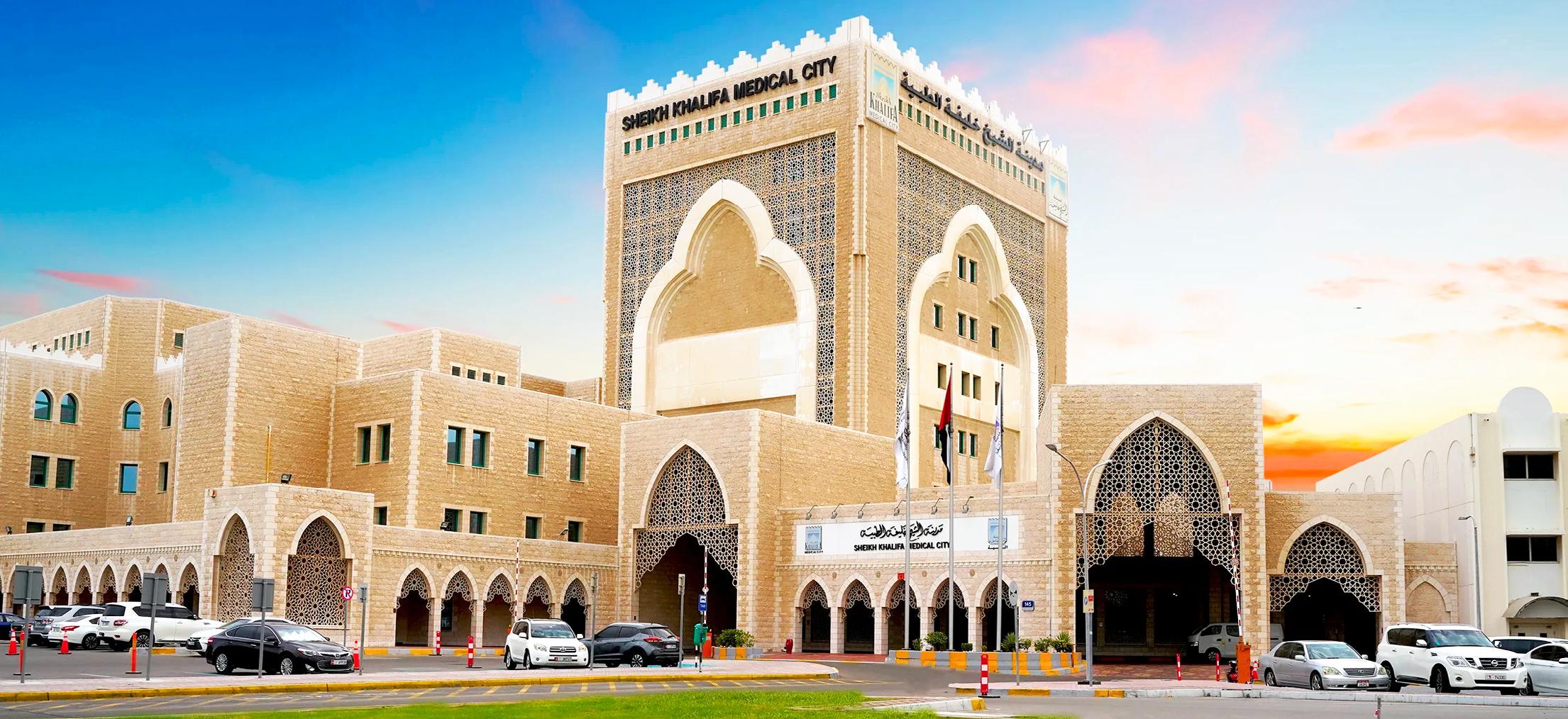
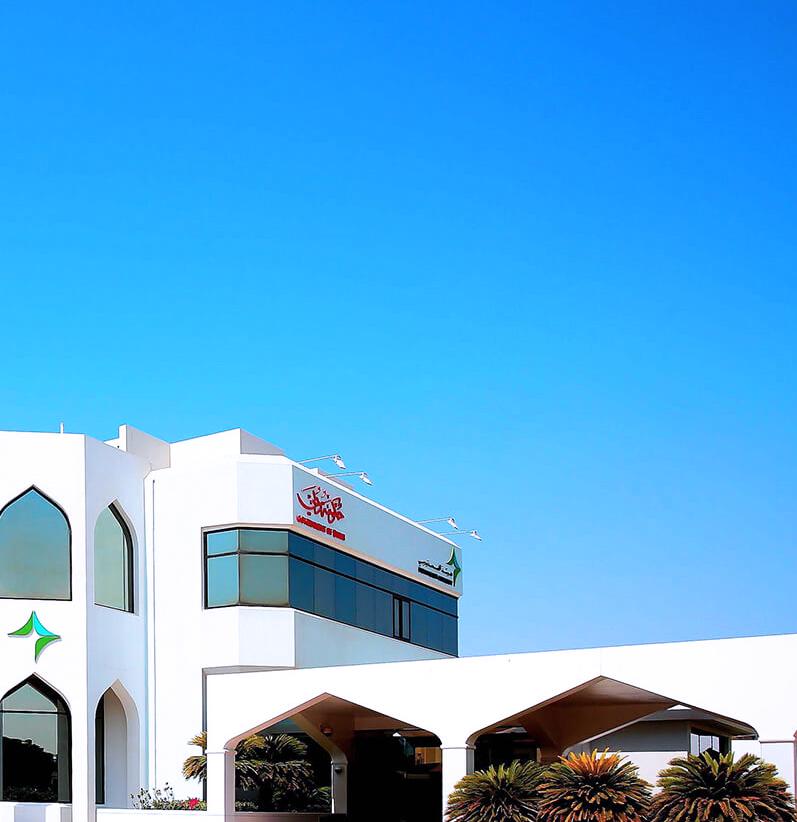
example of the country's commitment to providing state-ofthe-art healthcare facilities. Managed by SEHA, the Abu Dhabi Health Services Company, this flagship institution boasts an impressive capacity of 711 beds. The hospital is equipped with cutting-edge technology, advanced diagnostic and treatment facilities, and a team of highly skilled medical professionals, ensuring the delivery of top-quality healthcare services to patients.
In addition to government-driven initiatives, the private sector has also played a significant role in transforming the healthcare landscape of the UAE. Projects such as Cleveland Abu Dhabi have made substantial investments, amounting to billions of dollars, to develop and establish high-ranking hospitals. These private-sector-driven endeavors have contributed to raising the standards of healthcare services in the country, catering to the diverse needs and preferences of the population.
The advancements in healthcare infrastructure in the UAE go beyond the physical aspects of hospitals. The country has embraced digitalization and telemedicine, revolutionizing the way healthcare services are delivered. The integration of technology has enabled remote consultations, digital health records, and telemonitoring, offering convenience, efficiency, and accessibility to patients. This digital transformation has paved the way for virtual healthcare services, reducing the need for in-person visits and enabling healthcare professionals to reach a larger population, particularly those in remote areas.
Furthermore, the UAE's relentless focus on research and development in the healthcare sector has not only fueled innovation and advancements but also established the country as a prominent player in the global scientific community. Through the establishment of cutting-edge research centers and collaborations with leading international institutions, the UAE has fostered a culture of scientific inquiry and knowledge
HEALTHCAREMEA.COM MAY/JUN 2023 | HEALTHCARE MIDDLE EAST & AFRICA 55
THE DUBAI HEALTH AUTHORITY HEADQUARTERS IN DUBAI
SHEIKH KHALIFA MEDICAL CITY-ABU DHABI'S FLAGSHIP INSTITUTION FOR SEHA'S HEALTHCARE SYSYTEM
exchange, driving the progress of healthcare services.
One noteworthy research institute in the UAE is the Mohammed Bin Rashid Medical Research Institute, situated in Dubai Healthcare City. This world-class biomedical research facility, operated by the Al Jalila Foundation, seamlessly collaborates with the Mohammed Bin Rashid University for Medicine and Health Sciences. This close-knit partnership fosters academic, healthcare, and scientific synergies, allowing for seamless collaboration within the scientific community. By actively engaging in international collaborations, the institute not only nurtures local talent but also facilitates knowledge exchange and introduces best practices, thus solidifying its commitment to scientific excellence.
In alignment with the UAE University's ambitious mission to become a global center for applied health research, the Zayed Bin Sultan Al Nahyan Center for Health Sciences (ZCHS) prioritizes both national and international outreach and innovation. As a recognized center

of excellence, the ZCHS upholds the unique values of the UAE while actively contributing to the advancement of healthcare research. Its primary objective is to develop applied health research capabilities, thereby cementing the UAE's position as a frontrunner in cutting-edge medical discoveries.
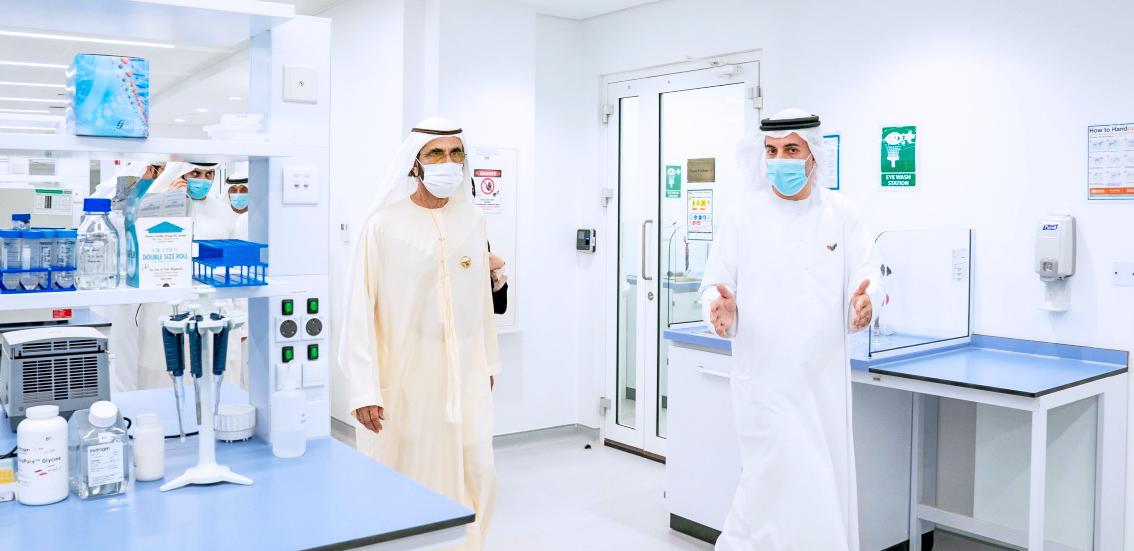
To proactively enhance the health of its population, the UAE launched the Emirati Genome Programme, a groundbreaking national initiative that leverages genomic data to revolutionize the prevention and treatment of chronic diseases. By extensively studying gene sequencing among UAE nationals, this pioneering project aims to optimize healthcare interventions. Through voluntary participation and the utilization of advanced sequencing technology, the program generates and meticulously analyzes comprehensive genome data, culminating in the creation of a reference genome specific to UAE citizens.
The UAE's commitment to excellence in healthcare extends to its collaboration with globally recognized institutions such as King's College Hospital. Renowned for its world-leading expertise and exceptional patient care, King's College Hospital plays an indispensable role in elevating healthcare standards in the UAE. With specialized areas of focus including Liver Disease, Oncology, Orthopedics, Breast Health, and Neurology, the hospital provides unparalleled medical services.
The Ministry of Health and Prevention in the UAE operates the Health Research Bank, a valuable resource that enables researchers to access relevant research projects conducted
56 HEALTHCAREMEA.COM MAY/JUN 2023 | HEALTHCARE MIDDLE EAST & AFRICA
HIS HIGHNESS SHEIKH MOHAMMED BIN RASHID AL MAKTOUM, VICE PRESIDENT, PRIME MINISTER AND RULER OF DUBAI, DURING THE INAUGURATION OF THE MOHAMMED BIN RASHID MEDICAL RESEARCH INSTITUTE
COUNTRY FOCUS: Egypt COUNTRY FOCUS: United Arab Emirates
in the country. This comprehensive platform encompasses contributions from esteemed government and private health institutions, facilitating collaboration and knowledge sharing among experts. By actively promoting evidencebased healthcare and fostering continuous improvement in medical practices, the Health Research Bank plays a pivotal role in supporting the UAE's commitment to advancing healthcare through research.
Dubai Science Park, a dynamic merger of DuBiotech and Energy and Environment Park, stands as a vital research and development hub for life sciences companies in the UAE. Equipped with state-of-the-art laboratories and essential ancillary services, this thriving park provides an ideal environment for companies to conduct groundbreaking research and development in the field. By facilitating innovation and encouraging collaboration, Dubai Science Park serves as a catalyst for advancements in life sciences, contributing to the overall progress of healthcare in the UAE.

Addressing a significant gap in healthcare innovation and technology, the Healthcare Engineering Innovation Center in Abu Dhabi is a pioneering initiative aimed at transforming the healthcare innovation landscape not only in the UAE but also in the broader MENA region. By bridging this crucial gap, the center actively tackles pertinent health challenges within the UAE. With a focused vision on attracting external funding and establishing self-sustainability, this initiative aligns with the ambitious goals of Khalifa University and Abu Dhabi Vision 2030, positioning the UAE at the forefront of medical device design, development, and clinical testing.
The revolutionizing healthcare infrastructure in the UAE is not limited to hospitals and research centers alone. The country has also invested in the development of specialized centers and clinics to cater to specific medical needs. These specialized facilities focus on areas such as oncology, cardiology, neurology, and orthopedics, providing specialized care and expertise to patients. By offering comprehensive and specialized services, the UAE ensures that individuals receive the highest quality of care, tailored to their specific medical conditions.
THRIVING HEALTHCARE SECTOR ATTRACTS PHENOMENAL MEDICAL TOURISM
The rise of medical tourism in the United Arab Emirates (UAE) has been a remarkable
phenomenon, fueled by its exceptional healthcare infrastructure and the provision of high-quality medical services. Leading the charge are Dubai and Abu Dhabi, which have experienced rapid growth in the medical tourism sector. However, despite this success, the UAE also faces certain challenges within its healthcare system, particularly in relation to cardiovascular disease and healthcare costs.
In the recent Medical Tourism Index Ranking, Dubai secured an impressive 6th place, with Abu Dhabi following closely behind at 8th place. This recognition highlights the immense potential of the UAE as a preferred destination for individuals seeking medical treatments and procedures.
What further enhances the UAE's attractiveness as a medical tourism hub is its well-developed travel and tourism ecosystem. With a wide range of attractions, luxurious hotels, and entertainment options, the country offers a holistic experience for medical tourists. Additionally, the UAE's robust aviation services ensure excellent connectivity to international destinations, making it convenient for patients to travel from various parts of the world. The country's efficient transport logistics also contribute to the seamless movement of patients within the UAE.
The remarkable growth of medical tourism in the UAE is evident from its impressive industry
IN NUMBERS
HEALTHCAREMEA.COM MAY/JUN 2023 | HEALTHCARE MIDDLE EAST & AFRICA 57
UAE'S MEDICAL TOURISM REVENUE IN 2019
US$ 3.29B
CLEVELAND CLINIC'S ULTRA MODERN BUILDING IN ABU DHABI
revenue of AED 12.1 billion (US$3.29 billion) in 2018, with an annual growth rate of 5.5%. In 2019 alone, the country welcomed approximately 350,118 health tourists, reflecting a 4% increase from the previous year. This surge in medical
tourism can be attributed to the extensive network of hospitals and medical centers, particularly in Dubai and Abu Dhabi, where world-class healthcare services are readily available.
To solidify its position as a global medical destination, the UAE has implemented the Medical Tourism Strategy 20172021, placing Dubai at the forefront. The strategy focuses on delivering comprehensive, integrated, and high-quality services while fostering collaboration between public and private healthcare providers. Dubai has garnered significant recognition in the field, ranking first among Arab destinations for medical tourism and sixth among the 46 most unique international medical tourism countries. In 2022 alone, Dubai welcomed a staggering 674,000 medical tourists, who collectively spent US$270 million, demonstrating substantial growth compared to the previous year.
However, despite the UAE's success story in medical tourism, it faces noteworthy healthcare challenges, particularly regarding cardiovascular disease and healthcare costs. Globally, the country has one of the highest age-standardized death rates for cardiovascular disease. In 2021, cardiovascular disease accounted for 40% of all deaths in the UAE. While there has been a decline in infant mortality rates, the overall rate remains a concern. Furthermore, the high cost of healthcare poses a challenge, despite the country's strong GDP.
To address these pressing challenges, the UAE has implemented a National Agenda that focuses on preventive measures, reducing lifestyle-related diseases, and enhancing the readiness of the healthcare system to tackle epidemics and health risks. The ultimate goal is to ensure a long and healthy life for the Emirati community.
HEALTHCARE WORKFORCE CONSIDERATIONS
The UAE, facing a unique challenge in its healthcare workforce, heavily relies on foreign healthcare professionals. With only 12% of the population being Emiratis, a majority of physicians
(82%) and nurses (96%) in the country are expatriates. While this reliance on foreign workers has been instrumental in filling the healthcare workforce gap, it also poses dangers, such as the risk of "brain drain" as experienced professionals gain knowledge and eventually move abroad, resulting in a loss of locally accumulated expertise.
Recognizing the potential drawbacks of over-reliance on health expatriates, the UAE has taken proactive steps to invest in training healthcare professionals to reduce the gap. The country is witnessing a positive outlook for healthcare workforce development, with numerous opportunities to educate and nurture local medical talent.
Medical universities across the Emirates offer high-quality education in medicine, dentistry, pharmacy, and related fields, catering to both local and international students. The Dubai Health Authority (DHA) Strategy 2016-2021 includes government directives aimed at attracting, developing, and retaining healthcare workers, and facilitating the establishment of a world-class medical education system. Projections indicate that by 2030, there could be a shortfall of around 18 million health workers worldwide.
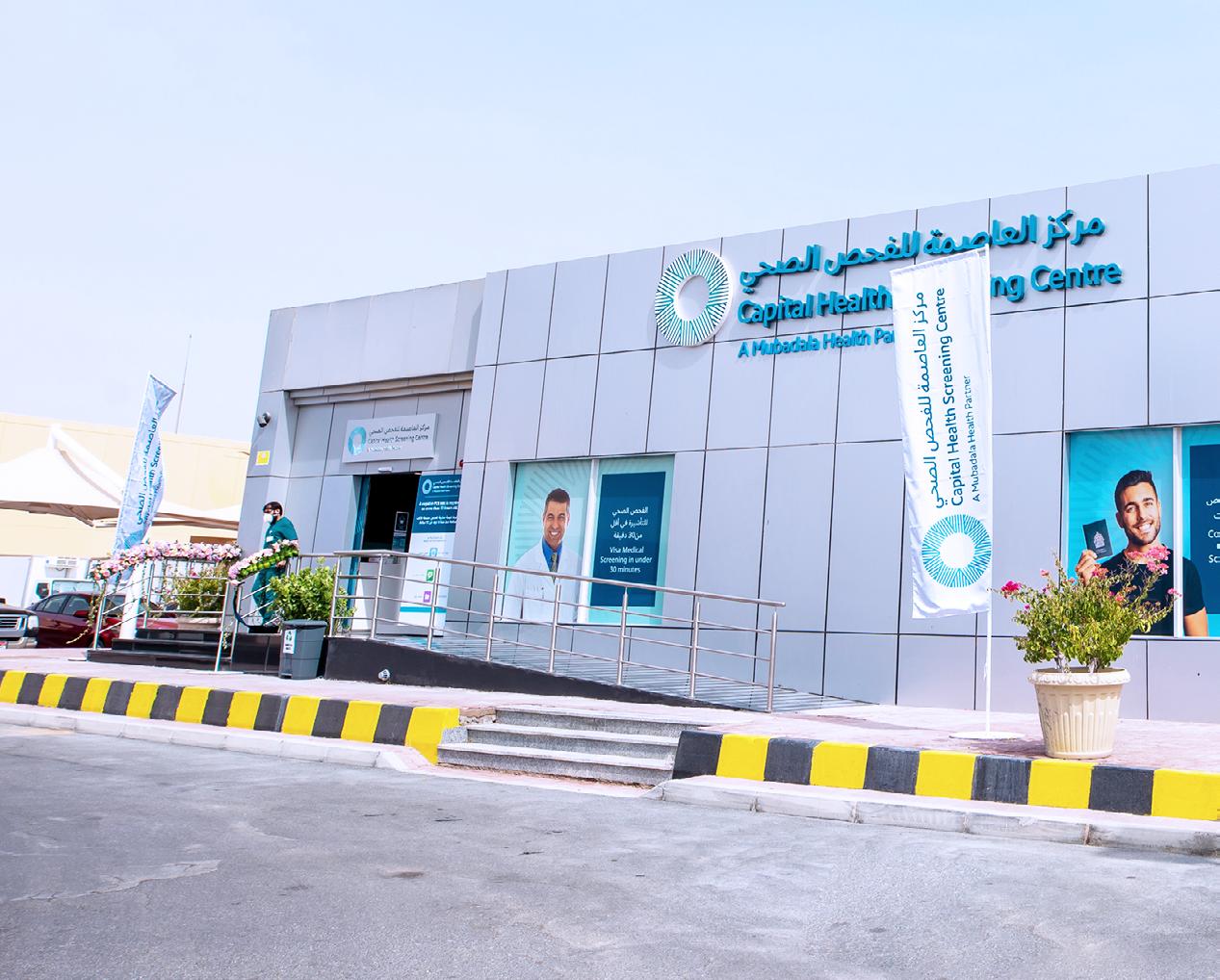
In recent years, the UAE has emerged as an appealing destination for medical students, especially for foundation programs. Limited availability of medical universities in certain countries within the wider Middle East region has made it challenging for aspiring students to enroll in medical degree programs in their home nations. Consequently, the UAE's existing supply of medical universities has attracted a significant cohort of students, including those from the subcontinent. This influx of medical students has not only bolstered the local healthcare workforce but also fostered knowledge exchange and the adoption of best practices in healthcare.
The UAE's efforts to address the global shortage of
58 HEALTHCAREMEA.COM MAY/JUN 2023 | HEALTHCARE MIDDLE EAST & AFRICA
COUNTRY FOCUS: Egypt
RECOGNIZING THE POTENTIAL DRAWBACKS OF OVER-RELIANCE ON HEALTH EXPATRIATES, THE UAE HAS TAKEN PROACTIVE STEPS TO INVEST IN TRAINING HEALTHCARE PROFESSIONALS TO REDUCE THE GAP.
COUNTRY FOCUS: United Arab Emirates
healthcare workers align with the multi-faceted approach required on a global scale. The worldwide shortage of healthcare professionals presents a significant challenge in meeting the increasing demand for healthcare services. To bridge this gap, it is essential to attract and retain talent, invest in training and education, and promote innovation in healthcare delivery. The UAE's success in attracting a significant number of medical students reflects its commitment to building a robust healthcare workforce capable of meeting the evolving needs of its population.
By investing in the training and education of healthcare professionals, the UAE aims to reduce its reliance on foreign
workers and develop a sustainable healthcare workforce. This approach not only addresses the immediate challenges of filling healthcare positions but also ensures the long-term stability and growth of the healthcare sector in the country. It allows the UAE to retain the expertise and knowledge within its borders, reducing the risks associated with brain drain and enhancing the overall quality of healthcare services provided to its residents.

LEVERAGING SMART SOLUTIONS FOR PANDEMIC CONTROL AND ADVANCING HEALTHCARE IN THE UAE
In the UAE, the government's proactive approach to leveraging smart solutions for pandemic control and healthcare advancement is evident. The ALHOSN UAE app and the Virtual Doctor for COVID-19 chatbot service have been key tools in combatting the spread of COVID-19. Simultaneously, the country's healthcare system stands out for its exceptional standards, high doctor-to-resident ratio, and thriving medical tourism sector. This segment delves into the smart solutions implemented by the UAE government, highlighting its progressive healthcare landscape.
At the forefront of the UAE's pandemic control efforts is the ALHOSN UAE app. This powerful tool has enabled effective contact tracing and risk assessment, alerting individuals who have been in proximity to COVID-19 cases. With each user assigned a unique QR code containing encrypted health information, the app empowers health authorities to identify potential virus transmitters and those at risk. By facilitating communication and re-testing measures, the ALHOSN UAE app strengthens the fight against COVID-19. It is a collaborative initiative by the Ministry of Health and Prevention, the Department of Health - Abu Dhabi (DoH), and the Dubai Health Authority.
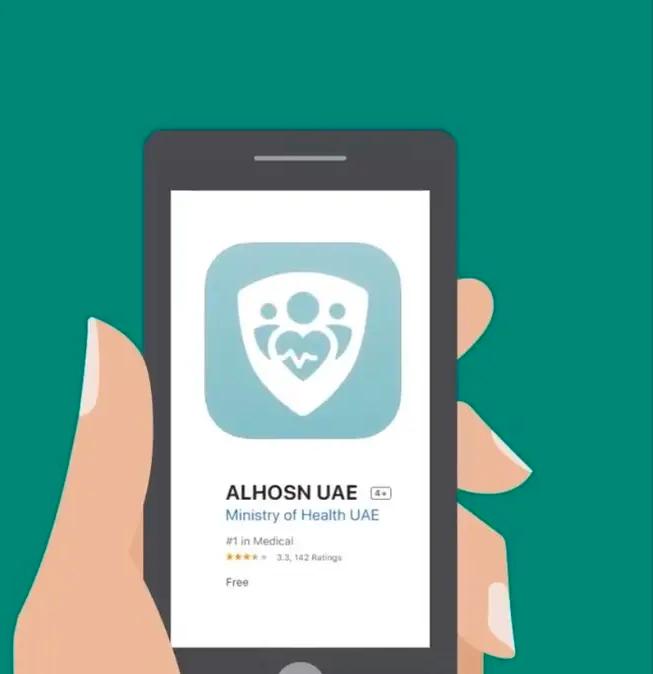
Complementing the ALHOSN UAE app is the Virtual Doctor for COVID-19 chatbot service. This intelligent chatbot plays a crucial role in assessing individuals' risk of contracting the virus. By asking essential questions, it provides accurate information and guides users in understanding their risk level. With advanced technologies integrated into the Virtual Doctor service, individuals can make informed decisions about their health and seek appropriate medical attention.
The UAE's exceptional healthcare system is widely recognized for its high standards. With a doctor-to-resident ratio of 181 doctors per 100,000 residents, the country ensures widespread access to quality medical care. Additionally, the UAE has experienced significant growth in medical sales, reaching AED 12.1 million (US$3.29 million) in 2018, reflecting its commitment to continually improving healthcare infrastructure and standards.
The thriving medical tourism sector further strengthens the UAE's healthcare system. Leveraging its status as the world's third-largest oil producer, the country has emerged as a sought-after destination for medical tourists. With stateof-the-art healthcare facilities, a pool of highly skilled medical professionals, and cutting-edge technologies, the UAE stands
HEALTHCAREMEA.COM MAY/JUN 2023 | HEALTHCARE MIDDLE EAST & AFRICA 59
at the forefront of healthcare advancements.
UAE'S PIONEERING ADOPTION OF TELEMEDICINE TRANSFORMS HEALTHCARE DELIVERY
The UAE's visionary approach to healthcare is evident in its pioneering use of telemedicine. The country has embraced this transformative technology, particularly in response to the COVID-19 pandemic. By proactively implementing telemedicine solutions, the UAE government has revolutionized healthcare delivery, improving accessibility and extending services to even the most remote areas.
In support of telemedicine, the Telecommunications Regulatory Authority (TRA) of the UAE has granted approval to six leading telemedicine solutions. NextGen Healthcare, VSee, OKADOC, Doxy.me, GetBEE, and Mind Mina Telemedicine have all received licenses, enabling seamless connectivity between patients and medical professionals. These cutting-
cardholders, guaranteeing widespread availability of highquality healthcare services.
Taking the lead in implementing telemedicine, the Dubai Health Authority (DHA) has launched the visionary "Dubai RoboDoc" initiative. This forward-thinking program allows doctors to simultaneously consult with multiple specialists using state-of-the-art robotic technology. After successful trials, the DHA plans to expand this service to all its hospitals and health centers, and even extend it to homecare patients through the assistance of visiting nurses. This innovative approach promotes collaboration among healthcare professionals, ultimately improving patient outcomes and optimizing care delivery.
The UAE's commitment to leveraging telemedicine extends to the field of radiology, with teleradiology playing a significant role. Notably, Mulk Holdings has established two advanced telemedicine and diagnostic centers in Dubai, focusing on delivering efficient radiology services. Additionally, a groundbreaking public-private partnership called Unison, involving GE Healthcare, the Ministry of Health and Prevention, and Abu Dhabi International Medical Services, has brought the UAE its first public sector teleradiology capability. These advancements in teleradiology have enhanced diagnostic accuracy and expedited patient care, ensuring timely and effective treatment.
In addition to established players, several startups in the UAE have embraced telemedicine concepts, further enhancing healthcare accessibility. "Health at Hand" offers convenient patient-to-doctor video consultations, while "Heydoc!" facilitates seamless communication, enabling patients to share information and receive personalized guidance. The "Smart Seha" platform allows patients to consult with doctors conveniently via phone calls. These innovative startups have harnessed technology to bridge the gap between patients and healthcare providers, fostering a new era of healthcare delivery in the UAE.
edge platforms have facilitated virtual consultations, effectively reducing the need for physical visits to hospitals and minimizing patient transfers between healthcare facilities. As a result, healthcare services have reached previously underserved regions, bridging the gap in access to quality care.
Mubadala Healthcare, in collaboration with Medgate from Switzerland, has established the groundbreaking Abu Dhabi Telemedicine Center. This exceptional initiative offers roundthe-clock medical consultations in both Arabic and English, ensuring that patients can access healthcare professionals at any time through phone consultations. Exclusive access to these services is granted to Daman Thiqa and Enhanced

The UAE's forward-thinking approach to healthcare extends beyond telemedicine, as demonstrated by the implementation of smart technologies and mobile apps. The Dubai Health Authority (DHA) has introduced smart pharmacies equipped with robotic systems that efficiently dispense prescriptions. Moreover, electronic tags placed on babies' ankles ensure their safety, while wireless patches remotely monitor patients' heart rates for extended periods. The DHA has also developed a diverse range of apps catering to various healthcare stakeholders, including patients, doctors, students, medical tourists, and others. These technological advancements have enhanced efficiency, safety, and accessibility within the healthcare system.
UAE'S COMPREHENSIVE STRATEGY FOR A HEALTHIER SOCIETY
To address the pressing health challenges and improve public health, the United Arab Emirates (UAE) has undertaken a series of health initiatives and control measures. These concerted
60 HEALTHCAREMEA.COM MAY/JUN 2023 | HEALTHCARE MIDDLE EAST & AFRICA
COUNTRY FOCUS: Egypt COUNTRY FOCUS: United Arab Emirates
SHEIKH ZAYED CANCER CENTER, A LEADING GENETIC RESE
efforts are in line with the government's commitment to creating a healthier society and reducing the burden of non-communicable diseases (NCDs).
Understanding the urgency of the situation, the UAE has formulated a comprehensive longterm strategy to improve the nation's health outcomes. A key focus of this strategy is the ambitious goal of reducing rates of diabetes and obesity, both major contributors to NCDs. To achieve this, health authorities have implemented various measures targeting these risk factors.
The UAE's health initiatives include the elimination of trans fats from food products, reducing the salt and sugar content in processed foods, and promoting healthier diet choices. By taking these actions, the government aims to empower individuals to make informed decisions about their nutrition and adopt healthier eating habits. These initiatives have the potential to positively impact the prevalence of NCDs and improve overall health outcomes in the UAE.
In addition to addressing dietary factors, the UAE has also implemented strict regulations to control tobacco consumption, another significant risk factor for NCDs. Prohibiting the sale of tobacco to children and regulating smoking in public transportation, private vehicles, and indoor places when children are present are some of the measures enacted to create a healthier environment. These control measures not only protect individuals from the harmful effects of secondhand smoke but also contribute to reducing smoking rates and associated health risks.
By implementing these health initiatives and control measures, the UAE is actively striving to create a healthier society and extend the life expectancy of its population. These efforts align with the government's unwavering commitment to improving public health and reducing the burden of NCDs. Through a multi-faceted approach that addresses risk factors, promotes healthy lifestyles, and enforces regulations, the UAE is paving the way for a healthier future for its citizens.
EMBRACING TECHNOLOGICAL ADVANCEMENTS SHAPING THE FUTURE OF HEALTHCARE IN THE UAE
The UAE government's commitment to transforming its healthcare sector is evident through its embrace of technology and innovative approaches. With a focus on telemedicine and digital medicine, the Ministry of Health

and Prevention is driving the advancement of healthcare services. This strategic vision aims to improve efficiency, accessibility, and patient outcomes by leveraging the power of technology.
To support the integration of technology in healthcare, the UAE government is making significant investments. By allocating resources to state-of-the-art infrastructure and advanced medical technologies, the government is empowering healthcare providers to deliver the highest quality care. This commitment to resource allocation demonstrates the government's determination to build a cutting-edge healthcare system.
The UAE government acknowledges and values the contributions of healthcare professionals who have shown unwavering dedication and selflessness. These professionals play a crucial role in positioning the country as a leader in global health indicators. Their expertise and commitment are integral to realizing the government's vision of a world-class healthcare system. The government expresses its deepest gratitude and appreciation for the tireless efforts of doctors and healthcare practitioners.
In line with its sustainability goals, the UAE government is incorporating eco-friendly practices into the healthcare system as part of the National Climate Change Plan. This strategic framework promotes a resilient and environmentally conscious healthcare sector. By embracing green initiatives such as energyefficient infrastructure and sustainable waste management, the government ensures a healthier future for both the population and the environment
IN NUMBERS US$ 30.7B
UAE'S PROJECTED MEDICAL EXPENDITURE BY 2027
HEALTHCAREMEA.COM MAY/JUN 2023 | HEALTHCARE MIDDLE EAST & AFRICA 61
UAE'S MINISTRY OF HEALTH AND PREVENTION (MOHAP) BEING RECEIVES THE GLOBAL CERTIFICATION MARK (GC-MARK) AWARD

CHRONIC KIDNEY DISEASE

Efforts to tackle the rising burden of CKD in Africa reveal the unmasked silent pandemic
Chronic kidney disease (CKD) is a global public health concern affecting approximately 850 million individuals worldwide.
The gradual deterioration of kidney function can lead to kidney failure or end-stage kidney disease, requiring dialysis or transplantation. CKD has witnessed a significant increase in mortality rates, making it the 10th leading cause of global deaths. Conditions such as acute kidney injury and Alport syndrome contribute to the progression of CKD and its associated complications. The disease affects the vital functions of the kidneys, impacting waste removal, fluid balance, and hormone regulation.

Undiagnosed cases of CKD are prevalent, and the disease is closely linked to cardiac and cardiovascular events. Nephron loss, often irreversible, is associated with metabolic and cardiovascular disorders. In the African continent, efforts are being made to improve kidney care, adopt technology in treatments, implement policy recommendations, and emphasize preventive measures to alleviate the burden of CKD. Healthcare Middle East & Africa provides valuable insights into the current state of kidney care and strategies to combat this silent disease.

SOARING UNDIAGNOSED CASES OF CKD IN AFRICA
Chronic kidney disease (CKD) is becoming a significant public health concern in Africa, with a rising number of undiagnosed cases. Several factors contribute to this alarming trend, including financial barriers, limited access to treatment, inadequate awareness of kidney diseases, and delays in diagnosis by healthcare professionals. These challenges hinder patients with CKD from seeking appropriate healthcare, leading to further disease progression. Understanding the prevalence of CKD is essential for developing effective strategies to address this issue.
Financial barriers pose a significant challenge to accessing healthcare services for individuals
with CKD in Africa. Many patients face financial constraints that prevent them from seeking medical attention until the disease has advanced. Additionally, the scarcity of kidney care facilities and a shortage of nephrologists further impede timely access to treatment and optimal care delivery. Limited awareness among the general population and healthcare professionals about kidney diseases also contributes to delayed diagnoses. Addressing these challenges requires a comprehensive approach that involves early detection and effective management of the condition.
Recent studies provide valuable insights into the prevalence and distribution of CKD in Africa. The Global Burden of Disease (GBD) study indicates a pooled prevalence of CKD in general and high-risk populations in Africa ranging from 10.1% to 15.8%. Regional variations are observed, with North Africa reporting the lowest prevalence at 4%, followed by East Africa at 11.0%, Southern Africa at 12.2%, Central Africa at 16%, and West Africa at 16.5%. These statistics underscore the significant burden of CKD in Africa and the urgent need for targeted interventions and
By LORRAINE ABWAO
HEALTHCAREMEA.COM MAY/JUN 2023 | HEALTHCARE MIDDLE EAST & AFRICA 63
comprehensive healthcare strategies.
Efforts to detect and manage CKD in specific countries highlight the severity of the problem. In Kenya, for example, more than 1.8 million people are affected by kidney diseases, with nearly 500,000 individuals living with chronic kidney disease and over 6,000 patients receiving dialysis treatments as of March 2023. Similarly, South Africa estimates that around 5 million individuals aged 20 years and above may be affected by CKD, greatly impacting their quality of life. The COVID-19 pandemic has further exposed the challenges faced by patients with renal disease in countries like Liberia, where access to essential assistance became even more difficult during the crisis.
Egypt is also experiencing a significant increase in the burden of CKD, with the disease ranking as the fifth leading cause of death. The majority of patients undergoing dialysis in Egypt are men, primarily aged 55 years and above. Hypertension is the most common cause of end-stage kidney disease (ESKD), followed by diabetes and glomerulonephritis. Addressing the underlying causes of CKD and implementing prevention and management strategies are crucial in Egypt.
The concentration of hemodialysis centers in major cities poses a barrier to adequate treatment, forcing patients from rural areas to
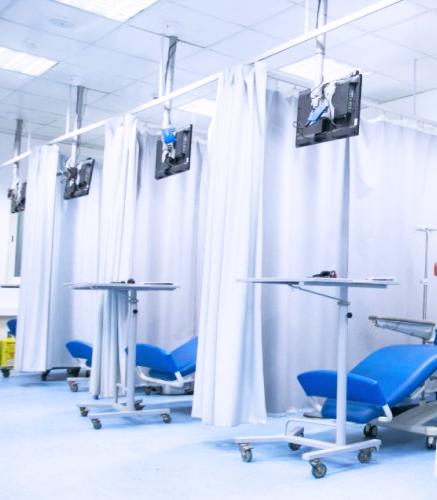
travel long distances. Efforts should be made to decentralize dialysis services and establish satellite centers in rural areas to improve patient access to care. Moreover, inadequate resources and operational challenges in governmentsupported facilities contribute to the strain on hospitals and hinder effective management of CKD and its complications. Increased investment in healthcare infrastructure, including the procurement of dialysis machines and healthcare professional training, is vital to meet the growing demand for renal care.
In Nigeria, kidney failure claims the lives of nearly 45,000 individuals each year, with close to 50,000 patients requiring kidney transplants or dialysis annually. Accessible and affordable treatment options, including improved dialysis services and increased availability of organs for transplantation, are urgently needed in the country.

THOUSANDS MISSING OUT ON EARLY INTERVENTION REGIMES
Early diagnosis of CKD plays a crucial role in slowing the loss of kidney function and reducing the risk of kidney failure. However, thousands of individuals around the world are missing out on the opportunity for early intervention, according to recent data. The World Health Organization has cautioned that at least 251.4 million people
64 HEALTHCAREMEA.COM MAY/JUN 2023 | HEALTHCARE MIDDLE EAST & AFRICA
A PATIENT BEING TRIAGED BY A MEDICAL PERSONNEL FOR BLOOD PRESSURE VITALS
DISEASE FOCUS: Chronic Kidney Disease
A VIEW OF HEMODIALYSIS CLINIC UNIT IN A RENAL CENTER IN EGYPT
globally required preventive treatment for CKD in 2021. This highlights the urgent need for effective implementation of CKD screening and national action plans for prevention and early diagnosis, particularly in Africa.
Preventive services have the potential to save lives and improve health outcomes by detecting early-stage disease, designing effective disease management interventions, and allowing for earlier treatment before complications arise. The National Library of Medicine emphasizes that screening for CKD should be a policy priority in low- to middle-income countries, as early intervention can significantly reduce the burden of morbidity and mortality associated with CKD.
In the advanced stages of CKD, key kidney functions, such as waste removal, blood pH control, and electrolyte and hormone production, are greatly compromised. This leads to an accumulation of nitrogenous wastes, increased blood acidity, and potassium overload, which significantly increase morbidity and mortality risks. Individuals with long-term diabetes face an even higher risk of irreversible kidney damage, as diabetic nephropathy, also known as diabetic kidney disease (DKD), is a serious complication that can arise in those with type 1 or type 2 diabetes.
The high incidence of CKD in Africa is
INCREASED
further exacerbated by low detection rates and the combined prevalence of heart diseases, heart attacks, heart failure, and strokes. When kidneys lose approximately 90 percent of their filtering and waste-removal ability, kidney failure occurs, impeding the production of urine. Initially, the loss of renal tissues does not exhibit symptoms of kidney disease because the remaining tissues compensate by becoming more actively involved in kidney functions. However, without early medical interventions, this renal adaptation eventually leads to renal insufficiency and progression to renal failure.
To address this issue, hospitals have started offering comprehensive chronic kidney disease screening packages, including blood pressure checks, urine tests, creatinine tests, and consultations with nephrologists. Renal function testing involves analyzing serum creatinine and urea levels, serum electrolyte levels, urinary sediment, urine output, and urinalysis. In advanced stages, ultrasound tests are performed to detect renal obstructions and differentiate between chronic kidney disease and acute kidney injury.
As novel screening alternatives for CKD emerge, many dialysis centers are well-equipped to provide services to patients with electrolyte disorders, acute kidney diseases, renal stones,
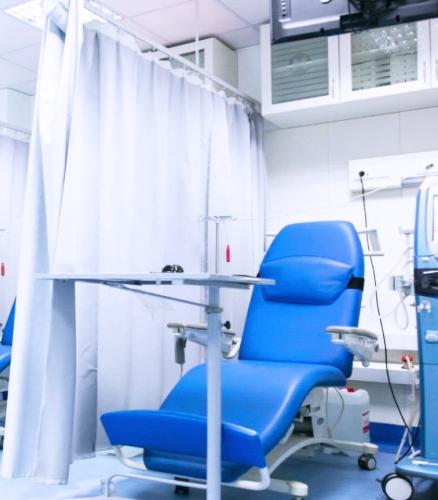
HEALTHCAREMEA.COM MAY/JUN 2023 | HEALTHCARE MIDDLE EAST & AFRICA 65
INVESTMENT IN HEALTHCARE INFRASTRUCTURE, INCLUDING THE PROCUREMENT OF DIALYSIS MACHINES AND HEALTHCARE PROFESSIONAL TRAINING, IS VITAL TO MEET THE GROWING DEMAND FOR RENAL CARE.
glomerular diseases, lupus nephritis, diabetic nephropathy, and proteinuria. Point-of-care testing for kidney disease offers the opportunity for more timely treatment changes and preventing the progression of the illness.
In Kenya, eligible citizens can access a comprehensive benefits package covering hemodialysis, routine laboratory tests, medications, nursing services, specialist reviews, follow-up care, and counseling through the National Insurance Fund. However, the prevalence of chronic kidney disease remains high in low- and middle-income communities,
posing a significant development challenge. The annual cost of hemodialysis in Kenya, Senegal, and Nigeria alone is US$1.7 billion, US$3.5 billion, and US$450 million, respectively, accounting for a substantial portion of the countries' total domestic government health costs.

UNLOCKING INNOVATIONS IN DIABETIC KIDNEY DISEASE TREATMENT
According to the Multidisciplinary Digital Publishing Institute, diabetic kidney disease affects approximately 40% of people with type 2 diabetes, with an estimated 160 million individuals worldwide suffering from both diabetes and CKD. In Africa alone, diabetes mellitus affects 9.4 million people. Alarmingly, the International Diabetes Federation projects that Africa is expected to witness the highest relative increase in diabetes cases, with a projected 156% rise between 2017 and 2045. Type 2 diabetes (T2D) is a chronic condition that leads to elevated blood sugar levels and carries the potential risk of damaging the eyes, kidneys, and heart.
Current treatment approaches for diabetic kidney disease focus on controlling blood pressure and blood sugar levels, reducing dietary protein intake, avoiding medications that may harm the kidneys, treating urinary tract infections, and implementing exercise and weight loss regimens. Anemia, characterized by low hemoglobin levels, is also a common complication of CKD and can be observed early in the disease's development.
However, there is a glimmer of hope on the horizon. Experts have made significant strides in
66 HEALTHCAREMEA.COM MAY/JUN 2023 | HEALTHCARE MIDDLE EAST & AFRICA
ALTHOUGH PROGRESS IN NEPHROLOGY IN AFRICA HAS BEEN GRADUAL, THE COLLECTIVE EFFORTS OF GOVERNMENTS, HEALTHCARE INSTITUTIONS, AND PARTNERSHIPS WITH INTERNATIONAL ORGANIZATIONS AND SOCIETIES ARE PAVING THE WAY FOR IMPROVED KIDNEY DISEASE MANAGEMENT
DISEASE
PATIENTS RECEIVING HEMODIALYSIS TREATMENT AT CLINIX HEALTHCARE DIALYSIS CENTER IN NIGERIA
FOCUS: Chronic Kidney Disease
discovering ways to delay kidney damage caused by CKD, even for individuals currently taking medications for diabetes, anemia, or high blood pressure. Innovative products and solutions have emerged, offering potential risk reduction for end-stage kidney disease, cardiovascular death, nonfatal myocardial infarction, and hospitalization due to heart failure.
One such breakthrough is also known as Evrenzo. Extensive research has demonstrated its safety and cost-effectiveness, making it a potential game changer in addressing the unmet medical needs of patients with anemia of CKD, particularly in Egypt. Similarly, Bayer introduced Finerenone, marketed as Kerendia, as a treatment for chronic kidney damage associated with type 2 diabetes. These drug discoveries offer promising solutions for managing CKD and its complications.
Novo Nordisk, a leading pharmaceutical company, is also making remarkable strides in the field. They are set to launch a once-a-week insulin regime, currently undergoing clinical trials across 27 sites involving 217 patients in India. This development follows Novo Nordisk India's successful introduction of oral semaglutide, the world's first and only "peptide in a pill," which has revolutionized diabetes management.
These novel drugs have demonstrated efficacy in improving the estimated glomerular filtration rate (eGFR), a key marker of kidney function. Regulatory approvals for these treatments are based on robust evidence of their ability to prevent kidney function loss, slow disease progression, and ultimately enhance the lives of patients living with chronic illnesses.
In the realm of FDA-approved medications, GSK's Jesduvroq has emerged as an oral, oncea-day treatment for adults with anemia due to CKD who have been on dialysis for at least four months. Initially approved under the brand name Duvroq in Japan in June 2020, the drug has also made significant progress in its marketing authorization application (MAA) with the European Medicines Agency (EMA) accepting it for review in March 2022. Following successful clinical trials, the US FDA granted approval for the drug under the brand name Jesduvroq in February 2023.
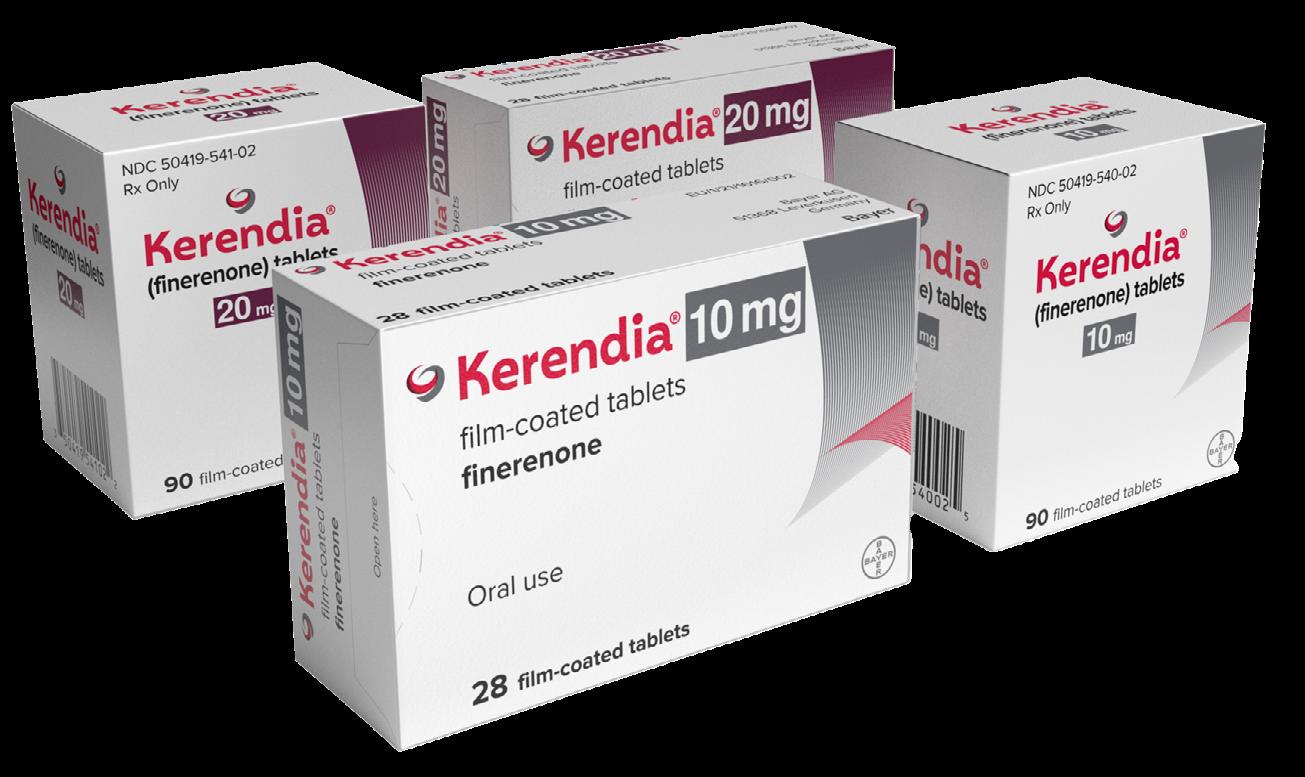

Looking ahead, major pharmaceutical companies are focusing on developing treatment solutions that offer multi-organ protection to patients. This integrated approach aims to address the complex interplay between various organ systems affected by CKD, ultimately
leading to better outcomes for patients.
A STEADY PATH OF PROGRESS IN ADVANCING NEPHROLOGY IN AFRICA
Nephrology, the branch of medicine focused on kidney health, has experienced slow but significant progress in Africa. Efforts are being made by governments and healthcare entities to address the growing demand for specialized care and improve outcomes for patients with chronic kidney disease (CKD). Key initiatives include the establishment of public health infrastructure, provision of medical equipment to dialysis centers, and training programs for healthcare professionals in nephrology.
The Global Kidney Health Atlas 2019 reveals that kidney transplantation is available in several African countries, including North Africa, South Africa, Namibia, Kenya, Tanzania, Ethiopia, Mauritius, Seychelles, Nigeria, Ghana, and Cote D'Ivoire. These transplantation programs offer hope and improved treatment options for patients in need.
Notably, Kenya is making significant strides in kidney disease management. The construction of the East Africa Kidney Institute (EAKI) is currently underway, promising to introduce cost-effective approaches to kidney disease management in the region. EAKI will act as a hub for organ and tissue donations, overseeing dialysis, renal replacement, and transplantation. Kenya has also established its first-ever tissues and transplant authority to ensure the ethical and safe use of human cells, tissues, and organs within the country.
Moreover, Kenya has taken significant steps to enhance kidney disease management and
HEALTHCAREMEA.COM MAY/JUN 2023 | HEALTHCARE MIDDLE EAST & AFRICA 67
ONE OF THE BREAKTHROUGH MEDICATIONS USED IN KIDNEY DISEASE MANAGEMENT
IN NUMBERS
50,000 NUMBER OF PATIENTS REQUIRING DIALYSIS OR KIDNEY TRANSPLAANTS IN NIGERIA ANNUALY
organ transplantation. Kenyatta National Hospital has established the Histocompatibility and Immunogenetics Laboratory, the first of its kind in East Africa, which facilitates organ matching for transplantation. Additionally, the hospital has established the Centre for Kidney Disease & Organ Transplantation under the 'Interlife' program, positioning itself as a regional center of excellence in kidney care.

The Africa Healthcare Network (AHN) has played a pivotal role in advancing renal health in Sub-Saharan Africa. As the largest dialysis chain in the region, AHN offers high-quality dialysis services at an affordable cost. AHN's dialysis centers in Rwanda, Tanzania, Kenya, and Ghana have contributed to the development of a comprehensive registry for chronic kidney disease patients in East Africa. Furthermore, AHN has implemented educational awareness campaigns and improved patient access to quality dialysis treatments.
In West Africa, Liberia celebrated a significant milestone with the inauguration of its first national dialysis center, the EJS Dialysis Center, in 2022. This center has alleviated the financial and logistical burdens faced by Liberians who previously had to travel abroad for dialysis services. Mauritius has also made notable progress in renal care by establishing a Hemodialysis Unit at the New Souillac Hospital, with plans for a Renal Transplant Unit and additional Hemodialysis Unit at the Jawaharlal Nehru Hospital in Rose Belle.
Government officials across Africa are actively engaging in partnerships with multinational pharmaceutical companies, as well as national and regional nephrology societies, to ensure patient access to affordable and highquality medications and therapies. Collaborative efforts with organizations such as the South African Renal Society, the Egyptian Society of Nephrology and Transplantation, and the African Association of Nephrology reflect a commitment to enhancing patient care and expanding treatment options.
Although progress in nephrology in Africa has been gradual, the collective efforts of governments, healthcare institutions, and partnerships with international organizations and societies are paving the way for improved kidney disease management. As these initiatives continue to unfold, Africa's nephrology landscape holds promise for better outcomes and enhanced quality of life for individuals affected by CKD.
ADVANCING TREATMENT APPROACHES IN CKD
To improve outcomes for patients with chronic kidney disease (CKD), there are ongoing multinational randomized clinical trials aimed at evaluating the effectiveness of specific drugs in slowing down CKD progression and reducing the risk of cardiovascular mortality. These trials seek to develop innovative treatment approaches that can effectively address CKD and decrease the chances of kidney failure in vulnerable patients.
68 HEALTHCAREMEA.COM MAY/JUN 2023 | HEALTHCARE MIDDLE EAST & AFRICA
KENYATTA
OFFICIAL LAUNCH OF THE HISTOCOMPATIBILITY AND IMMUNOGENETICS LAB AT KENYATTA NATIONAL HOSPITAL
KENYA'S IMMEDIATE FORMER PRESIDENT
DURING THE
DISEASE
FOCUS: Chronic Kidney Disease
One notable study is the DISCOVER CKD trial, sponsored by AstraZeneca. It is an international observational cohort study that includes both prospective and retrospective patient cohorts. The objective of this study is to assess early treatment experiences, treatment patterns, treatment effectiveness, patient outcomes, and quality of life by comprehensively collecting prospective and retrospective data from CKD patients.
Another significant trial, called EMPA-KIDNEY and led by Boehringer Ingelheim and Eli Lilly and Company, is a multinational randomized, double-blind, placebo-controlled clinical trial. It specifically focuses on evaluating the impact of empagliflozin on the progression of kidney disease and the risk of cardiovascular mortality. This trial stands out as the first to involve an SGLT2 inhibitor in CKD research, demonstrating significant kidney and cardiovascular benefits for adults with CKD.
In South Africa, efforts are underway to explore the potential of medicinal plants in the treatment of CKD. Researchers are studying ten plant species from nine botanical families that are commonly used in traditional medicine for CKD and other kidney-related diseases. These initiatives highlight the importance of introducing innovative medications, promoting health screening, and improving the standard of care for CKD patients throughout African countries.
These ongoing clinical trials and developments in medication underscore the urgent need for coordinated action to introduce innovative treatments, advocate for health screening, and enhance the standard of care for individuals living with CKD in African nations. By fostering collaboration between pharmaceutical companies, research institutions, and healthcare providers, there is hope for improved management and outcomes for CKD patients across the continent.
Global pharmaceutical companies are making significant investments in research and development (R&D) to advance the development of high-quality medicines and therapies for chronic kidney disease (CKD). According to a recent study by GlobalData, leading companies in the CKD pipeline drugs market include AstraZeneca Plc, Bayer AG, Novo Nordisk AS, Algernon Pharmaceuticals Inc., and Angion Biomedica Corp.
The integration of artificial intelligence (AI) is revolutionizing the field of nephrology and improving the lives of individuals affected by chronic kidney disease. Robot-assisted nephrectomy surgeries, powered by AI, offer several benefits. These advanced procedures allow doctors to perform surgeries with greater precision and efficiency, resulting in shorter hospital stays and faster recovery times for patients. The use of robotic-assisted surgery also leads to reduced post-operative pain and eliminates the need for special wound hygiene measures due to smaller incisions. For example, Burjeel Medical City in Mohamed Bin Zayed City has recently introduced kidney transplantations using the latest 3D laparoscopic technology, a minimally invasive method that has transformed the field of nephrology.
In addition to surgical advancements, experts are exploring
emerging technologies to treat chronic kidney diseases. One approach involves using the patient's own cells to restore organ function, leveraging regenerative medicine techniques. Furthermore, medical device companies are focusing on bringing AI-based tools and genomic precision medicine tests to emerging markets. These innovations promote early detection of CKD and provide personalized treatment options based on an individual's genetic profile.
ADVANCEMENTS IN KIDNEY DISEASE INITIATIVES AND TRANSPLANTATION EFFORTS
Campaigns and initiatives worldwide play a vital role in raising awareness about kidney disease and promoting positive healthseeking behaviors. At the same time, partnerships between government entities and strategic partners emphasize the significance of organ and tissue donation and transplantation. Additionally, advancements in peritoneal dialysis therapy and post-transplant care are improving treatment options and outcomes for patients.
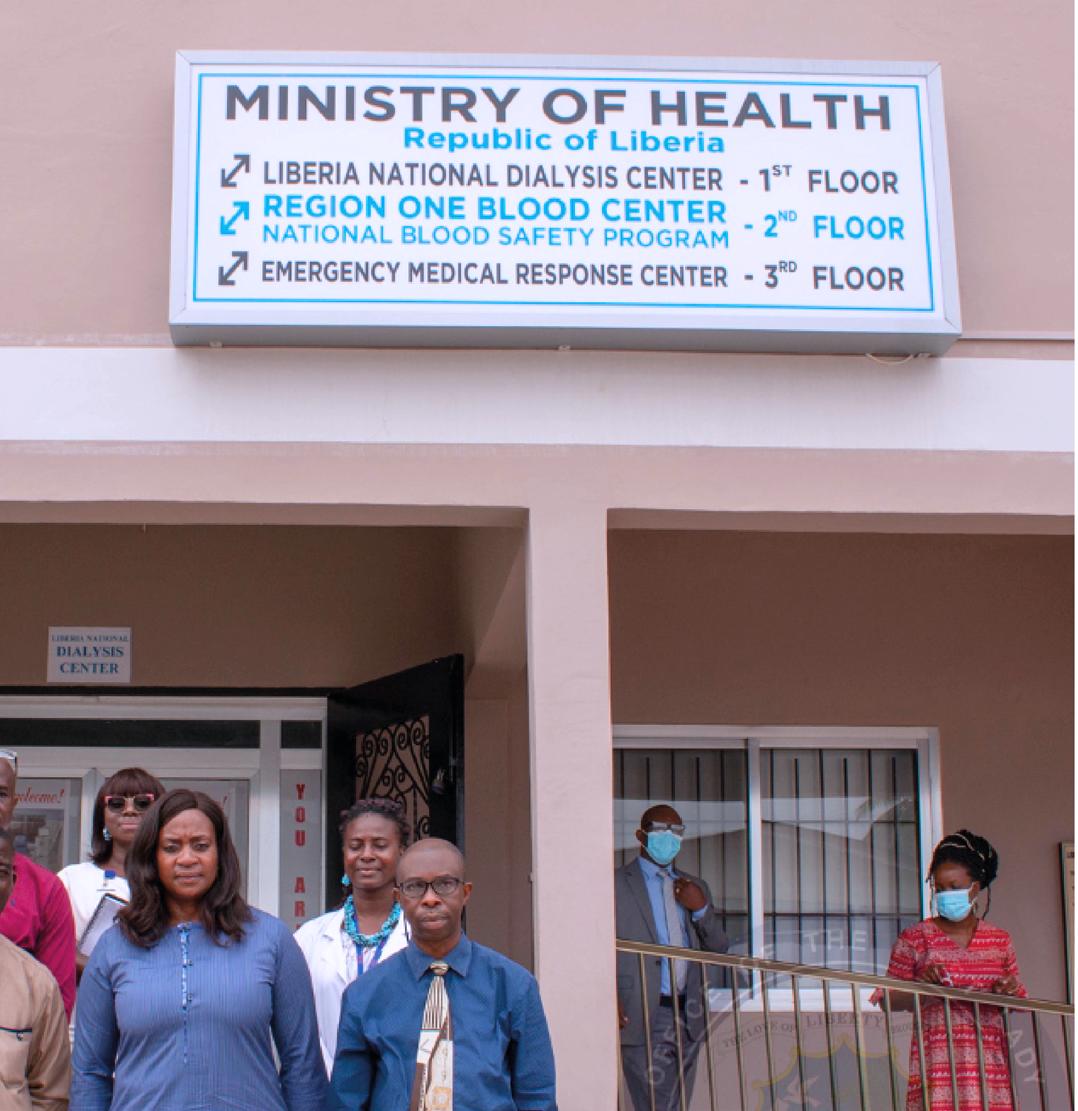
Starting with kidney disease awareness campaigns, the Iya Project Kidney Disease Awareness Campaign (2011) encourages positive health-seeking behaviors among

individuals at risk of chronic kidney disease. Similarly, the Nephropathy Early Detection initiative, part of the 100 Million Healthy Lives campaign, focuses on identifying chronic nephropathy in vulnerable groups in Egypt. Under a national campaign, the Ministry of Health and Population in Egypt has screened approximately 6.5 million citizens for kidney disease since September 2021.
When individuals reach end-stage kidney disease, they require kidney replacement treatments such as regular
HEALTHCAREMEA.COM MAY/JUN 2023 | HEALTHCARE MIDDLE EAST & AFRICA 69
LIBERIA'S FIRST LADYCLAR MARIE DUNCAN WEAH ALONGSIDE OTHER OFFICIALS DURING THE LAUNCH OF THE COUNYTRY'S NATIONAL DIALYSIS CENTER
dialysis or kidney transplantation. Kidney transplantation is the primary treatment option for those with renal failure. The global prevalence of CKD is estimated to be approximately 15.1%, with an estimated 4.9 to 7.1 million patients requiring renal replacement therapy due to end-stage kidney disease.
Advancements in transplantation efforts are also noteworthy. The United Arab Emirates' National Program for Donation and Transplantation of Human Organs and Tissue, known as "Hayat," highlights the importance of organ and tissue donation. Moreover, King Faisal Hospital in Rwanda is equipped with advanced technology and multidisciplinary teams, expanding access to transplantation services by offering kidney transplants.
To promote kidney donation and transplantation, governments are encouraging community members to register as kidney donors. Rwanda aims to provide both living-related and deceased donor transplant options for end-stage renal disease patients. Multidisciplinary transplant teams conduct complex surgical procedures, providing comprehensive care and instilling hope in patients and their families.
Peritoneal dialysis (PD) therapy offers a favorable option for at-home dialysis, reducing infection risks and enabling independent management with proper training. As predicted by GlobalData, there is a growing demand for home care solutions, including wearable and portable dialysis systems, which offer advantages over in-clinic hemodialysis treatment.
Post-transplant care and support are crucial for the wellbeing of recovering dialysis patients. Support groups in end-to-end renal facilities bring patients together, fostering motivation and minimizing challenges related to physical mobility, self-care, and daily activities. Emerging technologies enable doctors to monitor key blood biomarkers, ensuring that post-renal transplant patients maintain excellent renal function and overall well-being.
Policy and equity in kidney care are gaining prominence.
Policymakers worldwide are working to transform national laws on organ donation and transplantation, aiming to improve access to nephrology care for all without financial hardships. The recognition of kidney transplantation as a significant milestone in kidney care underscores the importance of equitable access to treatment and support.
THE PROSPECTS FOR MANAGING CHRONIC KIDNEY DISEASE IN AFRICA
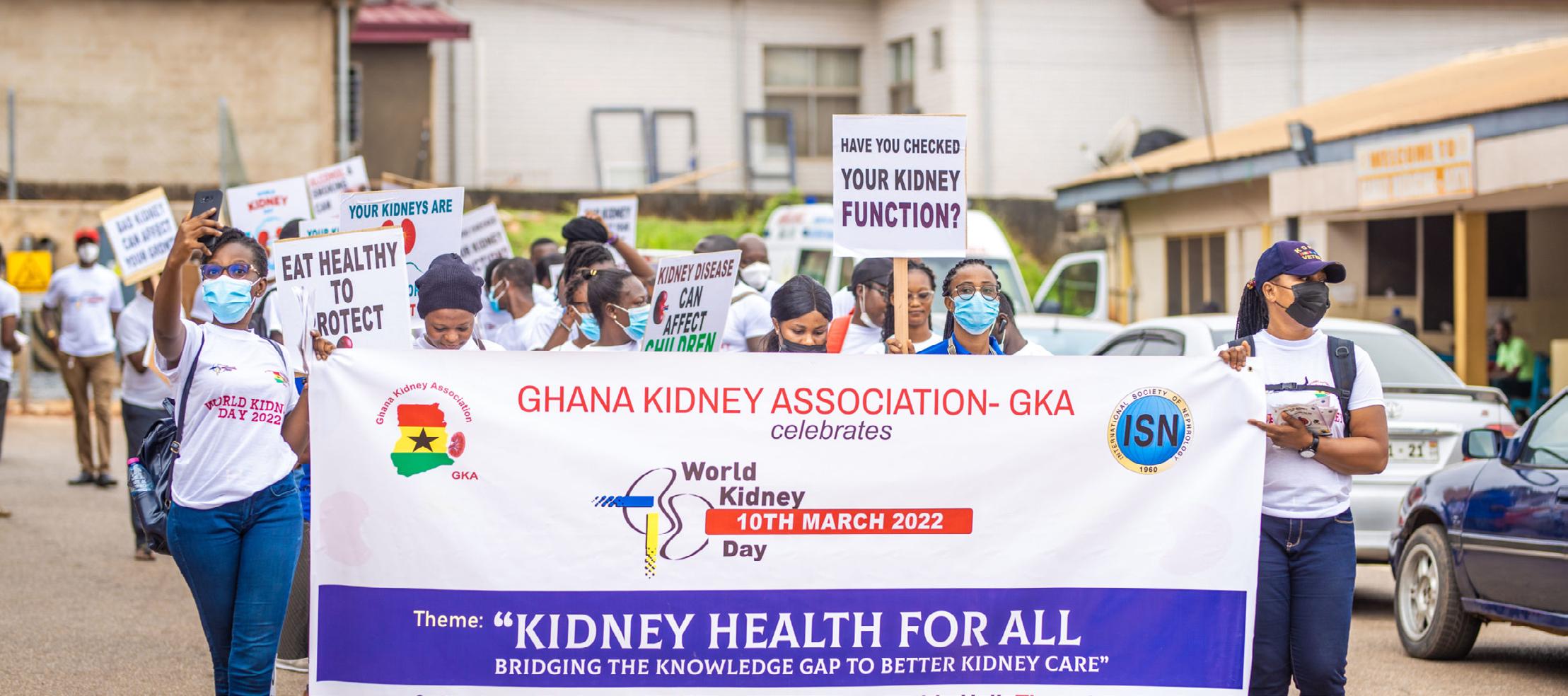
The global burden of chronic kidney disease looms large, projected to become the fifth leading cause of premature death by 2040. With millions succumbing to this disease annually and countless lives disrupted by dialysis, urgent action is needed. However, the risk of death from kidney surgery is low, and living with one kidney does not affect life expectancy. A multidisciplinary approach to managing related conditions can alleviate this burden on individuals and society, particularly in terms of catastrophic health expenditures.
In Africa, addressing the diverse needs of kidney patients is crucial as countries strive to achieve Sustainable Development Goal targets. The Africa Renal Registry, established in 2015, provides valuable data for developing effective strategies. Governments must allocate funds to establish specialized centers, reduce waiting lists, and equip dialysis centers with advanced treatments and technology. Offering transplantation options and attracting medical tourists will further enhance kidney care services.
Stricter laws against organ trafficking are necessary, facilitating the establishment of transplant services. Community education and state-supported screening programs raise awareness, promote healthy lifestyles, and combat kidney disease. Early detection through communitybased initiatives can delay the need for dialysis. However, the scarcity of nephrologists in Africa necessitates urgent training and retraining of healthcare workers in the field
70 HEALTHCAREMEA.COM MAY/JUN 2023 | HEALTHCARE MIDDLE EAST & AFRICA
DISEASE
FOCUS: Chronic Kidney Disease
FDA gives green light to Medtronic’s insulin pump with meal detection tech
testing. This breakthrough technology aims to improve the management of type 1 diabetes, easing the burden associated with daily insulin management.
Type 1 diabetes affects millions worldwide, with approximately 1.6 million individuals in the U.S. alone. Effective insulin level management is crucial to prevent severe health complications. The MiniMed 780G insulin pump offers greater control over insulin management, automatically adjusting and correcting glucose levels every five minutes to reduce the risk of hypoglycemia.
challenge for individuals with type 1 diabetes, providing automatic, real-time insulin corrections during mealtimes.
The FDA approval marks a significant milestone in type 1 diabetes management, as the MiniMed 780G system has the potential to improve patients' quality of life by simplifying daily insulin management and offering greater control over the condition.
USA — Medtronic has received FDA approval for its MiniMed 780G system, a new insulin pump with meal detection technology, designed for patients aged seven and older with type 1 diabetes.

The device incorporates the Guardian 4 sensor, eliminating the need for finger pricks while in SmartGuard mode, and allowing continuous glucose monitoring for insulin adjustment without invasive
Clinical data has demonstrated positive results, with the device achieving a time in the desired glucose range of 78.8% while minimizing hypoglycemia. The system includes an infusion set that can be worn for an extended period, up to seven days longer than usual.
The MiniMed 780G system provides patients with a lower glucose target setting, as low as 100 mg/dL, offering enhanced control over insulin management. The meal detection technology addresses a significant
Metropolis Healthcare introduces its novel stem cell transplant match testing tool
INDIA — Metropolis Healthcare has introduced its NextGen HLA Typing Test, a novel diagnostic testing method that utilizes Next Generation Sequencing (NGS) technology to determine the suitability of a donor for Hematopoietic Stem Cell Transplant (HSCT) and solid organ transplantation.
The test provides accurate characterization of alleles, making it one of the most advanced and reliable tests available for HLA typing. By analyzing the Human Leukocyte Antigen (HLA) genes inherited from
parents, the test helps identify suitable donors for bone marrow, cord blood, or organ transplants. The high-resolution molecular test assists physicians in making better decisions for patients with hematological malignancies and enables predictions of immune responses to diseases and disorders.
The HLA genes encode proteins on the surface of cells that play a crucial role in the immune system's response to foreign substances. The NextGen HLA Typing Test reduces the risk of immune complications, improves transplant
success rates, and enhances the survival rates of patients undergoing HSCT.
This development strengthens Metropolis Healthcare's position as a center of excellence for transplantrelated diagnostic services. In addition to this test, Metropolis Healthcare recently launched a next-generation sequencing platform that rapidly identifies drug resistance in tuberculosis (TB) patients and provides data on genotypic resistance to various TB antibiotics.

HEALTHCAREMEA.COM MAY/JUN 2023 | HEALTHCARE MIDDLE EAST & AFRICA 71 MEDICAL DEVICES & INNOVATIONS
THE MINIMED 780G INSULIN PUMP OFFERS GREATER CONTROL OVER INSULIN MANAGEMENT, AUTOMATICALLY ADJUSTING AND CORRECTING GLUCOSE LEVELS
Philips expands its Zenition Mobile C-arm Series with the launch of C-arm System 1000
GE HealthCare’s innovative CARESCAPE Canvas platform receives FDA approval
USA — GE HealthCare has received FDA approval for its CARESCAPE Canvas patient monitoring platform. This flexible and scalable solution is equipped with smart parameter technology, allowing it to be used for patients at all levels of acuity.
time.
NETHERLANDS — Dutch health technology company Philips has introduced the Philips Image Guided Therapy Mobile C-arm System 1000, known as Zenition 10, as the latest addition to its Zenition mobile C-arm series.
This system aims to increase patient access to routine surgical care and minimally invasive procedures. Built on Philips' flat panel detector technology, Zenition 10 offers high image quality at a cost-effective price, enabling surgeons to treat more patients with enhanced outcomes while reducing costs. Its versatility allows for applications in various surgical areas, such as orthopedics and trauma.

The Zenition 10 provides high C-arm maneuverability, applicationspecific protocols, and customized user profiles to optimize patient outcomes. It features user-friendly and intuitive operation, supporting a fast learning curve for operating staff. The system offers customizable presets and unique user profiles that adapt to individual preferences upon sign-in. Additionally, it includes an uninterruptible power supply for convenient system movement without the need for rebooting.
To enhance image quality and dose efficiency, Zenition 10 incorporates Philips BodySmart software, which automatically adjusts the measuring field to the area of interest, improving dose efficiency.
The platform offers a unified approach to patient monitoring, with the ability to tailor monitoring capabilities based on individual patient needs. It utilizes micromodules and medical USB technology for easy scaling up or down of monitoring capabilities. The CARESCAPE Canvas platform enables rapid redeployment of monitoring devices across the hospital enterprise, ensuring patients receive appropriate care from the right clinician at the right
The platform is compatible with current and previous versions in the ecosystem, allowing healthcare systems to upgrade their patient monitoring capabilities gradually. It is designed with sustainability in mind, using 25% less energy and featuring reduced packaging volume and weight compared to earlier versions.
GE HealthCare manufactures the CARESCAPE Canvas monitors using 100% renewable wind electricity at its Helsinki site. With FDA approval, GE HealthCare can now introduce this innovative monitoring platform to the US market, offering healthcare providers a flexible and sustainable solution for patient monitoring.
INOXCVA develops the first India-made MRI technology to reduce scan time
INDIA — INOXCVA, a leading cryogenic manufacturing company, has launched the first made-in-India zero-boil-off 4K helium cryostat used in a wholebody 1.5T Superconducting Magnetic Resonance Imaging (MRI) magnet system.
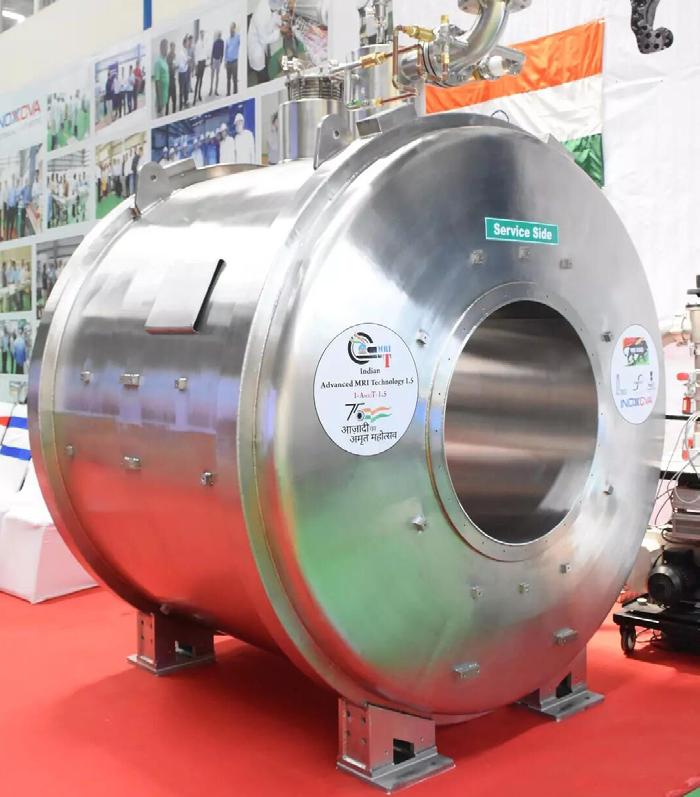
The cryostat was fabricated at INOXCVA's state-of-the-art facility in Vadodara, Gujarat, following an investment of Rs 200 crores (approximately US$24.4 million) to set up India's largest cryogenic manufacturing facility. This milestone positions India as the sixth country in the world to manufacture MRI magnet systems and demonstrates INOXCVA's commitment to revolutionizing the healthcare sector with cutting-edge solutions.
The cryostat, named I-Amrit 1.5, was indigenously designed by a team of scientists and engineers led by Dr. Soumen Kar from the Inter-University Accelerator Centre (IUAC). The project received funding from the Ministry of
Electronics and Information Technology and aims to enhance access to affordable MRI tests by reducing scan times, procedure durations, and operating costs.
The launch of this advanced MRI technology contributes to India's goal of providing affordable healthcare to a wider population.
72 HEALTHCAREMEA.COM MAY/JUN 2023 | HEALTHCARE MIDDLE EAST & AFRICA MEDICAL DEVICES &
INNOVATIONS







• Financial services • Insurance services • Consultancy • Capacity building in financial services • FinTech software • InsurTech software and technologies WHAT’S ON SHOW? THE BIGGEST HEALTHCARE & PHARMA EXPO IN EASTERN AFRICA +254 725 343932 info@fwafrica.net A SPECIAL PAVILION AT www.africahealthexpo.com Visa Oshwal Centre, Nairobi, Kenya OCTOBER 5-7, 2023 Expo Africa Health Financing & Insurance
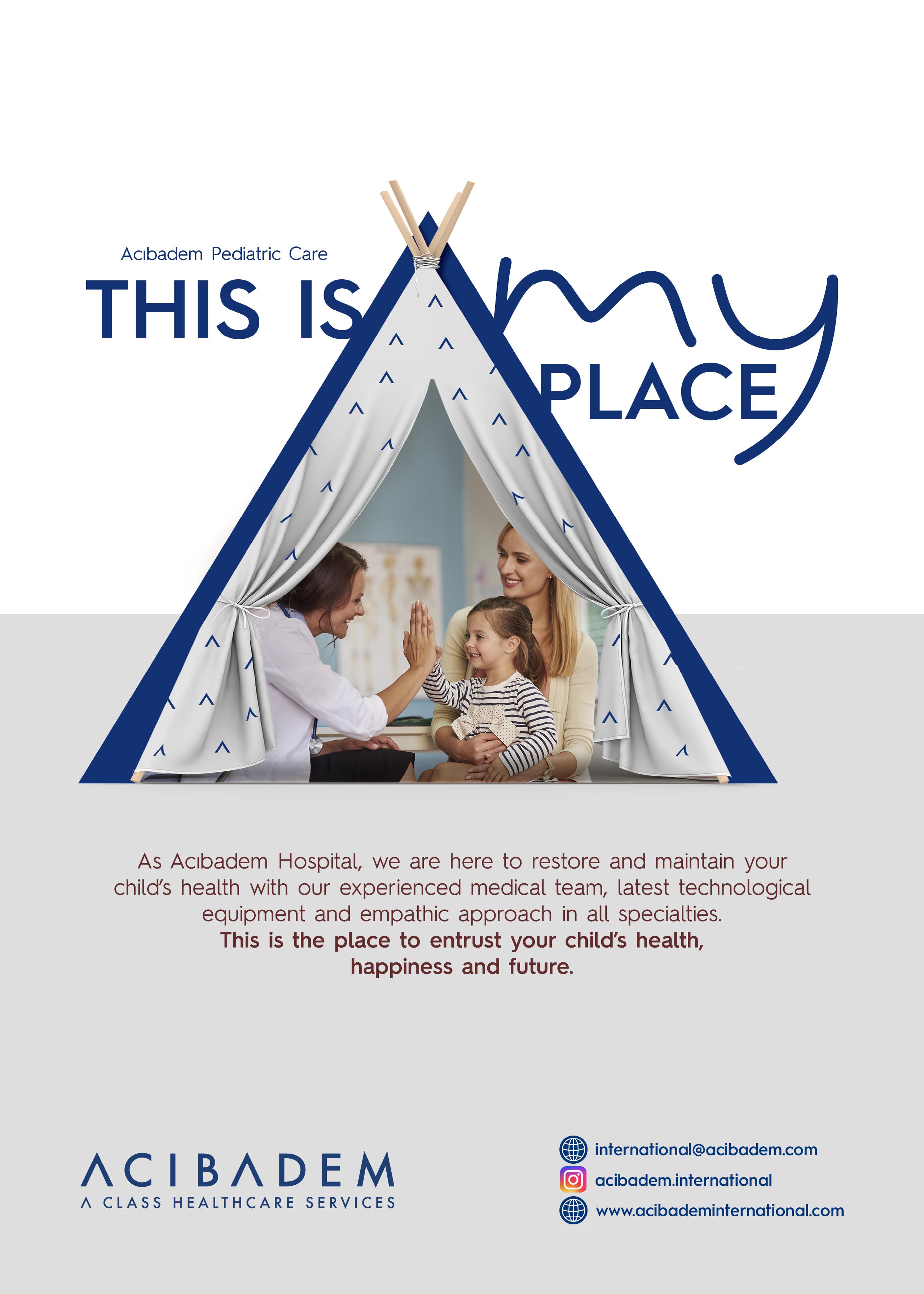











































































 By BENJAMIN OPUKO
By BENJAMIN OPUKO













 SAMUEL OKWUADA CEO, Remedial Health
SAMUEL OKWUADA CEO, Remedial Health















 DR. ANGELA MURIUKI Director, Women's Health - FIND
DR. ANGELA MURIUKI Director, Women's Health - FIND


 By PETER NGIGE
By PETER NGIGE






























































